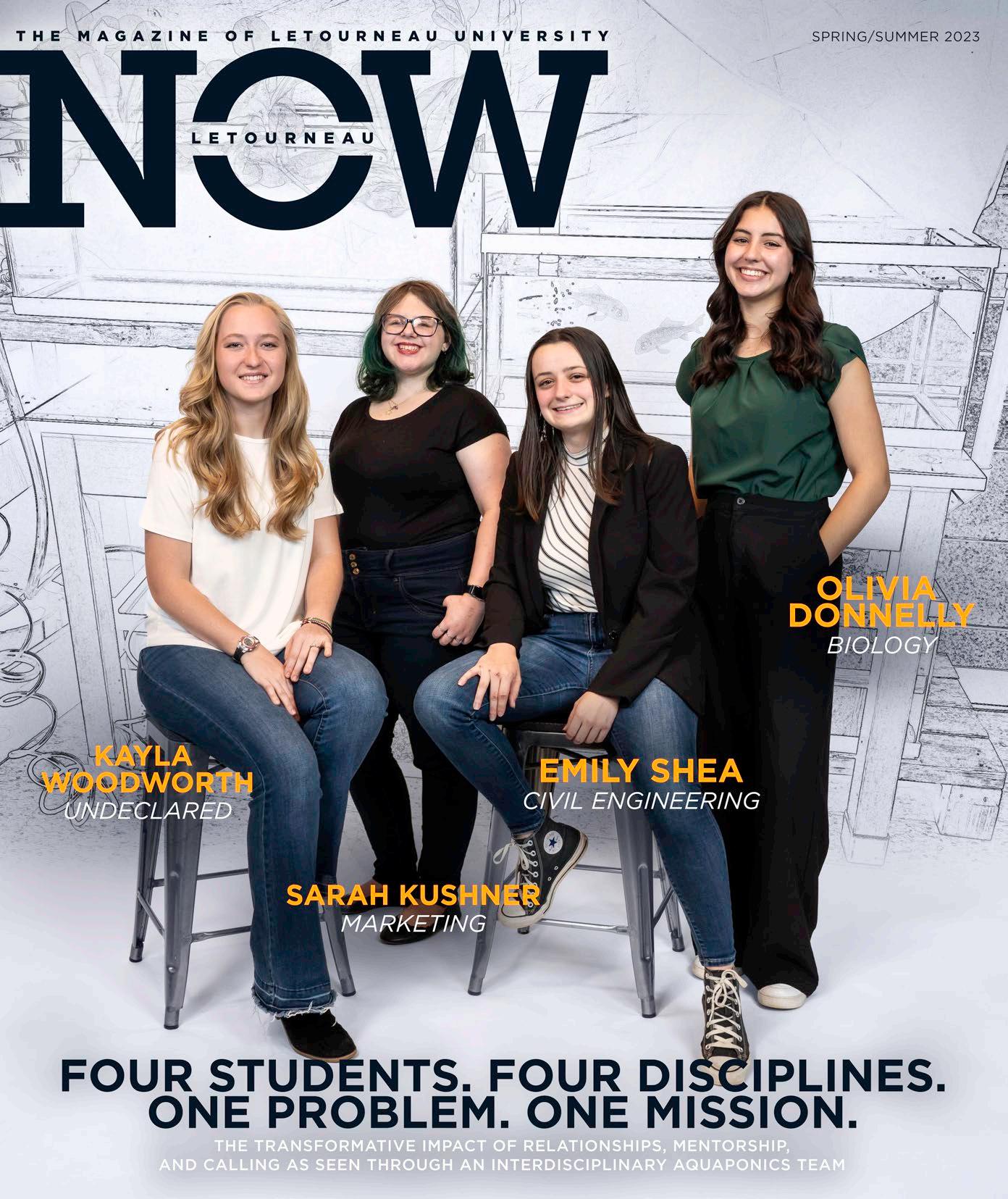
Generational Legacy
We had the distinct privilege of hosting Anne Graham Lotz—influential evangelist, author, and daughter of the late Billy and Ruth Graham—on campus in March. She joined us in chapel and for a LeTourneau Ladies Luncheon, hosted by First Lady Bonnie Mason, where she spoke fondly about her father’s historical connection with R.G. & Evelyn LeTourneau, as well as her passion for ministry, Christian higher education, and igniting faith in the next generation.
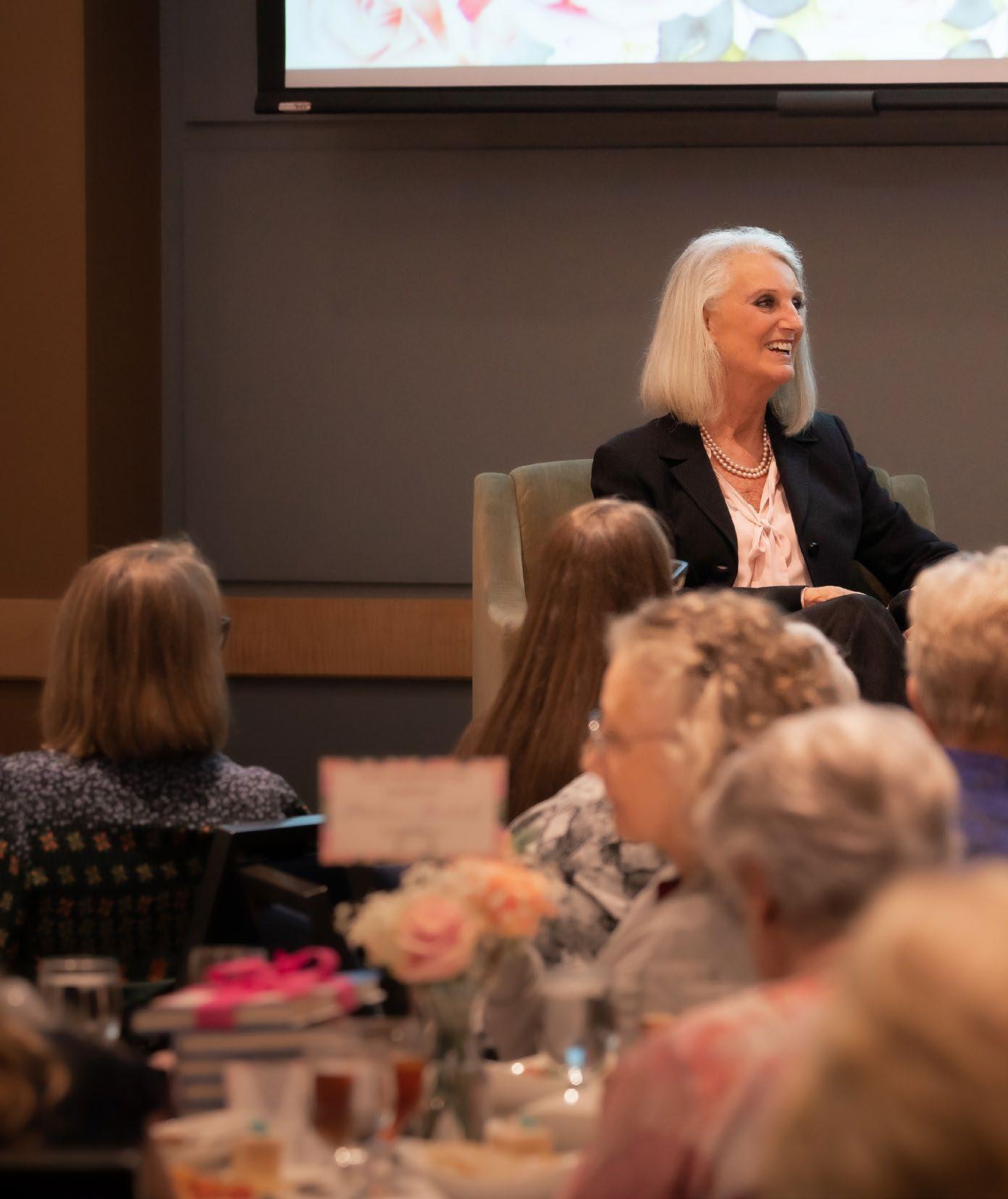
FULL FRAME 2 LETOURNEAU NOW
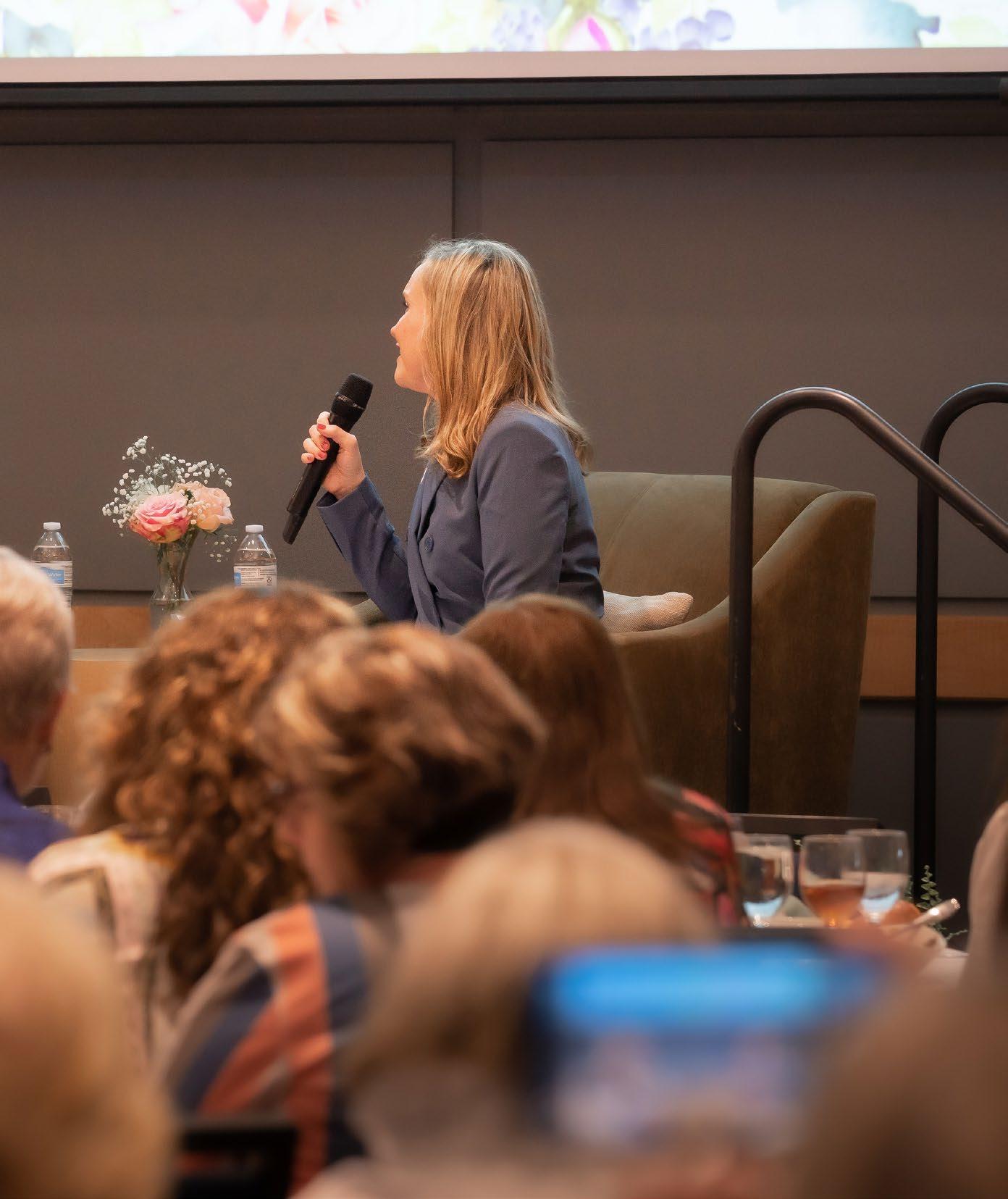
SPRING/SUMMER 2023 3
PHOTOGRAPHY BY GRANT BRIDGMAN
16
Four Students. Four Disciplines. One Problem. One Mission.
Learn how the interdisciplinary work of an aquaponics research team connects to global impact, relational belonging, and the practical applications of calling.
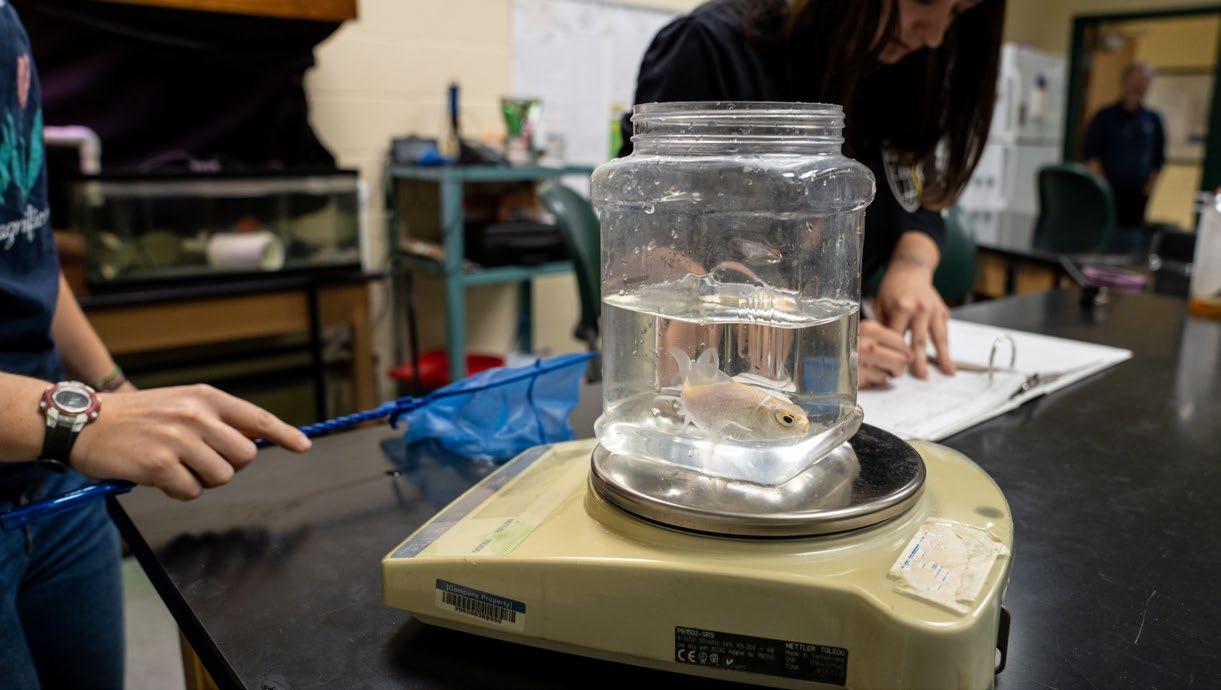
24
The Stewardship of Academic Ministry
Explore the intentionality of academic ministry at The Christian Polytechnic University: fresh perspectives from the Office of the Provost team.
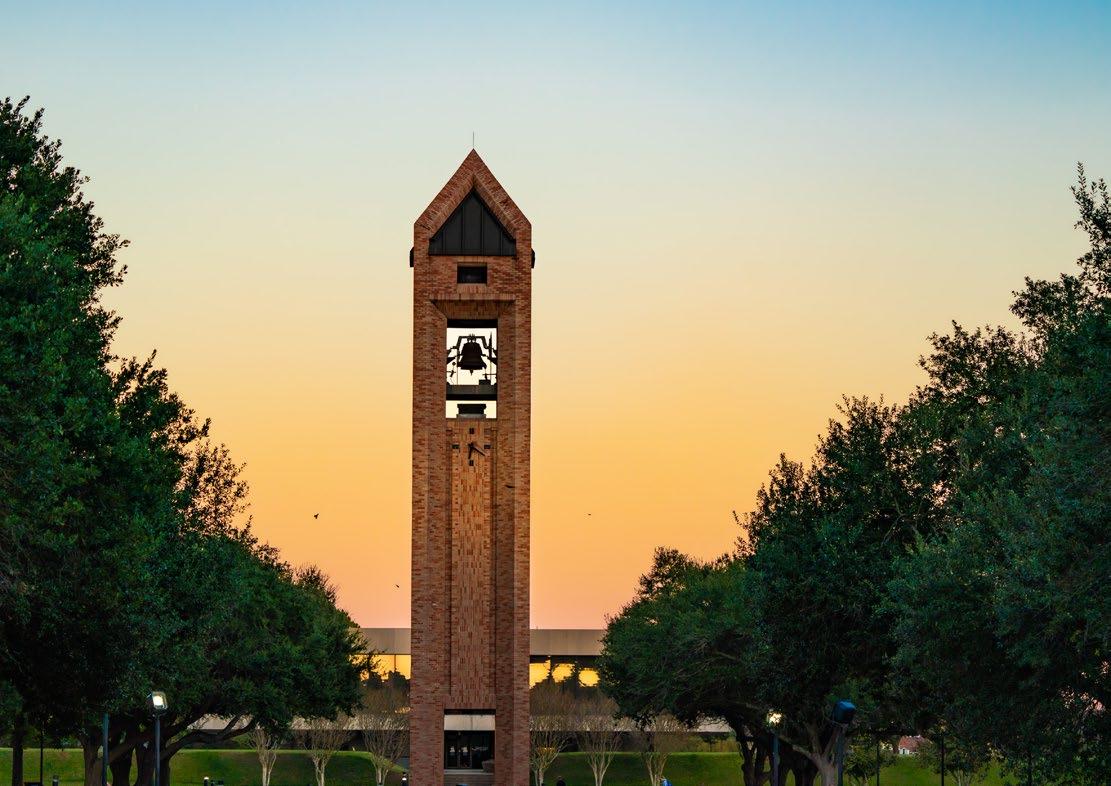
50
Individual Sport, Unified
Focus
The sports of indoor and outdoor track and field, both men’s and women’s, are recent additions to LeTourneau Athletics. Now a joint Track & Field/Cross Country program, these athletes are reaching new heights while the leadership creates a team culture.
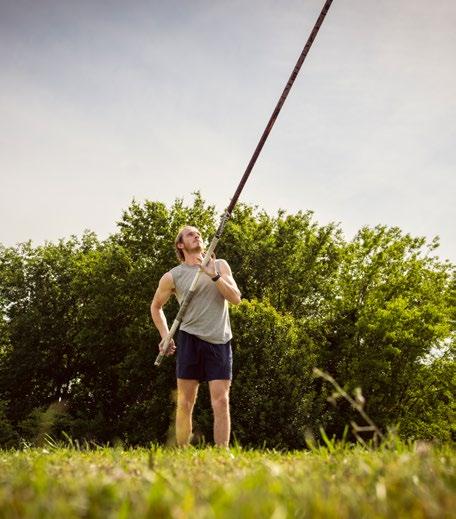
IN THE NOW
Do Justice. Love Mercy. Walk Humbly.
Connect With Us
@letourneauuniversity
facebook.com/myletu
youtube.com/letourneauuniversity
@letourneauuniv
linkedin.com/school/letourneau-university
"Behold, now is the acceptable time; behold, now is the day of our salvation"
- 2 Corinthians 6:2
CONTENTS
10
4 LETOURNEAU NOW
Jenelle A. Piepmeier, Ph.D. (’93), inspires our 2023 graduates with reflections on her own LETU experience, her work at the U.S. Naval Academy, and navigating life as an image bearer of God.
FEATURE STORIES 16 50
THE BUZZ
56
Athlete Perspectives
First-year track and field athletes reflect on their competitions and experiences.
70
Honoring 38 Years of Aviation Leadership
Fred Ritchey, inaugural Dean of the College of Aviation & Aeronautical Science, leaves a LeTourneau imprint unlike any other.
THE POLYTECHNIC WAY
33
A Ministry of Presence
Student Life is the go-to for fun activities and dorm life, but it is also home to a variety of academic support programs. Hear from various staff and student leaders engaged in these academic ministries.

44
New Academic Leadership
Welcome to the new deans: Dr. Michael McGinnis, Ph.D. (School of Engineering & Engineering Technology) and David Tesser, MCA (College of Aviation & Aeronautical Science).
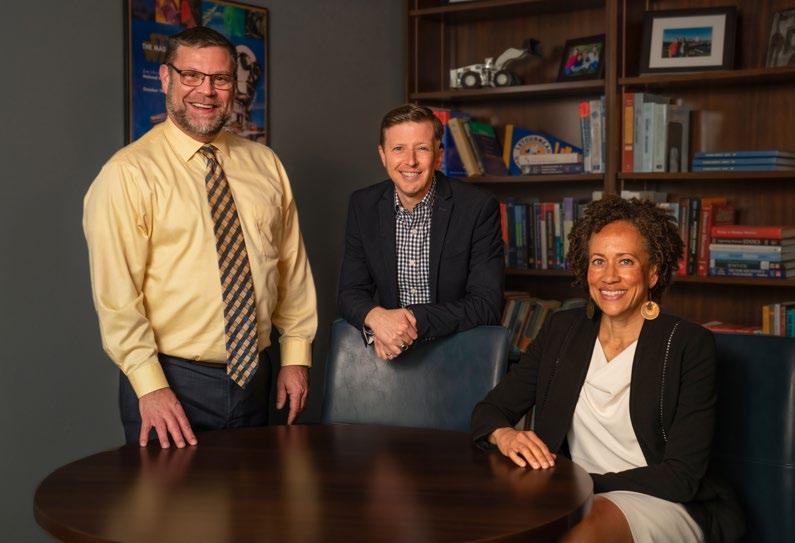
ALUMNI NEWS
66 Legacy of Engagement
Get to know Lara Rose (’91, CSMA), our new Director of Alumni Engagement, whose multi-generational LeTourneau story inspires ever-evolving connection and service.
72 Class Notes
Lasting connections & legacy—celebrate and honor classmates and fellow alums.
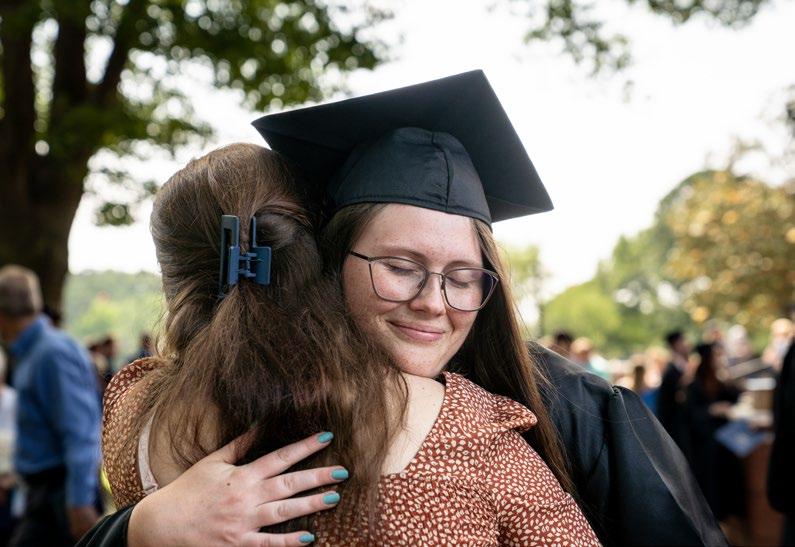
LETOURNEAU BUILT
46 Distinguished Seniors
Meet five graduating seniors who live out what we’re all about: exceptional academic achievement, sacrificial servant leadership, generosity, and spiritual growth.
60 Following the Call
Hear from two alums, Katie Leatherwood (’09) and Josh Wymore (’08), living out their unique vocational callings in specialized patient care and humble leadership.
24 33 13 SPRING/SUMMER 2023 5
PRESIDENT
Steven D. Mason, Ph. D.
BOARD OF TRUSTEES
Merle Stoltzfus, Board Chair
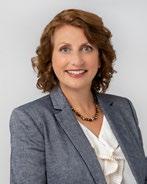
Patrick Bertsche, Vice Chair
Tom Burt, Secretary
James Schreder, Treasurer
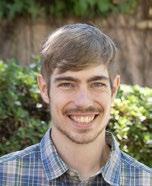
Phil Burks
Michele Charles
Dan DiFrancesco
Doug Douglas
Kimberly Fish
Curt Fitchett, Alumni Representative
Gene Frost, Ed.D.
Roger Kieffer
Loren Leman
Dale Lunsford, Ph.D.
Larry Mercer, D.Min.
Michael Moss
Nikita Mumphrey
James Nolt
Cy Oatridge
Rogers Pope, Jr.
John Ross, D.D.S.
Mike Schutt
John Solheim
Wayne Steege
Don Stephens
TRUSTEES EMERITI
Bud McGuire
NOW EDITORIAL CONTACT INFORMATION:
WEB: www.letu.edu
EMAIL: NOW@letu.edu
ADMISSIONS OFFICE
PHONE: 800-759-8811
ALUMNI OFFICE
PHONE: 800-259-5388
DEVELOPMENT OFFICE
PHONE: 800-259-LETU
LeTourneau University is the Christian Polytechnic University offering undergraduate and graduate degree programs across a wide range of disciplines online and at LETU’s 196-acre residential campus in Longview, Texas, located 120 miles east of Dallas and 60 miles west of Shreveport, Louisiana. Academic majors include aviation, business, communication, computer science, criminal justice, education, engineering, health care administration, human services, kinesiology, the liberal arts, nursing, psychology, the sciences and theology.
LeTourneau NOW is published by LeTourneau University, 2100 South Mobberly, Longview, Texas 75602. Sent free upon request to Editor, P.O. Box 8001, Longview, Texas 75607. Postmaster: Send address changes to LeTourneau NOW, P.O. Box 8001, Longview, Texas 75607. Email us at NOW@letu.edu.
Lara Rose ('91)
Lara graduated from LeTourneau University with a B.S. in Computer Science & Mathematics in 1991 and returned in 2020 as a full-time staff member. After three years in administrative support roles in the School of Engineering & Engineering Technology and the Office of the Provost, Lara now serves as the Director of Alumni Engagement. The YellowJacket love runs deep with this one: her mom was one of the first females to attend LeTourneau, her husband, Dan (’91, EE), is a fellow alum, and their five children have all participated in the student experience.
Josh
Brake, Ph.D. (’13)
Josh is an Assistant Professor of Engineering at Harvey Mudd College. He received his Ph.D. and M.S. in Electrical Engineering from the California Institute of Technology (Caltech) and his M.S. and B.S. in Engineering with an Electrical Concentration from LeTourneau University. His research experience is in the field of biophotonics, but he also enjoys working with students to hone their oral, written, and visual communication skills. When he's not in the lab or at his desk, you'll likely find him spending time with his wife and young family, outside running in the Southern California sunshine, blogging, or rooting for his favorite sports teams.
Stephanie Bell (’23)
Stephanie is a Civil Engineering major and recent spring graduate from Colorado Springs, CO. She plans to continue her education this fall by pursuing a Ph.D. in Civil Engineering with a concentration in Engineering Education at Oregon State University as she prepares for a possible future teaching career. On campus, Stephanie served as both a Supplemental Instructor (SI) for the Achievement Center and a Spiritual Life Assistant (SLA). In her free time, she enjoys hiking and exploring the outdoors.
Jenelle Piepmeier, Ph.D. (’93)
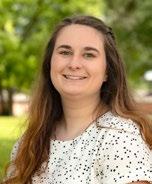
Dr. Jenelle Piepmeier serves as Professor and Chair of the Department of Weapons, Robotics, & Control Engineering at the United States Naval Academy in Annapolis, Maryland. She has a B.S. from LeTourneau University and a M.S. and Ph.D. from Georgia Institute of Technology, all in Mechanical Engineering. Dr. Piepmeier is a member of LeTourneau’s inaugural 2018 class of the Academy of Engineering and Engineering Technology.
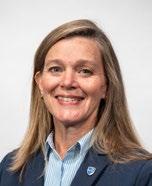
COPY EDITORS
EXECUTIVE EDITOR
Donald K. Egle
MANAGING EDITOR
Kate Day
CREATIVE DESIGNER / PHOTOGRAPHER
Sara Bryan
CONTENT TEAM
Grant Bridgman
Jake Hall
Nathan O’Day
Briahnna Williams
Mark Roedel
Rebekah Browning
Nathan O'Day
ADDITIONAL CONTRIBUTORS
Steve Conn, Ph.D.
Clarissa McNair
ADDITIONAL PHOTOGRAPHY CONTRIBUTORS
Grant Bridgman
Jake Hall
Liene Leonovica
PRINTING
Midway Printing Press
6 LETOURNEAU NOW
CONTRIBUTORS
Kristy Morgan, Ph.D.
Dr. Kristy Morgan serves as LeTourneau’s Vice President for Student Affairs. She received a B.A. in Youth Ministries from Colorado Christian University and an M.S. and Ph.D. from Kansas State University. She served in residence life, career services, and retention roles, and then as Dean of Students before moving into her current role. She serves on the president’s cabinet and oversees Student Life, which includes most of what happens outside of the classroom at LETU. Dr. Morgan believes that college changes lives and loves being able to work alongside and for students as they become more of the people God has called them to be.

Katie Leatherwood (’09)
Katie Leatherwood is a Certified Prosthetist and Orthotist with a passion to share the love of Jesus Christ with people affected by disability. After graduating from LeTourneau University with a degree in Kinesiology (Exercise Science), Katie went to graduate school to study Prosthetics and Orthotics and earned a Certification in Prosthetics and Orthotics (CPO). She began full-time work in the field of Prosthetics and Orthotics in 2009, before moving to Latvia in 2015. Her organization, Designed To Live, exists to inspire people whose lives have been affected by a disability and help them regain meaning and significance in their lives and be able to live beyond their disability.
Debbie McGinness ('16)
Debbie has served in the Achievement Center as LeTourneau’s Assistant Director for Academic Support since 2009, supervising the Math Lab, Tutoring, and Supplemental Instruction (SI) programs. This spring, she retired to a part-time role as Academic Support Specialist. She has a B.S. in biology and a secondary teaching certificate, both from Idaho State University, and a M.Ed. in curriculum and instruction from LeTourneau University. Prior to coming to LETU, Debbie taught primarily math and science at the junior high and high school level in both public and Christian private schools. Debbie finds it inspiring and encouraging to be a part of students’ time here, knowing they will take their gifts and desire to serve others out into the work force and their communities.
Briahnna Williams ('23)

Briahnna graduated from LeTourneau University in May 2023 with a B.S. in Interdisciplinary Studies, with a concentration in English. Originally from Fort Worth, she joined the LETU Office of Marketing and Communications as Associate Director of Content in January 2023. She loves continuing to be a part of the Christian atmosphere of her alma mater and appreciates the community she's gained. Outside of work, she enjoys leading worship, watching movies, writing, and tennis.
Kathleen Raske

Kathleen Raske is completing her fourth year as Director of the YellowJacket track and field/cross country (TF/XC) programs. Her extensive experience includes 29 years at the NCAA Division I level, coaching multiple NCAA All-American athletes, and even leading Team USA in various competitions. In her tenure at LETU, the TF/XC program has seen record-breaking success, including a conference championship for the men’s cross country team in 2021 and numerous individual conference champions. She is passionate about mentoring student athletes in a Christian setting and creating a unified team culture. Her pastimes include sailing, which she has practiced from Lake Michigan to Lake O’ the Pines, and spending time with her husband, current LeTourneau Track & Field Associate Head Coach, Terry VanLaningham.
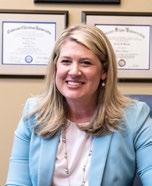
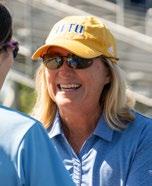
Josh Wymore, Ph.D. ('08)
Dr. Josh Wymore has a passion for helping people live and lead with purpose and clarity. As an executive coach, consultant, and trainer with WYMORE, Josh has helped nonprofit and Fortune 500 leaders all around the world become more of who they were made to be. Josh grew up on a Christian campground in the Texas countryside where the most common forms of entertainment were playing six-man football and chasing armadillos. Before becoming a management consultant, Josh spent a decade in higher education developing leaders as an administrator and adjunct professor. Along the way, he obtained his Ph.D. from The Pennsylvania State University. He and his family now proudly call Fort Wayne, IN, home.

SPRING/SUMMER 2023 7
FROM THE PRESIDENT
Greetings to our LeTourneau University family, We have officially transitioned into the summer season on our campus. Summer school, summer camps, and summer projects are in full swing, even as many of our students return to their hometowns, embark on travels, or begin internships that will end in job opportunities upon graduation. Just a few weeks ago, we recognized almost 400 graduates from all over the world. During our commencement ceremonies, we highlighted their many accomplishments and charged them to live in service to Jesus and to one another. One of our distinguished alumnae, Dr. Jenelle Piepmeier, delivered an inspirational address. You will enjoy reading more about her message to the graduating class in this edition of NOW Magazine.
The end of the academic year offers a moment to reflect on the many accomplishments of our students, faculty, and staff. Just this spring, students from our “Triple Frequency Reference Station” senior design team presented their research at the Institute for Electrical and Electronics Engineers (IEEE) Aerospace Electronic Systems meeting. Among 183 peer-reviewed papers from top research universities and industry leaders, theirs was the only paper authored by undergraduates. The lead author was our student body president, Matthew Strong, who will be going to Georgia Tech for his Ph.D. in the fall. Savannah Orton presented research from the LEVIS Senior Design team, which developed a device to measure respiratory rate non-invasively. She was awarded 1st place at the student poster competition of the IEEE Region 5, which includes 3,600 graduate and undergraduate members from universities across the American South and Southwest. Adriana Cisneros Emerson won the prestigious Center for Public Justice's Hatfield Prize. Olivia Donnelly was awarded a Harold Synder Fellowship from the Au Sable Institute. Brookly Haley won the Texas Clinical Teacher of the Year award given by the CSOTTE, which recognizes the best student teacher in the entire State of Texas! Our student athletes also found success in and out of the competitive arena, achieving LETU’s best seasons ever in softball, men’s soccer, and men and women’s golf. Two of our coaches earned conference coach of the year honors.
Our School of Business received full accreditation from the Accreditation Council for Business Schools and Programs, which is a new external affirmation of the quality of our curriculum and distinguished faculty. Our Nursing program experienced another graduating class with a 100% NCLEX pass rate, while the newly renovated School of Nursing building is nearing completion and will be ready for the fall.
God continues to call to LeTourneau gifted faculty and staff who are passionately aligned with our mission. In particular, we have made two key leadership appointments that will begin this summer. Dr. Michael McGinnis will
serve as our Dean of Engineering and Engineering Technology, and Mr. David Tesser as our Dean of Aviation and Aeronautical Science. Meanwhile, we have been blessed with unprecedented interest in LeTourneau University among prospective residential students and their families.
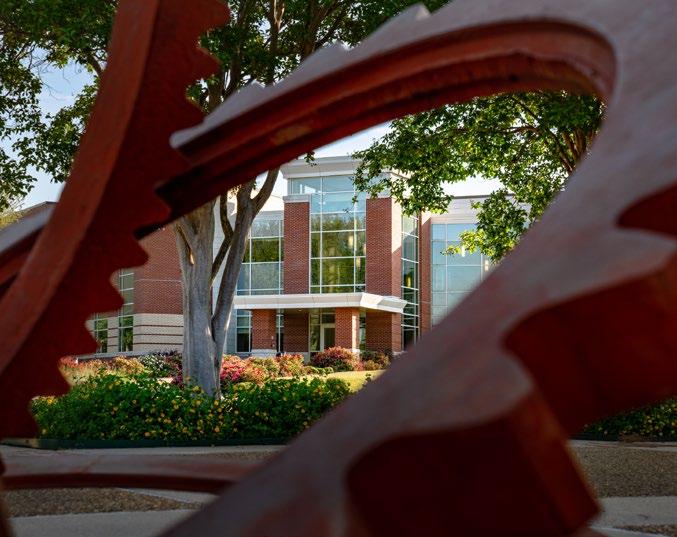
The end of an academic year is filled with mixed emotions as we bid farewell to one generation of students while eagerly awaiting a new incoming class to accompany the returners in the fall. For you and your loved ones, I pray that this summer season will be filled with renewal and reflection, success and mission. Please remember us in your prayers as we prepare to enter our third and final year of the university strategic plan, advance several key operational initiatives, and prepare for a new year of academic ministry that will be here in just a few months.
It is great to be in this work together!
Blessings,
 Steven D. Mason, Ph.D. PRESIDENT, LETOURNEAU UNIVERSITY
Steven D. Mason, Ph.D. PRESIDENT, LETOURNEAU UNIVERSITY
8 LETOURNEAU NOW
During the spring semester Engineering Open House weekend, Dr. Steve Mason and Bonnie Mason witness the Frontier Robotics Team testing out their 15-pound combat robot prototypes during the weekend’s first battle-bot competitions.
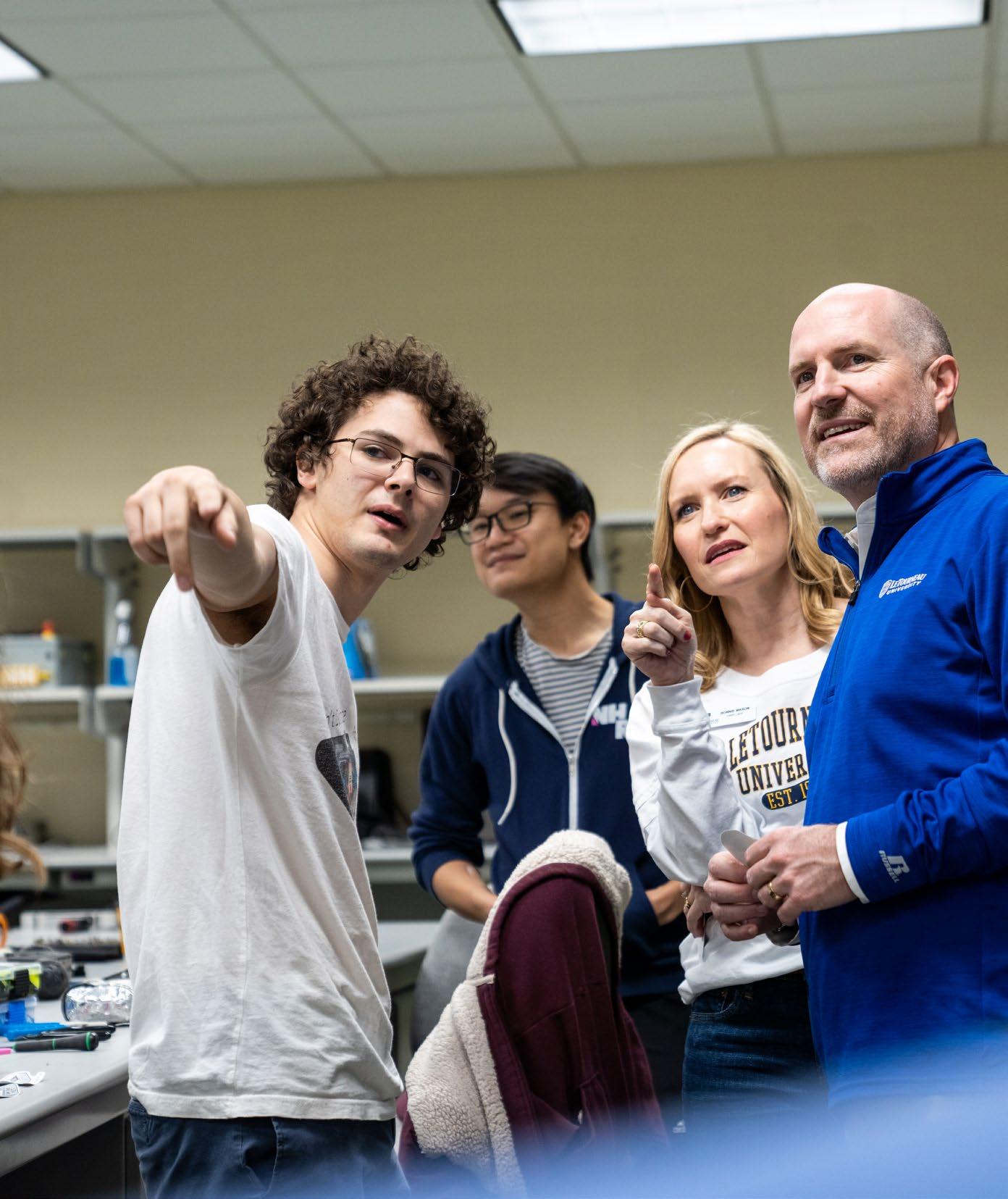 PHOTOGRAPHY BY SARA BRYAN
PHOTOGRAPHY BY SARA BRYAN
SPRING/SUMMER 2023 9
Do Justice. Love Mercy. Walk Humbly.
Thank you, graduates, for the privilege of celebrating with you today. I appreciate the invitation. It’s exciting to be back here 30 years after my own commencement on May 8, 1993.
I first stepped foot on campus as a third grader when my dad, Dr. Steve Armstrong, came to teach in a new emerging discipline, computer science. This campus has so many landmarks that are intertwined with my life. Harry Hardwick of Hardwick Hall married my parents. Anna Lee Allen (of the Allen Student Center) was my seventh grade social studies teacher. I was taught by both Betty and Richard Berry (for whom the Berry Auditorium was named).
Some of you may be wondering about my title, the Chair of the Department of Weapons, Robotics, and Control Engineering. I imagine Mrs. Albert, my third grade teacher, who is here today, did not expect little 8-yearold Jenelle to end up one day leading the Weapons department at the Naval Academy with a brass cannon in her office.
30 years ago, as I was graduating, I had just finished taking my first course on robotics from Dr. B. Kyun Lee.
Today, I lead a team of 28 Naval officers and civilian faculty. We teach courses on robotics and feedback control systems to about 225 students majoring in Robotics & Control Engineering every year. We have labs with manipulator arms and classes on autonomous
systems that work on the ground, in the water, and in the air. We also teach a course on Weapons Systems (radar, sonar, explosions) to about 1,100 students every year.
I am sure that my Swiss Mennonite great-grandparents would have been very surprised at where I have landed. You, too, are embarking on a life that may take you places you and your family cannot yet imagine.
When President Mason asked me to serve as commencement speaker, I knew that as a federal employee I had to get the speaking engagement and LeTourneau’s gift of travel approved by an ethics counselor at the staff judge advocate general. This was easily obtained. But one of the requirements in accepting this speaking engagement is to let you know that although I am a Department of the Navy employee, the opinions and assertions expressed in today’s speech are *my own* and do not necessarily reflect the official policy or position of the United States Government, the Department of Defense, or the Department of the Navy.
When you think of a spokesperson for the DoD or the Navy -what image did you have in mind? I am pretty sure you were not picturing me.
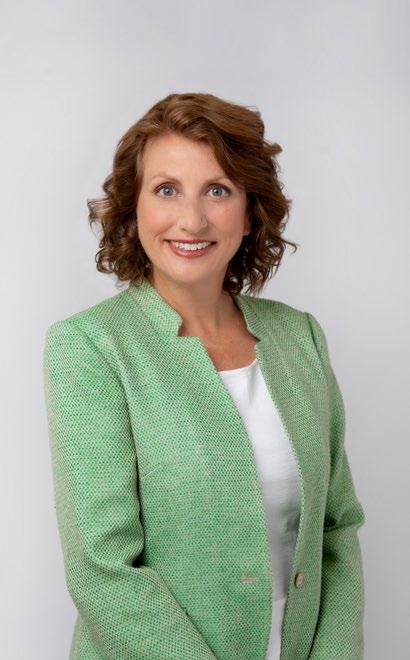
And Federal Government, I have to say, I can relate. Sometimes I want to send my kids out the door with a label that says “this child does not reflect my views.” For instance,
I think pajama pants should not be worn outside.
This is such a contrast with what we see in Genesis 1, where we’re told “God created human beings; he created them reflecting God’s nature.”
I may reflect the image of a Naval Academy professor. Or of a LeTourneau graduate. But the most important image I bear is the image of God. In fact, we all reflect his nature. We all bear his image. All of humanity. Not just those in the right group. Or the graduates of the right schools (although this one is pretty great!), or those that attend the right churches.
Take a look around. All of us—the faculty, the graduates, the proud families—you are all image-bearers of God. Everyone here in Longview, Texas. Everyone you meet and interact with in the year ahead in your new communities—all image-bearers.
And as you reflect back on the past few years here at LeTourneau, and you think about the skills and gifts you have discovered and practiced and cultivated, those are a reflection of God’s nature.
I have always loved math and science. And I knew when I read the LeTourneau course catalog back in 1989 that I wanted to study engineering. Now there weren’t a lot of people that looked like me in my classes, but
IN THE NOW
Jenelle A. Piepmeier, Ph.D. ('93)
10 LETOURNEAU NOW
Dr. Jenelle Piepmeier returns to LeTourneau University on the 30th anniversary of her own commencement in 1993, to share the May 2023 commencement address:
I knew, even then, that I was created to be an engineer and, as it turns out, I was made to study and eventually teach robotics! Do you know the first time I ever stepped foot in an engineering class taught by a woman? It was ES450 Introduction to Robotics at 8:55 one August morning in 1999, in Annapolis. I was stepping into my own classroom for the first time.

As you are moving into the roles that the LeTourneau faculty have worked so hard to prepare you for, your careers will all be different and may go in unexpected directions. We see that in the narratives in the Bible. There are so many ways in which the image bearers served their communities. They were tent-makers and wall builders. They worked in textiles and traded in real estate. They were judges and military leaders and executives. And those were just the women.
One of the challenging things about moving out into the world beyond the university is the lack of a syllabus. You know, the document the faculty gave you on the first day of class that said, "Here’s the plan. These are the assignments and these are the topics we’re covering. Here are the major due dates."
But there’s no syllabus in life. There aren’t even lab handouts. Quite often, you’re given a task or role, and it doesn’t come with step by step instructions. They don’t hand those out when you engage in new relationships at work. Or at the hospital when your kids are born. There’s no TA giving you a hint that “this colleague will need extra grace today” or “this kid will mostly eat chicken nuggets.”
So how does anyone know what to do?
How do we as Christians know what is the right way for us to work and engage in our communities and in our families?
There is a concept in the military known as the OODA Loop. OODA is an acronym for Observe, Orient, Decide, and Act. It is the idea of observing what’s going on around you, orienting yourself in the context of what is happening now and what you want to happen in the future, deciding what to do in light of your observations, training, and goals, and then acting. It’s called a loop because you need to keep doing it over and over. Military
units with faster loops can more quickly achieve their objective.
This is very similar to the feedback control loop that is used in autonomous systems. Autonomous systems have a desired behavior. For your HVAC system, that might be a desired temperature setting. For your vehicle operating in adaptive cruise control, that might be to maintain a desired speed while not hitting the car in front of you. For a drone, it might be to maintain a desired altitude. To do these things autonomously, the system needs a sensor—to observe. The controller—usually a small computer board— compares the desired behavior with the actual situation observed by the sensors and makes some decisions and sends commands to the actuator.
But the tricky part—the one that I alluded to earlier—is that sometimes, as we navigate through life, we’re a little uncertain about what the “desired behavior” for our system should be. What do I orient myself to? Where should I live? What job should I take? Who should I marry? How should I act at work?
How do I respond to my colleagues? What should I post on social media? How should I reply in the group chat? What is the best way to parent this child? And what is the best way to parent her brother?
And the answer is found in Micah 6:8:
“He has shown you, O mortal, what is good. And what does the LORD require of you? To act justly and to love mercy and to walk humbly with your God.”
How great is that? This simple admonition gives us our orientation; our desired behavior. Here’s what I’m looking for, He says. Do Justice. Love Mercy. Walk Humbly.
Jesus gives us an echo of this in Mark 12, where he says to first love the Lord our God with all our heart and, secondly, to love our neighbor as ourselves.
So, I would encourage you to have a regular OODA Loop rhythm in your life:
Observe: How are the image bearers around me doing?
Orient: Am I walking humbly, loving mercy, and acting justly as I interact with these
SPRING/SUMMER 2023 11
PIEPMEIER, ALONGSIDE HER ENGINEERING CAPSTONE PARTNER, JEAN BREWER ('93), WORKING ON THEIR SAE BAJA CAR.
image-bearers? Am I loving my neighbor as myself?
Decide: Am I being a worthy image bearer in my daily life? And how do I need to adjust my behavior so I can love my neighbor well?
Act: It’s like Micah 6:8 is the path that Google Maps is routing you on. And now it’s time for you to hit "Start" and embark on your journey. LeTourneau prepared me, not just for the job I have, but to be God's image bearer in my community. You should go forward with the knowledge that you, too, have been prepared and that the grace of God will go with you as you embark on your journey.
About Jenelle A. Piepmeier, Ph.D.
Dr. Jenelle Piepmeier earned a Bachelor of Science in Mechanical Engineering from LeTourneau University. She went on to earn a Master of Science and Ph.D. from Georgia Institute of Technology, also in Mechanical Engineering. For over 20 years she has taught robotics, computer vision, and control systems
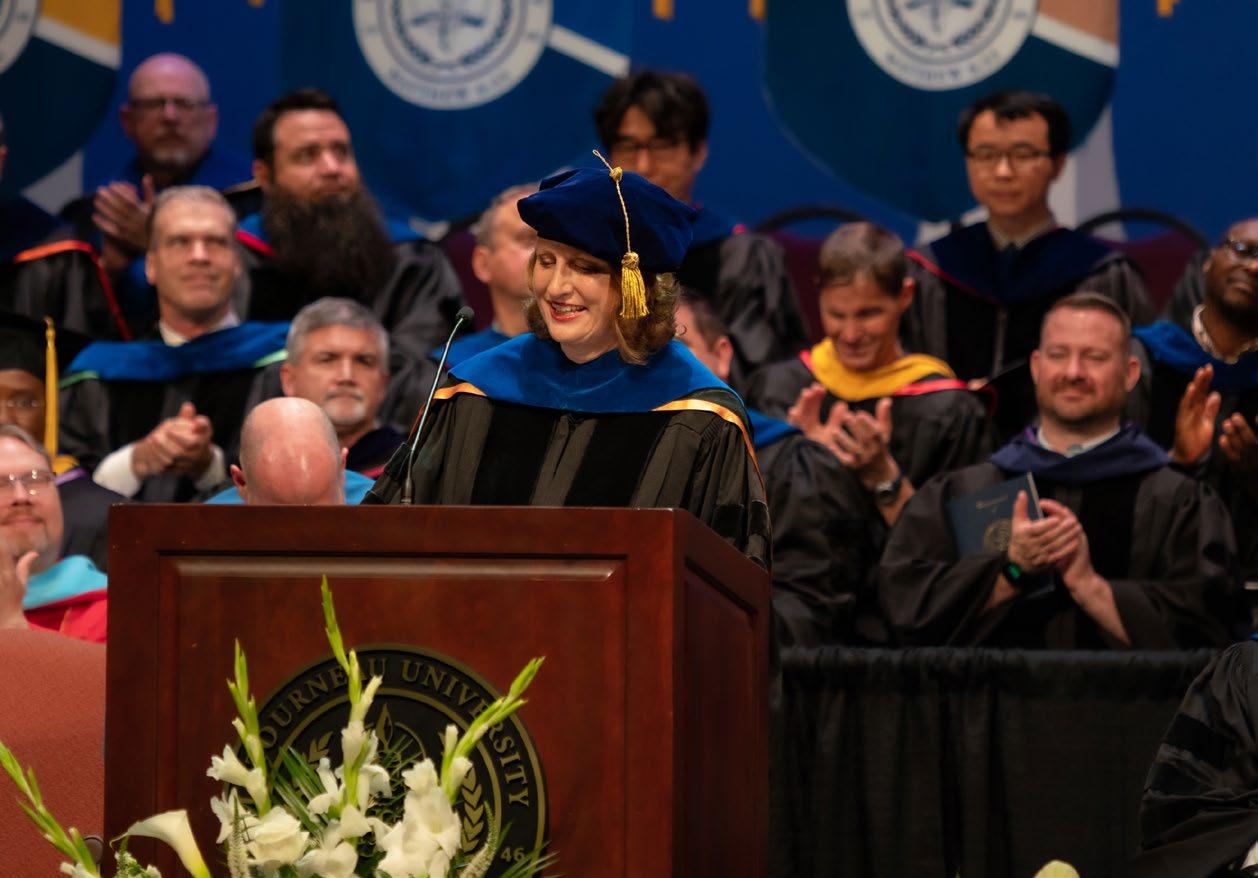
to the future leaders of the Navy and Marine Corps at the United States Naval Academy in Annapolis, Maryland. Her former students have gone on to serve in the Navy Seals, command Navy submarines, and develop novel robotic systems.
In the fall of 2020, she became the 66th department chair for what is now known as the Weapons, Robotics, and Control Engineering Department, overseeing an academic program designed to educate midshipmen about robotic manipulation, sensing, and control of autonomous systems on the ground, in the air, and on or below the water’s surface. The department’s history traces back to the Department of Ordinance and Gunnery when the United States Naval Academy was established in 1845; Dr. Piepmeier is the first woman to chair the department. Her research interests included vision-based robotic control at both the micro and macro scales, and she has published numerous articles on the subject.
She met her favorite electrical engineer, Dr. Jeffrey Piepmeier, while at LeTourneau University. He is a Chief Passive Microwave Instruments Engineer at NASA Goddard Space Flight Center. They have been married for 30 years and have three children, ages 19, 18, and 7.
The daughter of emeritus professor Dr. Stephen Armstrong and his wife, Pamela Armstrong, Jenelle is also a graduate of Pine Tree High School, where she was recognized by the Pine Tree ISD Education Foundation as a 2020 Distinguished Alumni. She is a member of LeTourneau’s inaugural 2018 class of the Academy of Engineering and Engineering Technology. At the Naval Academy, she was the 2014 recipient of the Raouf Faculty Award for Excellence in Teaching Engineering award. She serves on the Board of Directors of The Beulah Beach and is a member of the Severna Park United Methodist Church in Severna Park, Maryland.
"LeTourneau prepared me, not just for the job I have, but to be God's image bearer in my community."
12 LETOURNEAU NOW
-Dr. Jenelle Piepmeier
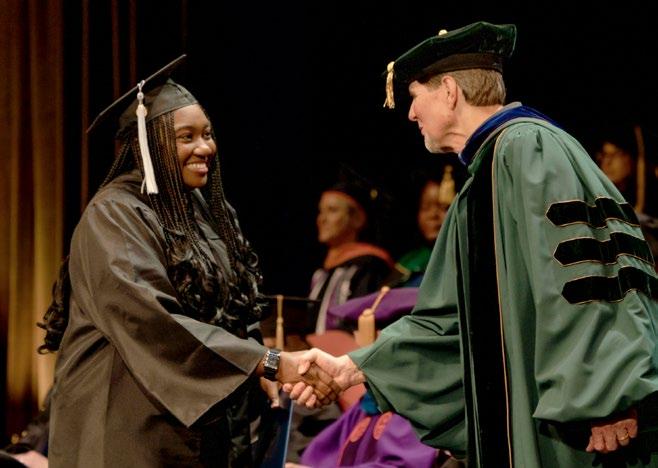

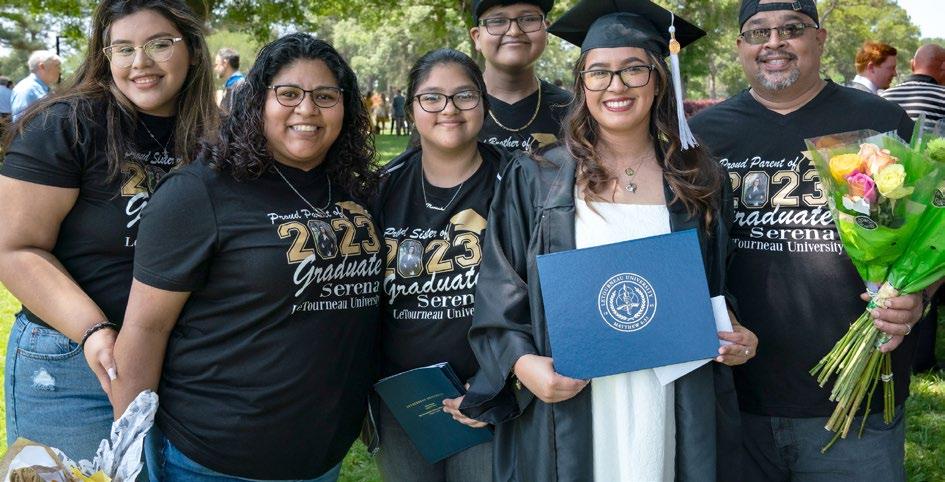
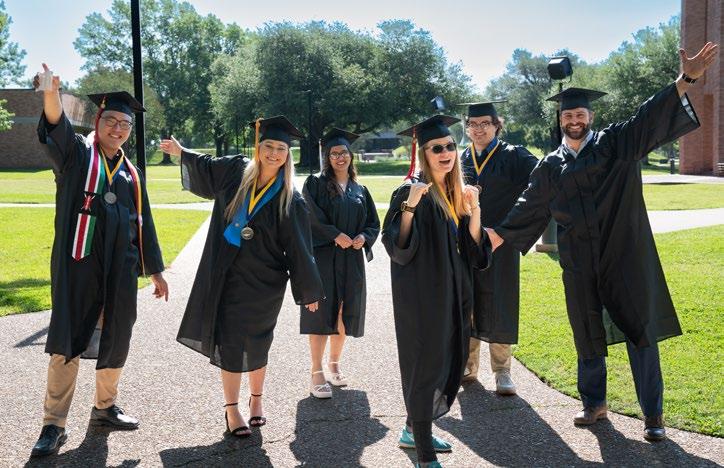


PHOTOGRAPHY BY GRANT BRIDGMAN SPRING/SUMMER 2023 13
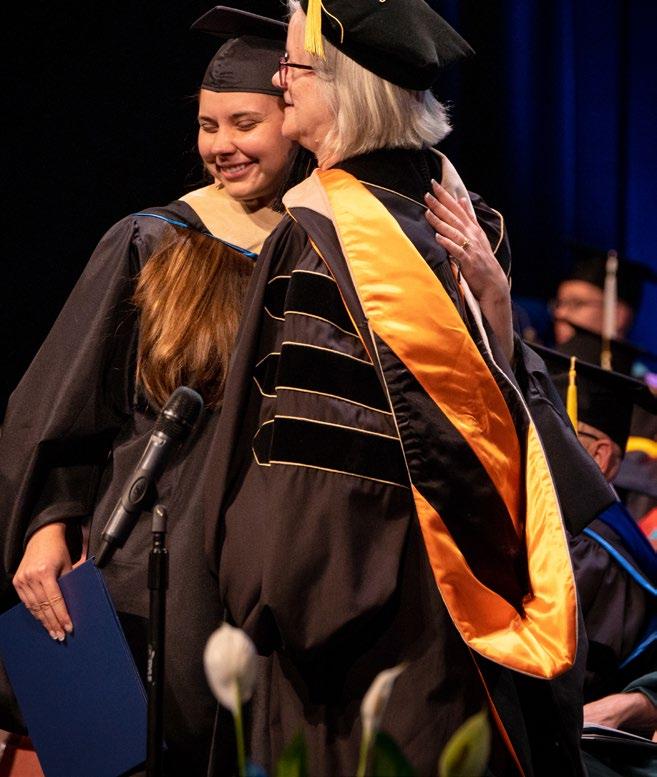

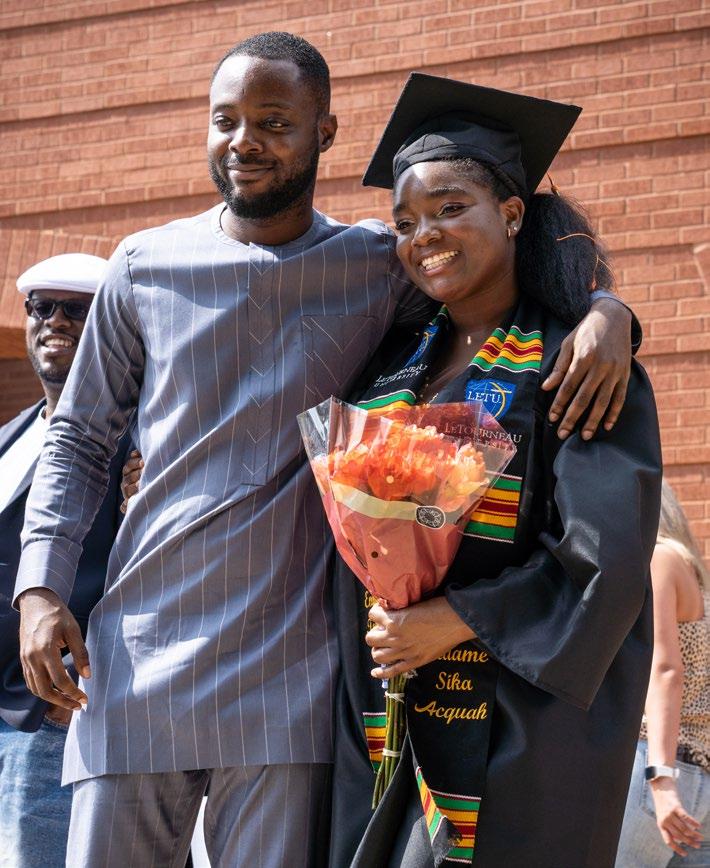

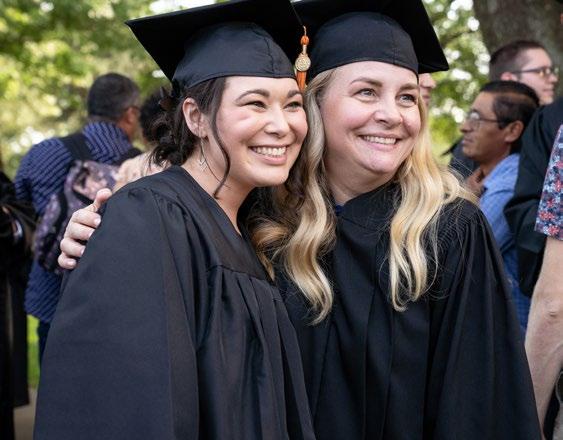


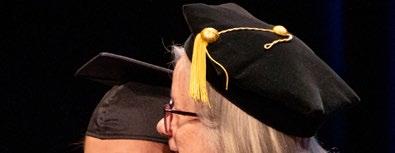
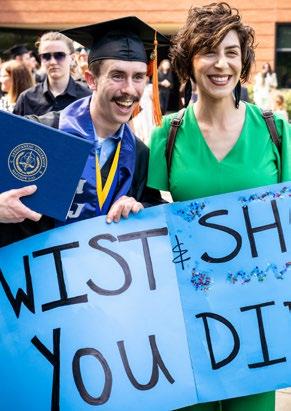
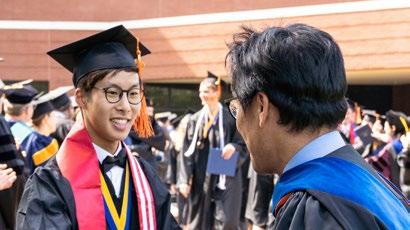

14 LETOURNEAU NOW
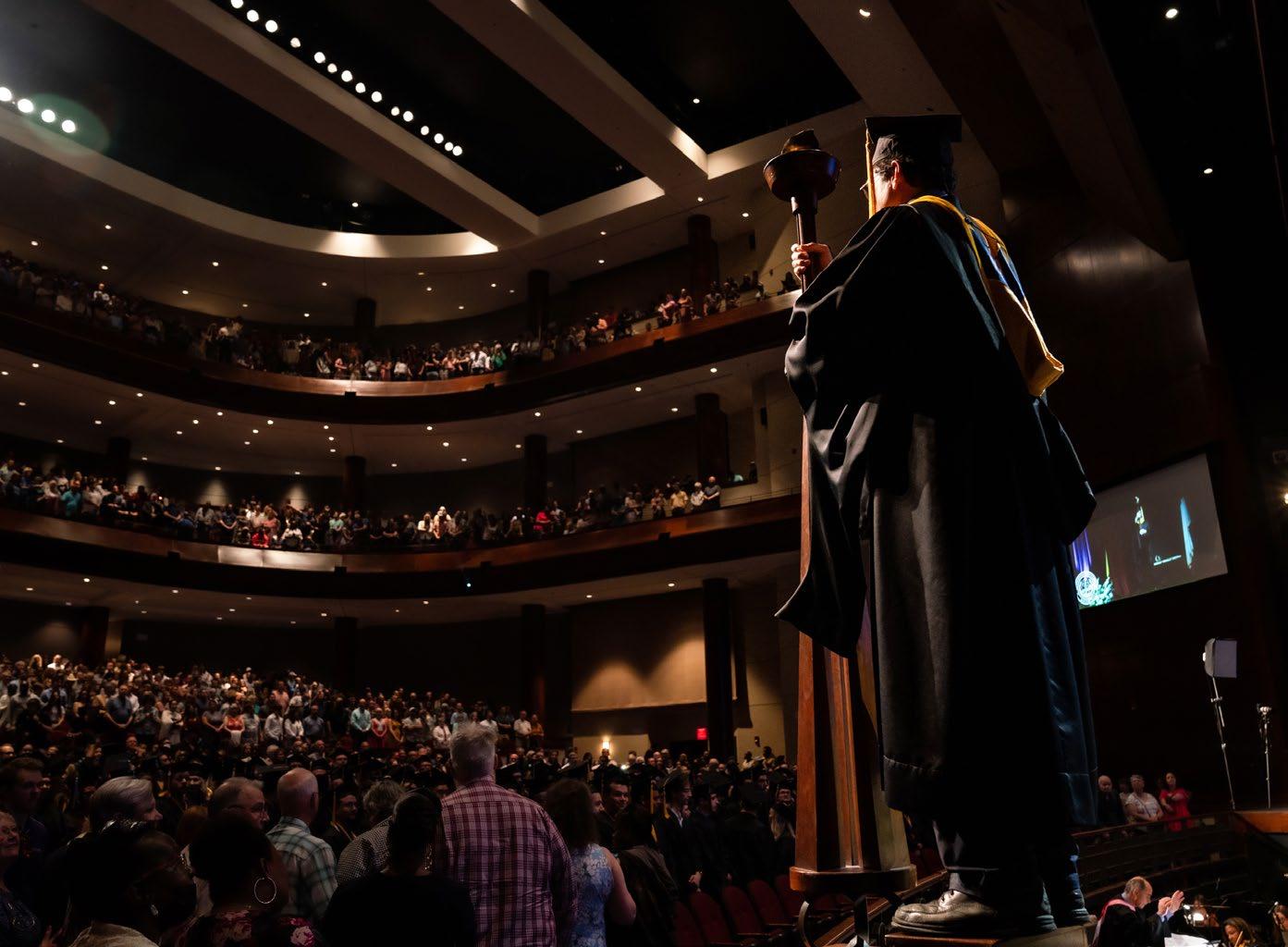
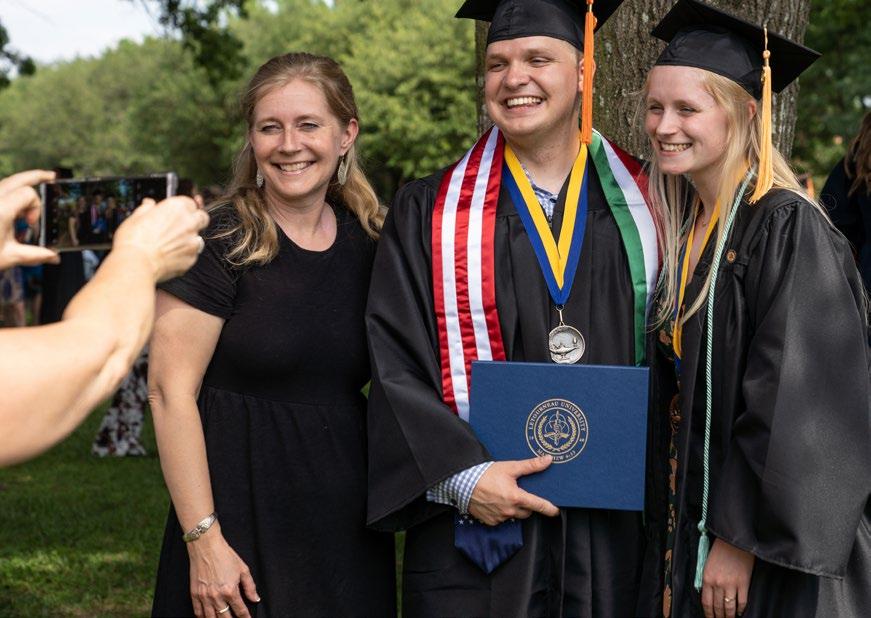

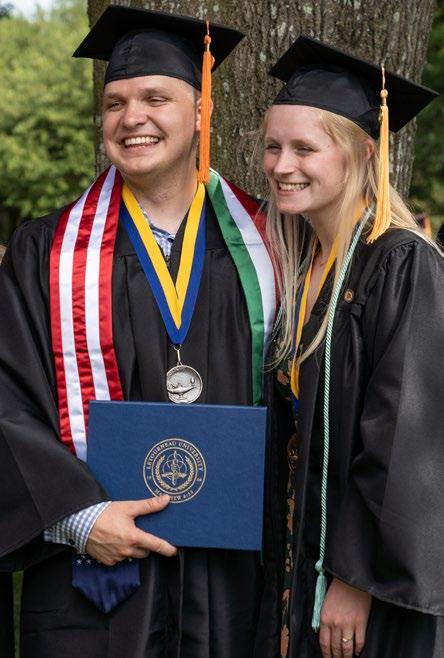

Congratulations
PHOTOGRAPHY BY GRANT BRIDGMAN & SARA BRYAN SPRING/SUMMER 2023 15
SPRING 2023 GRADUATES
FOUR STUDENTS. FOUR DISCIPLINES. ONE PROBLEM. ONE MISSION.
INTERDISCIPLINARY AQUAPONICS TEAM
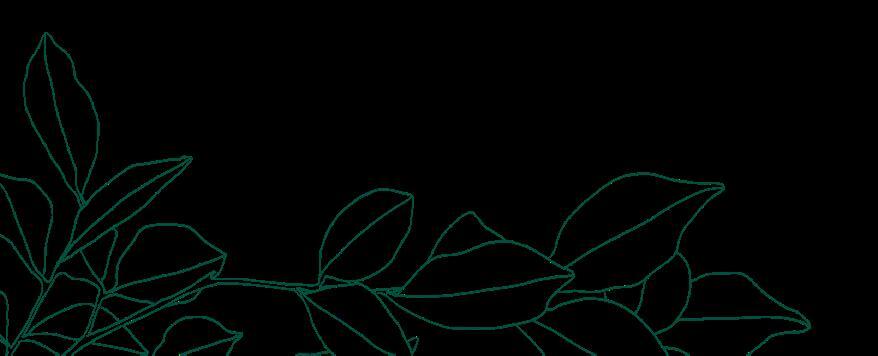
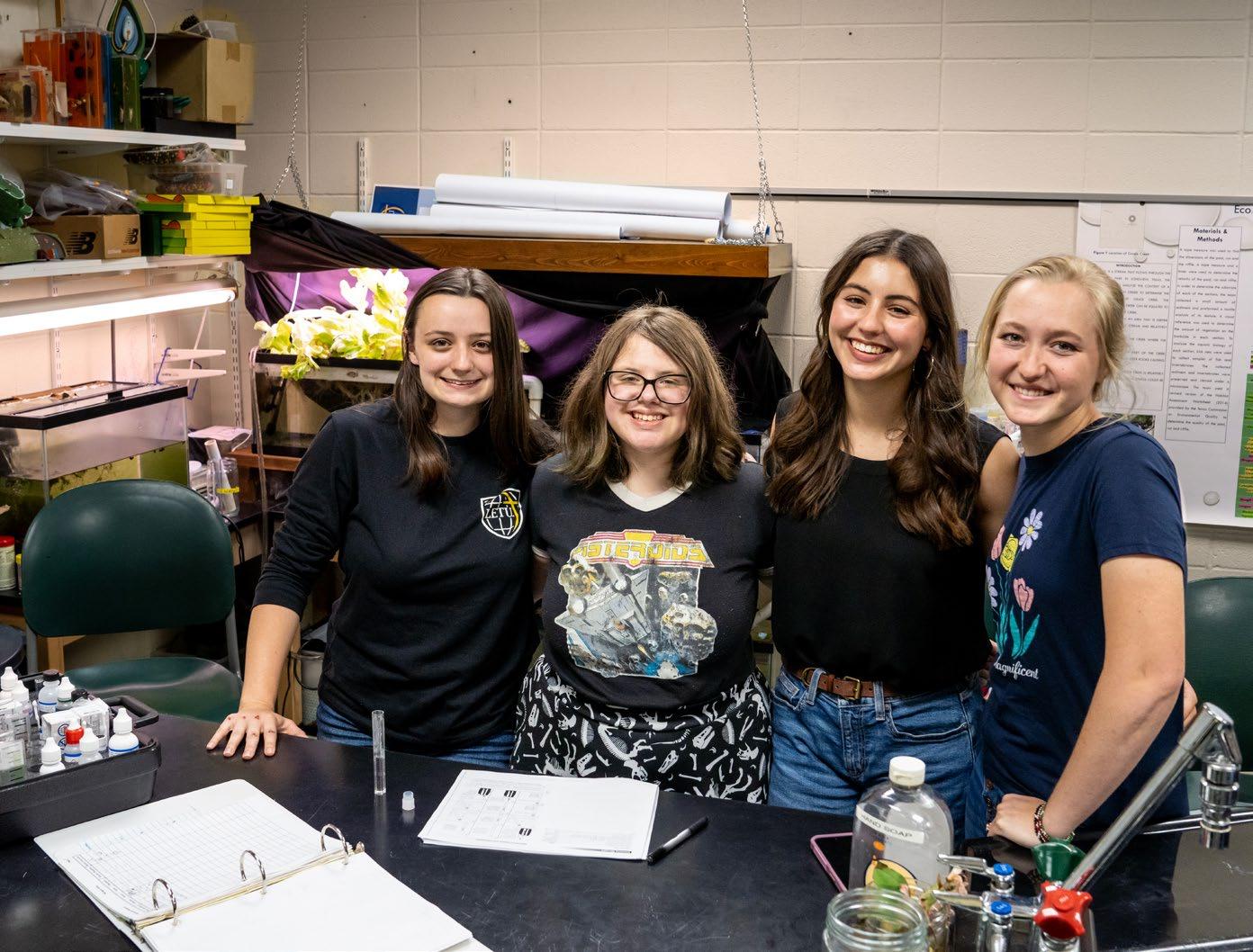 BY GRANT BRIDGMAN
BY GRANT BRIDGMAN
What does it take to make an impact in the world? Skill? Persistence? Answering this question can be difficult, as "impact" can be a nebulous, subjective, moving-target kind of term—let alone how to make it happen. Despite this, it seems there are a few elements that remain time-tested and widely accepted, even if not always widely practiced, when it comes to what’s required to go from "zero-impact" to "difference-making."
Little things can lead to great impact.
Economist and philosopher Edmund Burke once said, “nobody made a greater mistake than he who did nothing because he could do only a little.”
This is partly the premise behind all scientific research. One small discovery can lead to another, and on and on, compounding into great leaps in scientific achievement, even if—especially—over long periods of time. If the initial "small discoveries" were considered too insignificant to invest in, some larger mountains of problems would never have been moved.
For example, among the mountain-sized issues of the modern world, malnutrition looms large. Taking scientific research and applying it to specific communities, for specific outcomes, requires small steps. The good news? Making a positive impact can be as simple as taking one “little” step.
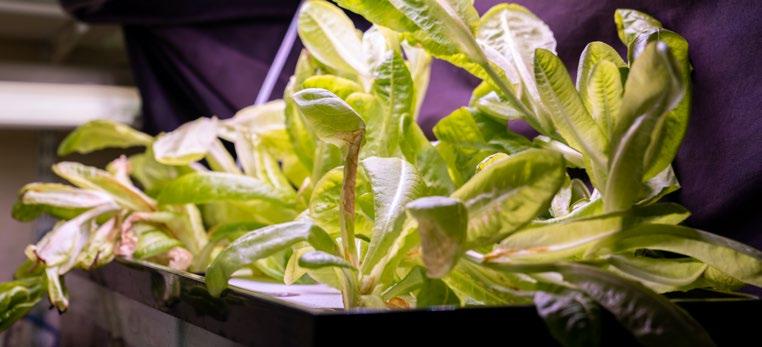
Great impact never happens independently.
It comes to life through relationships. This may be the most difficult type of impact to quantify while simultaneously being the most universally understood. Our interactions with other human beings have the power to transform. Our very search for purpose or meaning is rooted in the context of how our lives could be in relation to the lives around us. We were created to live with and learn from one another.
The greatest impact is iterative.
It’s a repeated process that points to something bigger. Its power lies in repetition, a continuous cycle of transformation and insight. It’s the life-giving ideas that become alive in and of themselves that build upon one another and snowball into the sort of impact that changes lives for the better and impacts generations to come.

Combine the three, and it’s transformative. Small, baby steps. In community. Over and over. It’s how change is built. It’s a cycle as old as humanity.
A cycle of impact.
The constants in that cycle are seen here at LeTourneau University every day in classrooms, laboratories, online discussions, faculty offices, and many places in between.


 PHOTOGRAPHY BY SARA BRYAN & GRANT BRIDGMAN
PHOTOGRAPHY BY SARA BRYAN & GRANT BRIDGMAN
SPRING/SUMMER 2023 17
LITTLE STEP - LARGE IMPLICATIONS
Perhaps nowhere were these elements of impact more clearly seen this past semester than in the work of a particular science research team: Emily Shea, Kayla Woodworth, Sarah Kushner, and Olivia Donnelly joined forces to create a working aquaponics system—a food production system that combines raising aquatic animals with the principles of hydroponics (growing plants in nutrient-rich water).
In what could be viewed as a microcosm of the unique approach to learning at The Christian Polytechnic University, the project: fostered a deep connection to the missional/global impact that every student on the team regarded as deeply important; involved integral faculty guidance and mentorship impacting the both team’s work and the team itself; and, what makes this project all the more unique is its interdisciplinary nature (the team consisted of one biology major, a marketing major, a civil engineering major, and an undeclared student).
The importance of an interdisciplinary approach to such work is becoming increasingly evident in both higher education and in the vocational world. All these factors are underscored by the importance of relationships. The work itself may be closely tied to a more "scientific cycle," yet points to a much bigger cycle of impact this team of students is participating in—through a theological lens, one of academic, vocational, societal, and ultimately, eternal impact.
It all started when Woodworth was in Life Sciences class with Dr. Scott Dyer, Assistant Professor of Biology, in 2021.
She is the member of the team whose major is still currently undecided, although she has a deepening love of science. Through the



course of conversations with Dyer, Woodworth brought up work that she and her parents had done while serving as missionaries in Kenya before coming to Texas. It sparked interest.
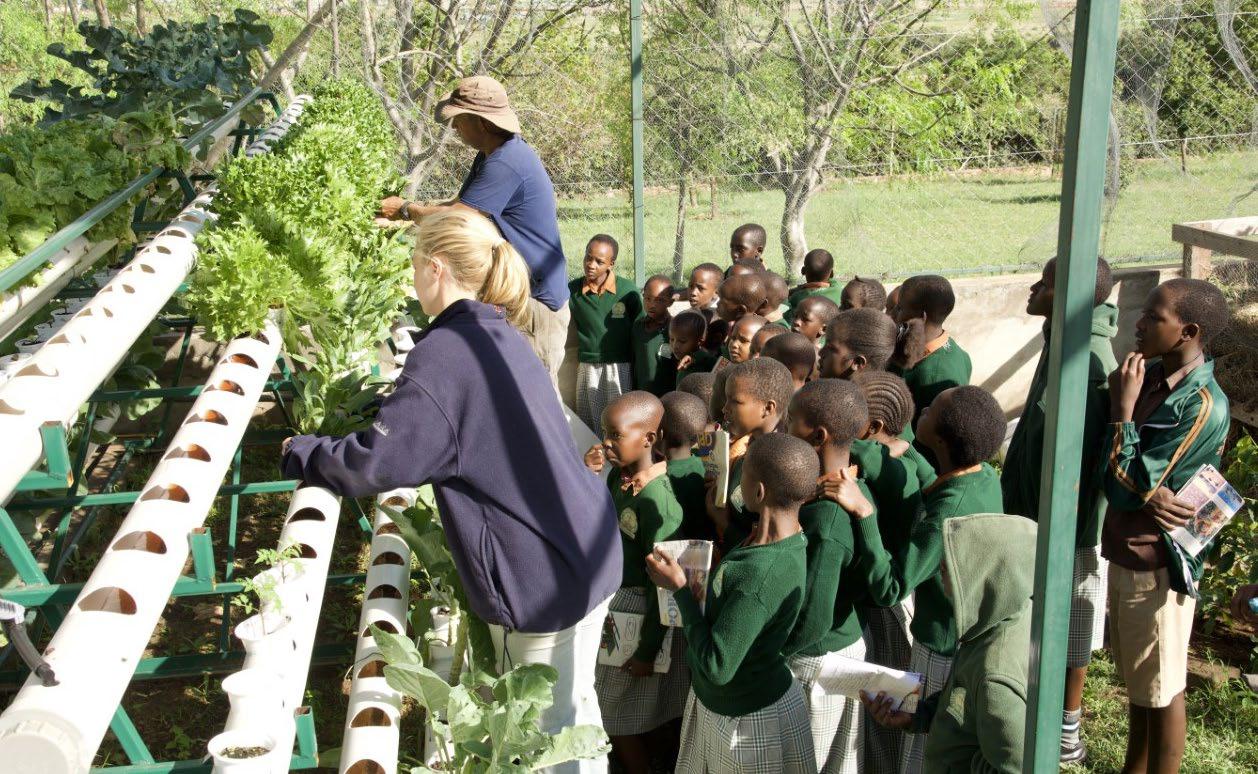
Woodworth’s parents, John and Becky (LeTourneau University’s current Missionaries in Residence), noticed that while people may have been getting enough to eat, they weren’t getting good vitamins. In response, they developed a well-working hydroponic system, growing plants with just water and good nutrients.
In talking with the team, Dyer decided to create a research project centered around aquaponics, which takes a hydroponic system and introduces a protein source. As he states, “the advantage of an aquaponics system is that you have the potential of including a protein source with your plants. You feed the fish and the waste products from the fish feed the plants.” He decided to use koi fish.
The baseline project idea was born; now the team just needed to be assembled.
FOUR STUDENTS
Donnelly, a sophomore, is pursuing biology with an emphasis in environmental science. When asked about how she joined the team, she stated, “Over the summer between freshman and sophomore year, I started thinking about changing my major. I really wanted to pursue environmental science/agriculture, so I contacted my advisor, and he told me to talk to Dr. Dyer. I set up a meeting, and he told me that we could create an environmental science program through extra courses and research. I then found out that Kayla was starting this
18 LETOURNEAU NOW
Kayla and her parents developed a well-working hydroponic system in Kenya after noticing that while people were getting enough to eat, they weren't getting good vitamins.
research project with Dr. Dyer at the same time, so he asked me if I'd be interested in participating. I was so excited to have the opportunity to learn more about something I was really interested in.”
The team’s marketing major, Kushner, reflected on her own process in joining the team: “I asked Dr. Dyer if I could do research for some of my minor classes, and he agreed and told me the options I could choose from. I had always been interested in aquaponics and sustainable farming, but I didn't really have any knowledge of it. I also heard who was on the project, and that really helped me make up my mind, because I already knew Emily and Olivia. They lived on my floor, and I knew how fun and hardworking they were.”
Shea is the lone junior in the group, and is studying civil engineering with an environmental concentration. She connected with this project through another faculty member, Dr. Darryl Low, Professor and Chair of Civil and Environmental Engineering. Here, he shares his perspective on the impact—of both the project and the people:
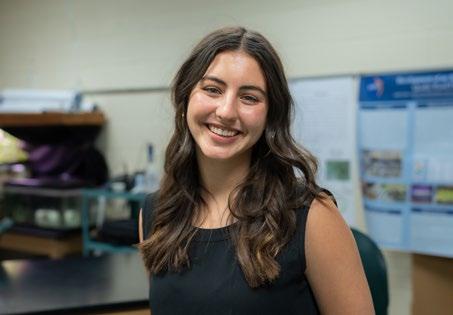
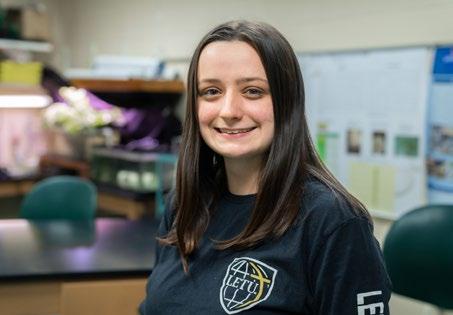


“With the overlap of the fields of biology and environmental engineering, there are numerous opportunities for collaborative research. Dr. Dyer and I have enjoyed working together in the past, so when he approached me to discuss an aquaponics system on campus I was extremely interested! Emily was a rising junior environmental engineering major and was invited to join the undergraduate research course in Civil and Environmental Engineering. She selected aquaponics as her research topic, where Dr. Dyer and I would serve as the research advisors.”
The basic design of the aquaponics system was modeled after a wetlands-style system. The purpose was to develop a fully functional recirculating system in which plants and fish could properly grow. It is a four-tank system, including a settling tank, biofilter, plant tank, and fish tank. The team quickly found that one of the most important parts of their research was monitoring the nitrogen cycle throughout this system.

The Encyclopedia of Ecology (2nd ed.) defines the nitrogen cycle as, “the movement of nitrogen across different reservoirs, including living organisms, in different forms via chemical processes.”
In other words, nitrogen moves through all types of living things, and as it does so it changes forms. Something that moves through all living things, even if it changes forms? Sounds familiar—a lot like the way human beings impact one another. Words, actions, work, play, joy, grief. Every part of life is affected by the cycles of human interactions that take place three hundred and sixty-five days out of every year.
MEETING THE MENTORS
On university campuses, one of the most commonly sought-after types of human interaction is the one that takes place between students and faculty. Within many university programs an understanding exists of the importance in positive faculty/ student connection, both to guide the learning process and to create valuable mentorships to further both research work and professional goals.
Data from the Strada-Gallup Alumni Survey indicates that “while there is confirmation that faculty serve a critical role as the main source of mentorship for college students, less than half of graduates report that they had mentorship in college.”
An article by Higher Education Today, from the American Council on Education, distilled the importance of faculty into three categories: “getting students excited about
KAYLA WOODWORTH
SARAH KUSHNER
EMILY SHEA
OLIVIA DONNELLY
SPRING/SUMMER 2023 19
college worth is tied to learning and outcomes, or the success of future career goals.
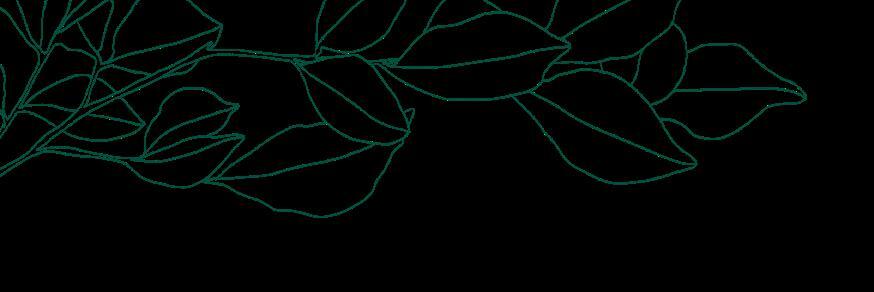
However, research from a publication by the National Academies of Sciences, Engineering, and Medicine confirms what we intuitively know and as Christians are especially compelled by: that “engagement in mentored research experiences has been positively associated with students’ research skills, productivity. . . identity and confidence, and their sense of belonging.”
While there are some who may think of faculty mentorship as primarily helpful for either soft skills or a specific technical field, the data would suggest that both the practical and the purposeful are of equal weight and impact.
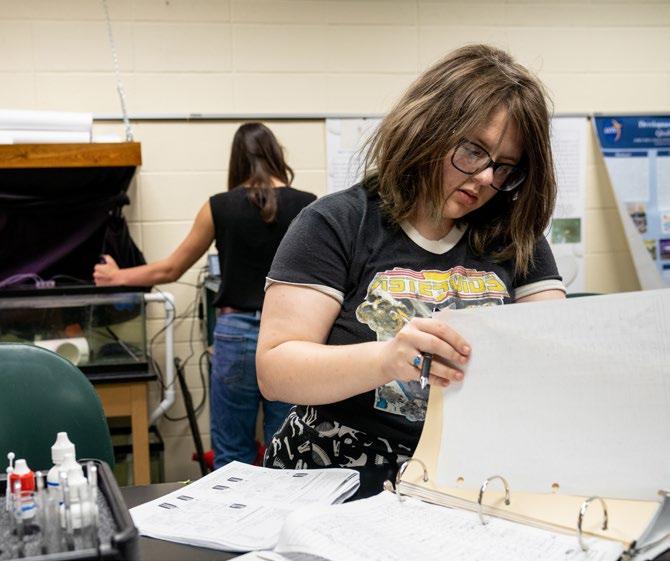
The students on the aquaponics research team would certainly agree with that data.
Kushner states, “Dr. Dyer and Dr. Low are both so intelligent and yet also so kind and willing to help. They are truly amazing people.”
Donnelly emphasized, “Dr. Dyer and Dr. Low are such great faculty to learn from. Their dedication to making the project work and to doing it in a way that honored God was very significant.”
Woodworth reflected, “Dr. Dyer has really opened the door to a love of science that I never realized I had, and he also has connected me to practical next steps to pursue my interests. In talking with him, he connected me with another professor’s son who is doing sustainable gardening in a community outside of Dallas. I went and visited them
and saw what they are doing and how they are seeking to learn more so that they can implement those skills into the community. So, I thought 'I want to learn more. I want to be equipped to be able to garden and be able to provide something that is sustainable, something long-lasting.'”
While the impact from faculty investment clearly aided in the effectiveness of this project, perhaps almost more striking was the interdisciplinary make-up of the research team.
FOUR DISCIPLINES
How important is an interdisciplinary team? Modern logic, especially in Western culture, tends to prioritize narrowing the focus of educational training to produce subject experts. But research on undergraduate experiences of interdisciplinary collaboration reveals that this picture of expertise is incomplete. A recent study presented in an Elsevier journal (titled "Factors Associated with Disciplinary and Interdisciplinary Research Collaboration") confirms that, “interdisciplinary research is desirable for solving complex societal problems. . . because the solution of such problems often requires input from more than one scientific discipline.”
In a workshop conducted by the National Science Foundation (NSF), researchers concluded that, “the ability to conduct interdisciplinary research is necessary to maintain U.S. competitiveness in high-value industries and has important economic and societal benefits through inventions and innovations that deliver new products and services or improve the effectiveness and efficiency of existing processes.”
These findings are borne out in Dr. Low’s own experience of working on an interdisciplinary team:
“From a personal perspective, I was very impressed with the collaboration that the students displayed as issues arose during construction and operation of the aquaponics system. Frequently, when researchers come from such differing backgrounds, there is constant strife between them that disrupts the work; however, these students were able to adapt creatively and quickly to solve problems as they arose. It was special to see how a student who was the technical leader in solving one problem would seamlessly convert to a supportive role on a different problem where another student was the technical expert. I’ve never seen a student team be as functional and collaborative as this one was.”
High praise indeed, yet consistent with the commentary from the students themselves regarding the mix of academic disciplines and unique personalities on the team.
Shea states, “What’s been most meaningful for me in this project is the opportunity to work with a group of a bunch of different people. I’ve worked with a lot of civil engineering students because of my major, but I’ve never been able to expand across departments. I’ve really enjoyed being able to be a part of a team because we can have each other’s back and hold each other accountable—and it makes it more of a community experience. We’re close, we’re friends, we can do the research, and enjoy ourselves while we do it.”
20 LETOURNEAU NOW
HOW IT WORKS
Perhaps this evidence leads to one significant takeaway—an interdisciplinary approach to scientific research not only has a positive impact but could be the primary ingredient needed in creating the solutions for today’s mountainous problems and the first steps in taking on those of the world of tomorrow.

WORLD OF OPPORTUNITY
The next step, the dream step for this team, would be to scale their system, to replicate it bigger and better. All of the same chemistry and biological properties would be mimicked in a larger unit—a unit that could be capable of growing many pounds of produce, and one that would not come with the price tag typically associated with commercial grade hydroponics or aquaponics systems currently on the market.
Current data from the Global Nutrition Report states that the rate of malnutrition around the world is accelerating. In Africa, for example, “the prevalence of child growth stunting (due to lack of nutrition) is 30.7 percent, which is higher than the global average of 22 percent.”
This is more than just data to Woodworth, her parents, and others who are seeking to bring some hope in the form of additional vitamins
and other nutrients to communities in need. The aquaponics system created by this team, while fully functional, is just the beginning.

Future iterations would allow missionaries like the Woodworths to even more deeply contribute to larger communities in need. The potential to scale this impact is certainly at the forefront of the minds of every member of this research team.
Donnelly commented, “You learn so much more when you’re actually working with your hands and seeing the results of all your work. But the most impactful part of this work for me was seeing how you can have a mission behind what you’re doing. That is what truly makes the work significant.”
Students at LETU tend to have hearts that beat in rhythm with the missional legacy of the university, and while this might seem only natural for students at a Christian university, students and young professionals from all walks of life around the world are becoming
SPRING/SUMMER 2023 21
Such mobilization requires connections with people, so it’s not surprising that additional research points to a fascinating translation of these findings related to younger generations’ approach to their work.
A 2022 paper by The Brookings Institute highlights that the most important indicator and pathway to meaningfulness related to work is, in fact, relationships: “Despite what most economic models predict, work is not just a source of income but also provides identity and individual self-esteem. As such, work is a pivotal part of human life . . . Working conditions related to hierarchy, job insecurity, and working hours are certainly important aspects of any job. However, it is autonomy, competence, and especially relationships at work, that nourish and sustain meaningfulness.”
When taking these findings related to work, purpose, and meaningfulness in life in general, how do we bridge the gap between the pragmatic and the philosophical? And how does our faith and understanding of eternity inform that pursuit?
DIVINE TENSION

In a world oftentimes caught up in a mad race to innovate technology to solve all of humanity’s problems, the topic of human flourishing is typically thought of as the end goal of all our best human efforts rather than the meaning and purpose derived from God’s work in Jesus Christ to reconcile, redeem, and bless all of creation. This work is not reserved for the best parts of existence. God has called us to share in his mission for the redemption of this world in every aspect of our lives, even the hardest parts. While most would support a vision for a society without any pain and hardship, could that same pain be part of what makes problems worth solving? In his book, Man’s Search for Meaning, Austrian psychologist Viktor Frankl wrote that he believed one finds meaning through either love, work, or suffering:
The aquaponics team presented their research at the East Texas Research Conference this past April. This team of "underclassmen" competed against fifty-four teams made up of senior undergraduates or graduate students, and the aquaponics foursome took 2nd place overall.
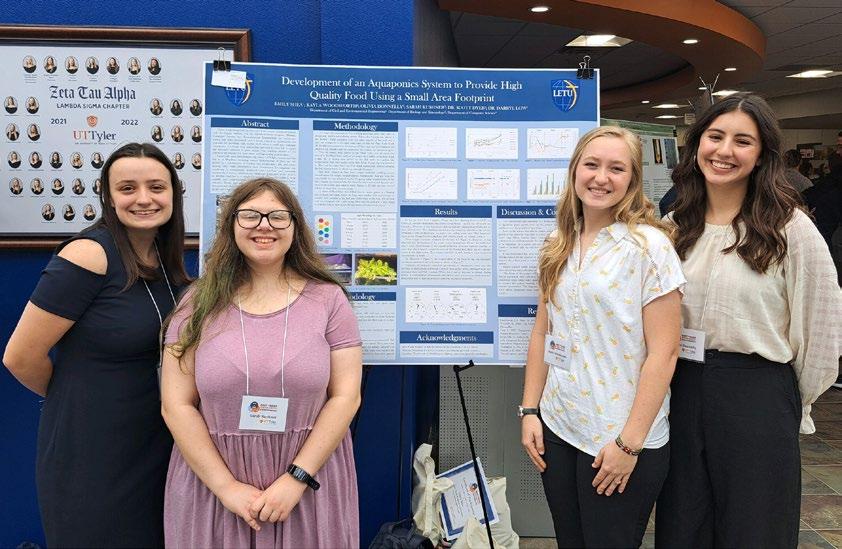
“If there is a meaning in life at all, then there must be a meaning in suffering. Suffering is an eradicable part of life, even as fate and death. Without suffering and death, human life cannot be complete.”
That quote from Frankl highlights a vital component of the journey of faith.
We were created to live eternally, yet human physiology puts our expiration around 73 years, on average, at which point we transition to our eternal form. Just as the cycle of redemption as written in scripture includes death (separation from God through sin), birth (Christ entering the world), death (Christ on the cross), and rebirth (resurrection and ascension of Christ), here on earth we see the cycle of birth and death play out constantly, all around us. Just as the nitrogen this research team studied had to go through a cycle that involved change, so also our lives go through much change in the course of love, work, and suffering.
The work of this interdisciplinary team is also actively addressing the brokenness of our world by participating in God’s plan to restore creation to its original integrity. Aquaponics does not replace God’s incomparable act of redemption in Jesus Christ, but it does bear witness to the fact that God has not left the world to starve—that God’s heart breaks over this and the world is not forsaken. And they are seeking to actualize the latent potential of creation through the development of agricultural science and technology. The team engages with creation in order to bring it into alignment with God’s goal for creation. We actively seek, research, and build tech that anticipates God’s new creation in the present, and by doing so, our lives reflect the hope that we have in Christ’s return.
In his white paper, titled LeTourneau University as The Christian Polytechnic University: Embracing the Saga of our Unique Organizational Calling, LeTourneau University President, Dr. Steven Mason, emphasizes:
“While technology is constantly changing and advancing, there yet is still ‘nothing new under the sun.’ We must take into account what all the disciplines have to offer in telling the most comprehensive story—that of

22 LETOURNEAU NOW
creation, fall, redemption, and restoration. The technical and the skillful is bound to the thorough and thoughtful.”
The pragmatic and the philosophical can be more fully realized through this sort of divine tension—a tension like that of a suspension bridge, taut but necessary to span the gap between the work we pursue and the meaningful life that we crave. A tension that can only be secure through God’s restorative work in creation.
TRANSFORMATIVE RESTORATION

There are many conversations swirling around today’s world about the potential impact of new technology on education, jobs, and society as a whole. Perhaps there is a level of encouragement in the reminder that the main source behind most of the “problems” that technology is trying to solve is the very thing that technology can never replicate—the beauty and the difficulty of being human in a broken world and the eternal relationship that our Creator is pursuing with us. While technology may have the potential to replicate many aspects of the natural world and imitate many parts of our daily experiences, the deeper restorative work of God in his creation will not ever be artificially synthesized. This work includes a mind built for original creativity and community, a heart that cares for the world around us, and a soul that is connected to our Creator and to eternity. Those three parts are intrinsically, inseparably, and eternally woven together, giving us access to join in the restoration of all living things.
This aquaponics research team is an example of the truest form of this work. The work itself is a testimony to how God created human beings to flourish in communities that depend on one another to grow food and to enjoy table fellowship together. Their interdisciplinary team showcases the benefit of drawing on varied backgrounds, life experiences, and academic expertise in pursuit of living and learning together in community. Their heart for communities around the globe highlights their connection to (and care for) the world around them. Their eternal context views impact in terms of calling. What they each bring to the table fills them up with unified purpose and guides them—heart, mind, and soul—through each step in their educational and vocational journey.
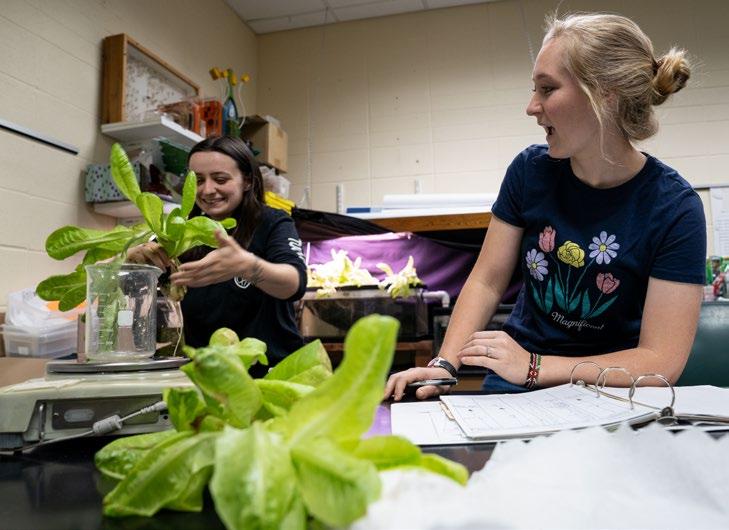
What’s the next phase of this project? How large-scale could their aquaponics system become? Which community would be the beneficiary of the larger system? These and many other questions are no doubt on the minds of these students, their faculty mentors, and anyone else who is searching for solutions to the many types of suffering in our world today. For Olivia, Sarah, Kayla, Emily, and anyone else in the midst of a learning and growing mindset, the journey itself is the most rewarding part of the process. A journey with an eternal cycle and immeasurable impact.
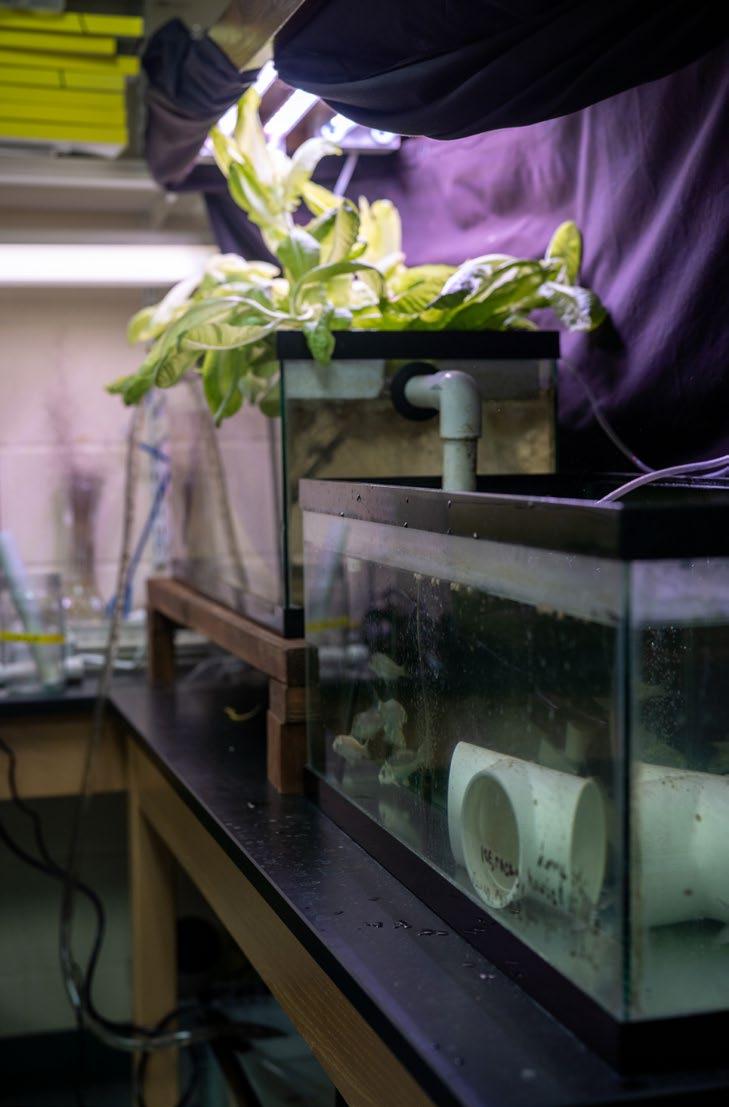
SPRING/SUMMER 2023 23

24 LETOURNEAU NOW
THE STEWARDSHIP OF academic ministry
“LeTourneau University is a special institution. By ‘special’ I mean two main things. First and foremost, our institutional commitment to Jesus and the gospel is becoming increasingly rare. We are a place that is decisively devoted to both the practice and proclamation of the gospel through the integration of Christian faith and learning and living. Customary patterns of life at LeTourneau are atypical within higher education, such as an extra five minutes added to each class period for prayer and a devotional moment; an annual faculty commissioning service that is similar to sending missionaries off to the mission field; and 'all campus chapel' every week, where both faculty and staff are invited to close their offices to join the students in a community gathering of worship and Christian fellowship. And these are just a few of the ways we hope to reflect a thoroughly Christian academic ministry. LeTourneau University is a special institution in this way, and as we stay the course, we will continue to grow in these distinctives.” —As excerpted from the recent white paper titled LeTourneau University as the Christian Polytechnic University: Embracing the Saga of Our Unique Organizational Calling, by
Steven D. Mason, Ph.D., President, LeTourneau University
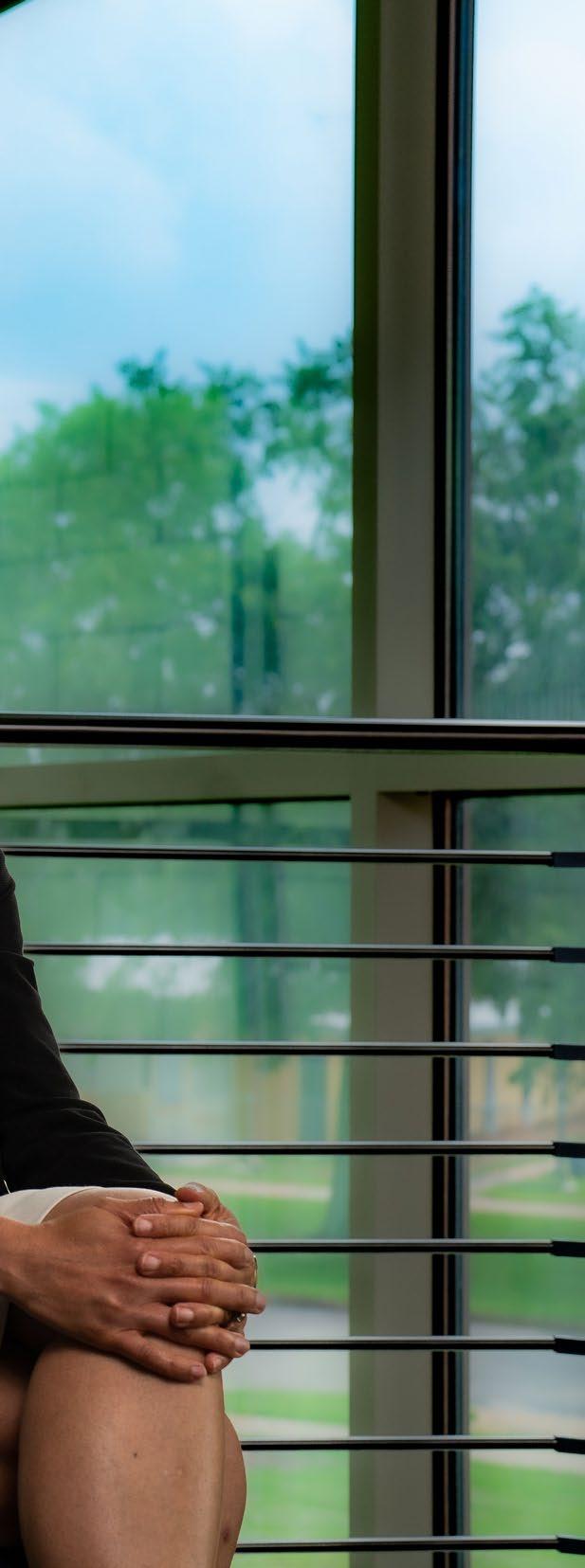
To some, "academic ministry" may sound like a buzzword sort of phrase. One that’s thrown around in a way that feels like jargon. An intellectualized, stuffy concept that eventually loses most of its meaning because a subset of people or institutions who employ it do so in an empty way. But if you listen to these individuals talk about academic ministry, you'll realize it's less about the words they use to describe it. In fact, you don’t have to just listen with your ears. Listen with your eyes. The whole of your senses. Feel the rhythm of patterns on campus—a combination of sacred long-standing practices and organic moments that surface by way of God-connected nudges. Encounter in-class devotionals, prayers in hallways, conversations in labs that point to something bigger and deeper, focused engagement between staff and student that addresses both the practical and the personal needs that present, and perhaps you’ll experience academic ministry in the way students have been experiencing it at The Christian Polytechnic University for 76 years and counting: the way of embodiment. Here, academic ministry travels from head to heart, and lives and breathes on campus and beyond.
This embodiment presents as presence. And that’s something the three individuals teaming up to steward the academic ministry of LeTourneau University have in spades. Meet the Office of the Provost, and you’ll get a sense for how they model a specific type of ministry and presence that can only happen in a place like this.
PHOTOGRAPHY
BY GRANT BRIDGMAN
SPRING/SUMMER 2023 25
BEN CALDWELL, PH.D.
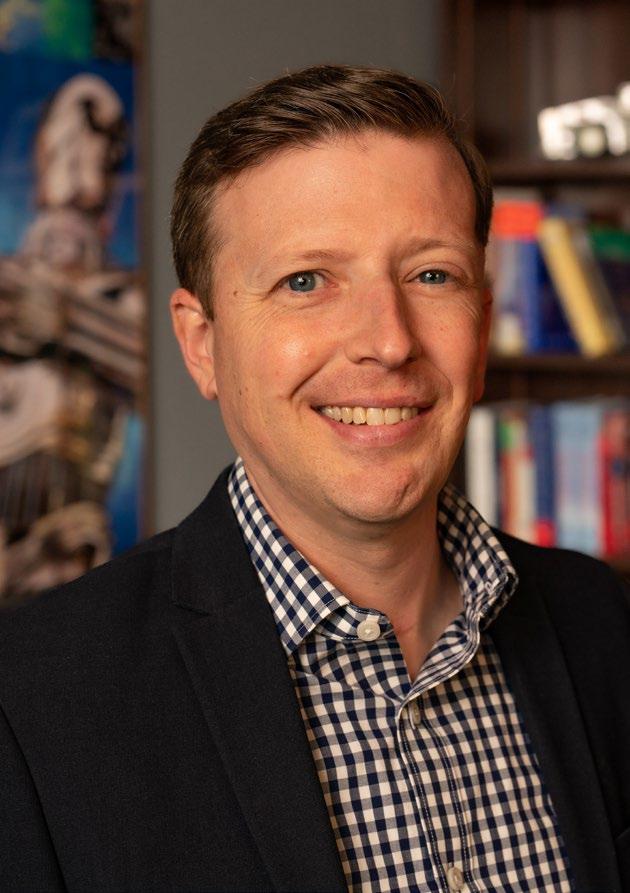
Provost & Vice President for Academic Affairs Professor of Mechanical Engineering
Dr. Caldwell was named Provost & Vice President for Academic Affairs in 2021 after serving LeTourneau University since 2012 as professor, TFO president, Associate Provost for Academic Administration, and most recently as Interim Provost and Vice-President for Academic Affairs. As a mechanical engineer and published scholar, Dr. Caldwell’s classroom teaching evaluations perennially score in the top percentile of the faculty body. He has procured two National Science Foundation grants and has mentored a number of graduate students over the years. His administrative leadership has focused on faculty formation and development as well as facilitating interdisciplinary and collaborative projects across the university.
Dr. Caldwell earned a Ph.D. in Mechanical Engineering, a Master of Science degree, and a Bachelor of Science degree, all from Clemson University. His research interests have included mechanical engineering design methodology, creativity and ideation in engineering design, and engineering education.
He and his wife, Amanda, recently celebrated their 15th wedding anniversary, and they have four children, Evelyn, Lucy, Charlotte, and Beatrice. They are members of One Hope Presbyterian Church in Longview, where Dr. Caldwell serves as a deacon. In his spare time, Dr. Caldwell enjoys mountain biking, tennis, and cheering on the Clemson Tigers football team.
Education as Ministry
Education or teaching is very much a ministry. We’ve been given so much as teachers. We’ve gone through so much. We’ve learned. We’ve earned master’s degrees and Ph.D.’s in the process. We’re studying very deeply in our own discipline, and at the end of that we decide, "Hey, I want to share that with others." There are a lot of other things faculty could be doing, or that they do or have done—some have had full careers as they’ve come into it. But they decided that this is how they’re going to share God’s gifts that they’ve been given with the next generation and one another. So, to me, that’s ministry. That’s what Jesus did for us. He continued to give of himself, to the point of death.
Our faculty are pouring into students all the time, and it’s not just in the classroom. When you think about it, the time in the classroom is somewhat of a baseline. That’s the expectation, to go teach your class effectively. That above-and-beyond engagement, during office hours, in homes… that’s not necessarily required, but the type of people we hire tend to do that.
They’ll have students over for dinner or dessert, for game or movie night. They’re always interacting with students. Many faculty lead life
groups as well, so they may have a deeper dive on a bible study or engage with students through their churches. I know my family has personally connected with students at our church, had them over for lunch and built relationships that way. Our students are being spiritually developed by some of "our" people and some of the broader Longview community as well. Devos, life groups, church life… all of that becomes hallway conversations, office conversations, the academic advising conversations in which we’re talking about students’ futures, what they feel called to, what God is up to in their life, how they’re growing, all of that. We hope and pray it points them in the right direction.
For many students, this is exactly why they come to LeTourneau. But there are non-believers right alongside them. They get to see and experience the way that faculty are pouring into their students, they get to hear and experience the Gospel, they get to see and benefit from that consistent behavior that we hope is a strong witness to them.
Pour in, so Students Can Pour Out
To me, that really shows that it’s a ministry. Faculty are pouring into students in all aspects of life, and even staying connected after graduation. They have graduates’ phone numbers. They keep up and
26 LETOURNEAU NOW
know when they get married and have kids. It’s connecting with these people and helping them mature in their faith and in their professional development so they can go make not just a professional impact, but so much more.
It's not that they have to go out and be a missionary to minister. This goes back to R.G.’s story. I love the fact that we foster that in many ways. This is the orientation of our faculty, and we foster it in our students with extraordinary intention: Go be a professional and do that well and minister to the people around you. Engage in your church where you go. Land somewhere and serve the people around you.
The Development of Academic Ministry Culture
I think hiring is a big part of stewarding the academic ministry culture. Hiring people that are like-minded in that sense. The type of people that are attracted to LeTourneau see what’s going on, and they want to connect with students in a different way. Many faculty are seeking that opportunity.
We are explicit with faculty that a lot of this outside-the-classroom investment in students is not an expectation but is rather encouraged and welcomed. Part of our annual evaluations gives space for this recognition. We want to recognize their contributions to the university in the ways they connect with our students and our community—an acknowledgement and a thanks that these things are happening, that they’re pouring a lot of work into this, that this is important. This is what we do, what makes us who we are. So, we take the opportunity to recognize that. To formalize or require it, I think, would take away from it. Some of it’s just our organic culture, and we certainly want to receive and affirm it as the gift that it is.
A Culture of Interdisciplinary Connections
All of our new faculty get paired with a mentor, and it’s generally one outside of their discipline. They’ll naturally hang out with fellow faculty in their discipline, so they’ll see what their peers are doing within their area. They get course notes and things like that from people near them, but we try to get someone outside to help them integrate into LeTourneau in a different way. These are good things to see others do outside their discipline and ask questions, like "what might that look like for my life?" Everyone has their own strengths and ways of connecting, and some people may choose to lead a life group or bible study. Others are going to hang out or fix a car together. For faculty to see what others
are doing and begin to find their own place to contribute and connect with students is meaningful. It’s intentional, and it seems to work well.
The Construction of Care
I see the Provost Office's role as caring for and equipping faculty so that they can care for and equip the students. If we can care for them deeply, set them up for success, equip them in the right ways, and create an environment in which they can connect with students, then that’s ultimately our goal—everything we do is for faculty, and what they do is for students. So, bottom line, we focus on students through our faculty.
It’s unique for students to have this level of meaningful, lifelong relationships with faculty and staff, especially in higher education as whole. So, there is already an uncommon relationship that our faculty have with our students. But what makes us unique in Christian higher education is the environment in which that care exists.
As the white paper points out, to dig deep in personal relationships with students in an engineering or aviation environment is going to be unique. Other schools may have the connection, but they don’t have the polytechnic culture alongside it. It’s a very unique position that we’re in—to do life with faculty who are techy. We’re building go-karts, we’re building trebuchets, we’re building robots for fun, on the side, for or on top of a class. To pair it together, it’s rare.
We’re doing something alongside one another, we’re building things. We’re in the machine shop together. We’re welding. As I imagine what LeTourneau was like 30 years ago or 60 years ago, I think those might be some of the things that are true today just like they were back then. When you build something together, it just feels different. And we do that across all disciplines.
The Role of Chief Academic Steward
So, this relationship between students and faculty is a distinctive. It is critical to who we are. If we lose that, we lose a large part of our ministry. I see my role as making sure that remains—that we lean into that. As we care for faculty, I want to make sure that space still exists—that capacity still exists—in each of our faculty members, to do those things. We equip them to teach, but we need to create the time and space and culture that allows that margin for care to continue. It’s been going on for years as part of LeTourneau’s culture, and as chief academic steward, I want to assure that doesn’t go away.
ACADEMIC
MINISTRY
SPRING/SUMMER 2023 27
It’s easy to lose sight of what’s most important… but there are things we do as faculty at LeTourneau that help us reorient ourselves toward God and His mission, over and over again.
There are a lot of day-to-day commitments we must continually execute to ensure that it persists, of course. We need to make sure we maintain quality academic programs and compliance with external accreditors. We need to continually improve. We need to make sure students are healthy and our faculty and staff are healthy, that they have a good experience and retain. My role is making sure the environment exists where these things can all happen. So students can continue to enroll, graduate, and experience the value in their holistic education.
The Deeper Meaning of Faculty "Orientation"
Higher education is perpetually evolving, ever stimulating, and active. Faculty are busy. Our students are busy with demands and distractions. It’s easy to lose sight of what’s most important during the day-to-day juggling act of classes, labs and activities. But there are things we do as faculty at LeTourneau that help us reorient ourselves toward God and His mission, over and over again.
When I think about things like faculty-led devotions at the start of class, it’s clear to me that the five minutes or so of actual devotional material at the beginning of class isn’t the most important piece. The most important piece is setting the tone. It makes a difference. Even a prayer sets the tone. It orients us toward our "why." For students to
see their faculty do that in every class period, to orient themselves and orient the class, that’s huge.
The Time Quotient
Our faculty teach a typical load of four courses per semester. You’re teaching a lot of classes, and you might teach some sophomore, and junior, and senior level classes. You get a broad range. You get to see students in your major, two, three, four times. So, by the time you see them that third or fourth time, you’ve seen them grow and struggle and succeed and seen them mature in ways. If you’re teaching at a large school you may see a student once, maybe twice. If they liked you and they seek you out, maybe a little more, but it’s limited. Our size and structure gives a chance to connect with students over a longer period to maintain those relationships, and to mentor spiritually. It’s for the longterm, not just one semester.
Speaking of long-term, it’s encouraging to see the ways that LeTourneau has continued to remain on mission over time but also continues to lean into our identity and evolve as an institution. Dr. Mason’s vision as cast in the white paper is bringing in people that believe in it, and it’s starting to snowball. As compelling as our history has been, I think we’re just getting started.
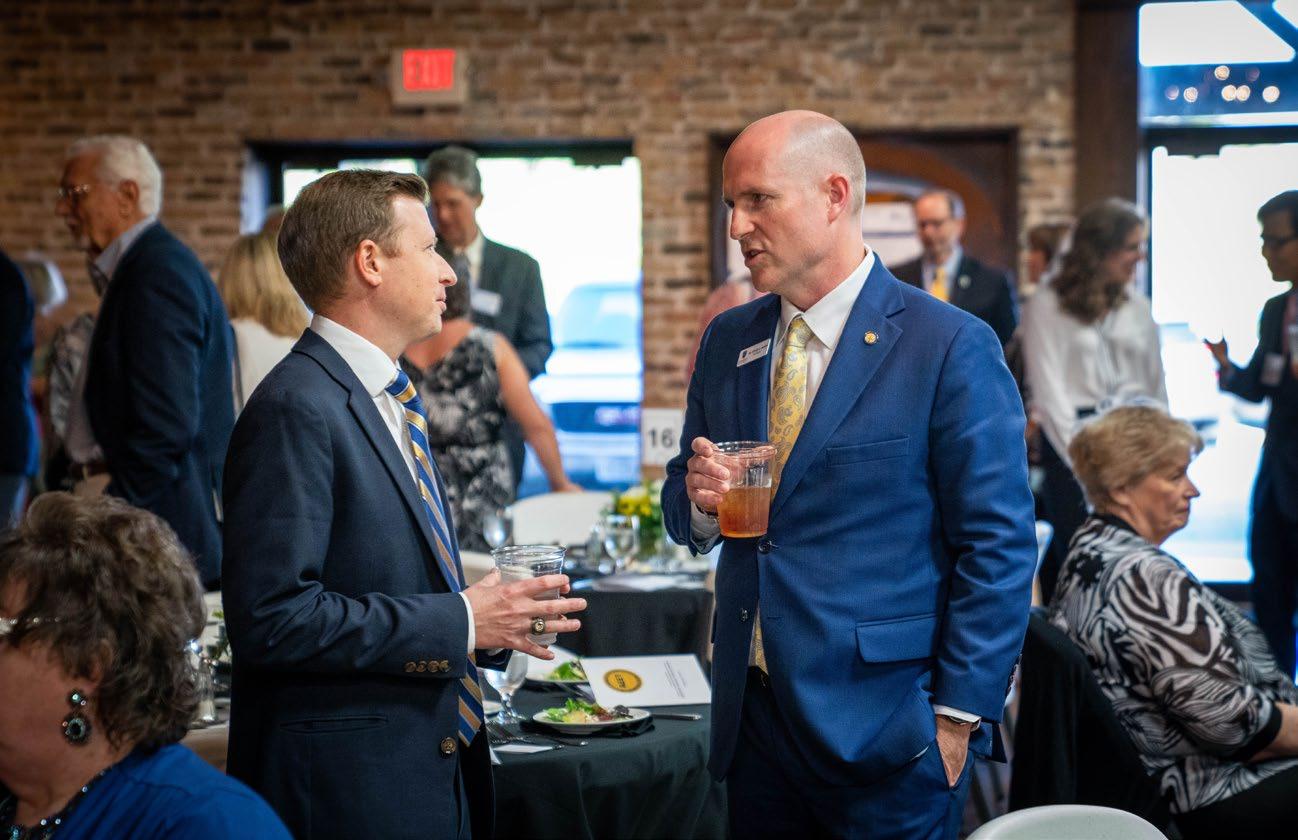
28 LETOURNEAU NOW
SANDRA MAYO, PH.D.
Associate Provost for Student Success & Dean of Nontraditional Education Professor of Education
Dr. Sandra Mayo joined LeTourneau University in July 2022 as Associate Provost for Student Success and Dean of Nontraditional Education. In this dual role, she facilitates the student academic experience and retention for both traditional and nontraditional students and leads the operational side of LETU’s online academic programs. Dr. Mayo has a strong background in adult education and academic leadership within the Council for Christian Colleges and Universities in a variety of roles and at multiple institutions having served as a faculty member, program director, and associate dean. Most recently, she served as vice provost at Seattle Pacific University.
Dr. Mayo holds a dual bachelor’s degree in English and sociology from Rutgers College, Rutgers University; a master’s degree in student personnel administration from Teacher’s College, Columbia University; and a doctorate in education from Claremont Graduate University. Her publications appear in the Journal of Higher Education and The International Christian Community for Teacher Education Journal. She is also a contributor to The Pedagogy of Shalom: Theory and Contemporary Issues of Faith-Based Education.

Outside of work, she enjoys hiking and cycling with her husband, Jon, and visiting their two adult children and four grandchildren in Colorado Springs.
The Draw
I’ve been in higher education my entire professional career, and in Christian education for the second half of that career. This is my third Christian institution, and I wanted to stay in Christian higher education. I’ve been on the academic leadership and academic operations side for a good portion of my career. I had stepped out to do some work on diversity on the academic side as well, and wanted to return to my first love for engaging students, being on the academic side, overseeing programs, providing oversight for curriculum and those kinds of things. But I really was just looking for a place that I could continue to contribute to Christian higher education. I had questioned whether that was where God would have me still, and wasn’t sure what that might look like. A priority for me was finding a place focused on the integration of faith and learning, a place with supportive leadership, and a place where I felt had the potential to really be an example for what Christian higher education can and should be in this moment in time.
I honestly didn’t know much about LeTourneau, but my husband and I were really considering moving to Texas for a number of reasons—closer to family, the climate was a draw—and came across the associate provost
position and started to read about LeTourneau. It was interesting; I submitted my application, and then was at a CCCU conference in Texas, and Dr. Mason and several others from LeTourneau were actually presenting on the white paper. I had read it prior to that, but I was also at the session and had the opportunity to really hear about the mission of LeTourneau. I was just drawn to the clarity of the mission. I was drawn to that commitment to preparing students for the workforce, so really seeing that combination of the liberal arts and vocation, and faith at the heart of that. I thought this was a really fresh but really understated example of what Christian higher education could be. It piqued my interest even more. I then had the chance to interview, and as I was interviewing, I was even more intrigued by the people. There was a humility that I was really drawn to and the clarity of where the institution was going.
I’ll be honest; I had almost given up on Christian higher education. I found myself inspired and had this renewed sense of hope when I interviewed at LeTourneau. And I think all of that has been true from what I’ve experienced so far. It’s a neat place. It’s such a gem, where you feel like you’re part of something bigger. And it’s a place where I simply
ACADEMIC MINISTRY
SPRING/SUMMER 2023 29
want to be able to serve. I’m so drawn to the institution, and I want to be able to serve here and use my gifts.
Builder as Utility Player
When I look back on my career in higher education, I have typically stepped into a new role or an emerging role— something that had been in existence but they’re rethinking it and asking me to come in and help them think about what it looks like. From my first position to this position, that’s kind of been a common feature. I’ve always described myself as a utility player. I have not had a real linear career path. But it’s always been, "Here’s a need. Are you willing to step in?" And I’ve always found that exciting because it does allow for some creative aspects to the work.
I feel like it’s very similar at LeTourneau. I feel I’m coming in at an exciting time because we have a long history in nontraditional education at LeTourneau. It’s gone through a lot of changes. It’s seen some great successes, and it’s had some moments where there are definitely opportunities for growth. I’m getting a chance to learn about every facet of nontraditional education and collaborate with departments across campus to really better understand what nontraditional education has looked like.
It’s given me the opportunity to work with a smaller team, dive into some of those areas, and think about where LeTourneau can meaningfully contribute uniquely in this space, which has become crowded in higher education. Most campuses are doing some form of nontraditional education or online learning, but we are committed to what our unique mission can contribute to that work. I think that’s the area of exploration and opportunity that I’m most excited about stepping into and being able to be a part of that larger conversation.
I’ve always enjoyed the creative aspect of building out a role, to hopefully build out something that will be lasting as an institution. Things will always change, but it’s nice when you establish a foundation that can be built upon. I enjoy problem-solving. I enjoy being collaborative, to really think about what is most needed to support students where the institution’s strength and mission really align.
The Redemptive Arc in Christian Higher Ed
I think that is what I find so lovely about Christian higher education. We are literally walking out that biblical narrative, that redemptive arc, and so even in the movement of our professional lives, we see that opportunity of God creating, God calling us, God moving us through brokenness, and God finding ways to redeem and to utilize the very gifts that He has given us. What I’m excited about is the opportunity to step into this role and hand it back to God and ask, "How do you want to use me in this? How can I be a vessel?" I’m learning to shift from focusing less exclusively on the job and more on "How can I be a vessel that God can do something with?"
So what that means in terms of reorienting my workday is to make sure that I’m tuning into Him, being attentive to how He’s speaking to me, how He’s moving, and the people He’s surrounded me with. I can be a very task-oriented person, but I have a deep love for people. I’m usually
The assignment
change, but your calling is your calling.
better one-on-one or in small groups. But the people that He brings around me, I know it’s intentional, so I want to pay attention to that. When you’re moved to your next assignment you don’t want to miss those pieces. LeTourneau is the place that is allowing me to sit in His presence and in His grace, to hopefully be obedient to the calling in this particular assignment, whatever that looks like. The assignment might change, but your calling is your calling.
Academic Ministry
I felt like it was a lot easier, in my discipline, in the classroom… that felt like academic ministry, because I was engaged directly with students in their learning, their professional development, and their spiritual formation. That translated really well. As an academic administrator I do see my role as the stewarding of resources to serve LeTourneau’s mission. And I do enjoy the fact that I get to be in conversations in which we are helping to define and shape the types of experiences students will encounter at LeTourneau—experiences that will bring them into direct relationship with God and help them identify their own vocation, their own calling, and ability to go out and be of service to God.
There are so many aspects of academic ministry. I think one of the main ones is stewarding resources to contribute meaningfully to the mission of LeTourneau in service to God. It's a gift to be in conversations with colleagues that will create the learning environment for students to flourish, and for faculty and staff to be able to flourish in their roles as well.
It is the stewardship piece, primarily, that I see in my role, navigating so many practical things that don’t necessarily feel like academic ministry, but get at the essence of it in their own way. I’m always thinking about how we can better resource and serve our staff and faculty—always thinking about how we care for people in real, tangible ways so that they can flourish. I love to think about professional development for staff and how to better serve them in their roles so they can grow professionally and not only continue to hone their skills but also find clarity in their own callings.
30 LETOURNEAU NOW
might
The Draw
With a background in the humanities, I’ve not historically worked closely with engineers or the especially technically minded folks, at least not large numbers of them. I think the challenge for that, the difference in that, is something I found appealing. I love problem-solving, and I like new challenges, so the unique character, the make-up of our faculty, that’s exciting to me. It still is. Really, the central part of the mission is everything. For me, everything flows from the mission. And the opportunity to engage in a interdenominational effort is an exceptional gift. To assist, support, and encourage the outstanding faculty and staff who bring it to life is even more of one.
The Balance of Being TCPU
There is a beautiful, healthy tension at a place like LeTourneau. Balance is what we’re seeking. Many working in the more technical programs in higher education, they struggle with what it means to be a university. They may not inherently champion the liberal arts, the general education, the "why do I need to take English comp and literature?" and "what value is a music or history or speech course?" sort of thinking. But our faculty get it. They do know that when engaging
SHANE MOUNTJOY, PH.D.
Associate Provost for Academic Administration & Dean of Faculty Professor of History
Dr. Mountjoy joined LeTourneau University in July 2022 as Associate Provost for Academic Administration & Dean of Faculty. He has a Ph.D. in Higher and Adult Education / Educational Leadership from the University of Missouri, as well as a Master of Arts in History from the University of Nebraska, and a Bachelor of Arts in History from Lubbock Christian University. He has taught undergraduate history and graduate leadership, served in student life and academic administration, participated in accreditation, and mentored college students for many years.
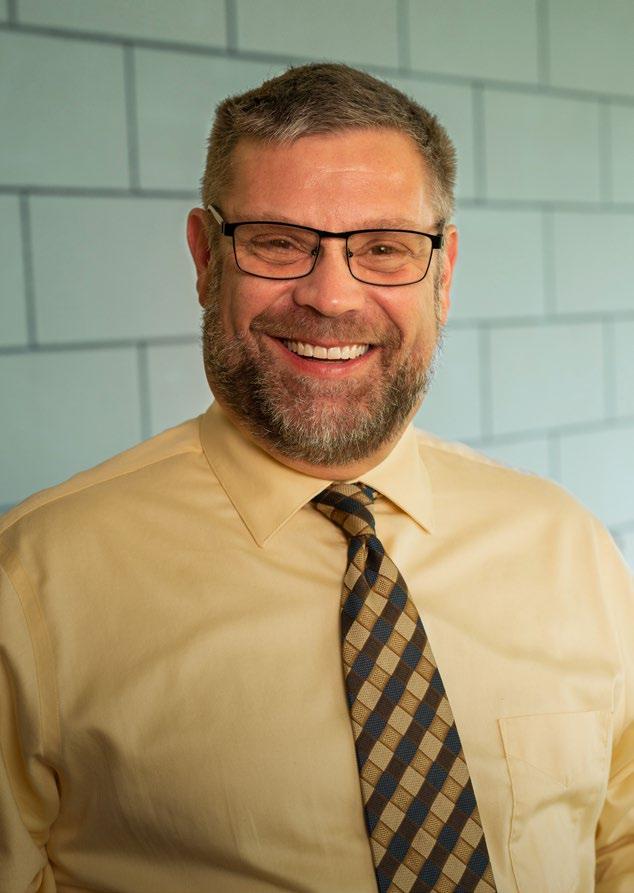
Dr. Mountjoy enjoys American History, especially 19th Century American History, including the rise of technology. He grew up in Northern Wisconsin and feels right at home in the Piney Woods of East Texas. He and his wife, Vivian, have been married for over 33 years and have four grown daughters. They enjoy the outdoors, have taken students on backpacking trips, worked at Christian camps, and love traveling to new places together. Their most recent hobby is beekeeping.
with industry employers who seek to hire our STEM students, one of the requests is, "Can your graduates communicate?"
I think they see the value in it even though it can often be overshadowed by some of the technical demands of the field. On the flip side—the liberal arts and humanities side—our faculty increasingly see great benefit in engaging students in their discipline in an environment where STEM, tech, and our flagship programs inform culture, questions, and industry-preparedness.
Embracing the Saga
My background is in history, so the fact that an institution has a story, that resonates with me. I believe that about any organization, that they’ve got a story to tell—a lived experience that tells where they’ve been and points where they’re headed. If there’s no reflection on it, there are no rudder changes. Which means you’re going to continue along on a particular path, on autopilot.
Some institutions will turn their back on their past; they’re ashamed of it. So, the white paper, the fact that it’s an embracing of our heritage, that story, speaks to the character of R.G. LeTourneau—as we all know him in some way, if we work here, and live out his dream here.
ACADEMIC MINISTRY
SPRING/SUMMER 2023 31
I think that speaks to R.G.'s character and to his vision. I like to think about some of things we do here in the context of his possible reactions. If he were alive today, what would he say? Maybe "Ah, that’s great, now why don’t we…?" He’d probably have some other innovative thought that he would want to add or tweak, to kick it up a notch.
Toward the end of the white paper, one of the things that President Mason writes about is what The Christian Polytechnic University means for the humanities and the liberal arts—the non-technical fields. I think it’s two-fold. He spends time looking at this in terms of how those fields interact with technology in today’s world, what it means to be technologically responsible. But the other question posed is, "What about hands-on?" If we’re going to live out R.G.’s mission and dream as he charted here, what does "hands-on" look like in history, or in government, or in English? Because that’s going to look different than in a science class or engineering lab. It’s really easy to "see" hands-on in those fields. It’s a little more difficult to get your hands on in the humanities. LeTourneau is doing that in those fields, and as we affirm these experiences, we are trying to adopt more shared language as we live it out. This is our contribution to the legacy of R.G. LeTourneau.
The Ministry of Faculty Formation
One of my roles is working with new faculty, including through our faculty formation programming. This involves meeting with the theology dean and chair throughout the spring semester and engaging in a course with assigned readings. This is essentially an abridged biblical theology class. If we are teaching our students about vocation and what that means in their fields, we must equip faculty with same language as students, so they can have those conversations for themselves and think through and try to live out vocation in their roles here. I’m so drawn to the concept of academic ministry, as I believe in this idea that we’re all ministers. We’re all engaged in a ministry. This is larger than any one of us, or one office, one program, one department. I love that; otherwise, it’s easy to get big-headed about what you’re doing. It helps everybody stay grounded and focused on the overall point of why we’re here.
Builders with Hearts of Humility
It will come as no surprise, as drawn as I am to LeTourneau University, that I’m hands-on in my role. Being boots-on-the-ground is in my nature. I manage that way, I lead that way, and I try to build relationships that way—and what a joy it is. The humility that I’ve experienced on campus is genuine. It’s something I picked up on during the interview. There is an abundance of critical thinking here, but not a critical spirit. Without humility there’s no real transparency, first of all, and I think most of us can sense when it’s not genuine.
The Authenticity of Academic Ministry
I think it’s important to live out and be your authentic self. Each of us has our own personality and different things. I led a life group this semester, and I did coffee pour overs for students each week, as a way of communing. I never want to lose connection with students, and that requires intentionally building connections with them, just as we invest in new faculty.
Part of that ministry, as it’s described in military chaplaincy, is a "ministry of presence." If you’re not there, then you can’t minister. I look at the ministry of Jesus, and how many times something comes up because he’s there, and because he stops everything to engage in that moment. He’s very present. And it’s not just physically being present, although you have to do that too, but it’s also being emotionally present in the lives of people.
It’s the approach I tried to take in my years overseeing student life. It’s what I always challenged our residence life folks to be: present. A resident assistant can’t make much of a difference if they’re never in the hall. A resident director loses impact if they’re never there. But it applies to any position.
For me, the student experience is everything. When we vet institutional priorities and decisions, we have to assure they are consistent with the mission, and then the next big check box in my mind is whether they improve the student experience. In areas that directly report to me, the library and registrar’s office, the work has to be about the student experience. That’s why we’re here, right? We pray for them, for God to send them here. He brings them here, and we want to be good stewards of that opportunity.
The Ultimate Opportunity
When I went to college, I fell in love with Christian higher education. It’s where I knew I wanted to be. All I could see then was that I wanted to teach, but after I’d been teaching for a few years, I decided I might be interested in doing more. The president at the institution where I worked at the time was an encouraging voice about continuing my education and developing the skillsets needed to bless people in this space. That’s why in higher ed, I wanted to get equipped to do more than just teach in a classroom, which is critical, but I really wanted to work with people and help them maximize the opportunities they have as faculty. Getting the opportunity to bring that dream to fruition is a lifegiving way to pour into others for the betterment of God’s kingdom—in a way that has an unknowable ripple effect.
32 LETOURNEAU NOW
… it’s a ‘ministry of presence.’ If you’re not there, then you can’t minister. I look at the ministry of Jesus, and how many times something comes up because He’s there, and because He stops everything to engage in that moment.
A Ministry of Presence
The presence and care exhibited in the stewardship of academic ministry is only one facet of how this phrase presents on campus. The care that surrounds and supports LeTourneau University students extends far beyond the pursuit of their academic goals—to their vocation, well-being, and spiritual development. Holistic care may not be unusual for a Christian university, but the way it comes to life at The Christian Polytechnic University is a different matter. The growth that stems from conversations on dorm floors, in tutoring sessions, and in interactions with Student Life staff and student leaders is not just nurturing. It’s sustaining, because it flows from faithinformed lovingkindness, compassion, and Christ-like care. It’s a combination of dig-deep experiential learning and authentic relational connection that builds solid foundations and lasts a lifetime.
SPRING/SUMMER 2023 33
ACADEMIC MINISTRY
KRISTY MORGAN PH.D.

When most people think about Student Life at LeTourneau, they tend to remember things like Hootenanny or Yellowjacket Activities Club events or intramural sports, which are all important aspects of engagement and belonging that Student Life fosters among our students. We want our students to make this place their home, to make good friends and feel supported on campus, and to have fun at college, and we take pride in making that last one a priority.
We also know that students enroll at LETU for a quality academic experience. Our students take their education seriously; they have been excellent students prior to attending college and plan to continue being excellent students here. Academics at the college level can be intimidating to anyone, and programs at LETU are rigorous by design. Student Life has always sought to attend to the holistic well-being of students, that is students’ mental, emotional, social, intellectual, and spiritual health. Because of the impact of a student’s academic life on all other areas of their lives, Student Life has increasingly served an important role in supporting the academic success of our students.
In the coming articles, you will read about some of the programs that help to support student academic achievement, and more importantly, you will meet some of the professional staff and exceptional student workers who help to make these programs accessible, effective, and transformational for many of our students. Among the programs Student Life delivers to support the academic success of our students and assist faculty are:
• Peer Advisors: Upper-level mentors assigned to support new students within their majors.
• Tutoring: Available and free for all subjects with current students as tutors.
• Supplemental Instruction: Free intensive tutoring for some of LeTourneau’s most challenging courses across various majors. Taught by a student who has recently taken and successfully completed the course. On average, students who participate in SI score 15 points higher in the course than those who do not.
• Math Lab: Open five nights a week, the Math Lab provides free tutoring support for all math classes on a drop-in basis.
PHOTOGRAPHY BY SARA BRYAN & JAKE HALL THE POLYTECHNIC WAY 34 LETOURNEAU NOW
• Writing Center: Open five nights a week, the Writing Center provides free writing support for all classes on a drop-in basis or by appointment.
• Time Management and Academic Coaching: Free coaching on test taking, time management, and other academic strategies.
• Mentoring for Students on Academic Probation: Support and coaching for students on academic probation to help improve academic performance.
• Disability Support Services: Administration of accommodations for documented disabilities.
• Bridges Program for Students with Autism: Wraparound support program for students with autism to support all aspects of their college experience.
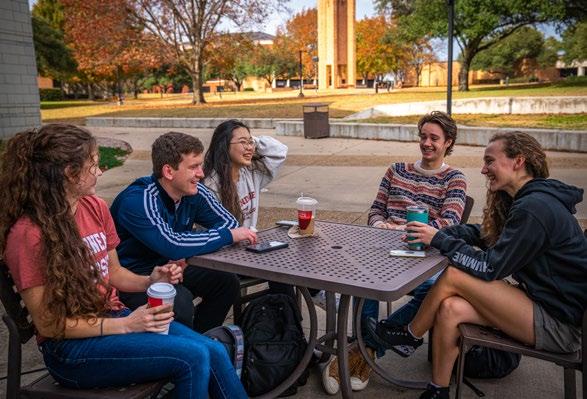
Student Life takes joy in partnering with the campus to support and encourage the academic success of our students. I hope you enjoy learning more about the good work our staff and student workers consistently provide to care for the academic needs of our students.
Next level care
LeTourneau University cares deeply about our students' holistic development and wellness. We know that for students to be successful academically, support must also be offered for their emotional, social, physical, and intellectual concerns. Because of this, LETU has designated a cross-functional team to provide confidential assistance to students that is known as the Campus Assessment, Response, and Evaluation (CARE) Team.
The CARE Team identifies, assesses, and mitigates risks associated with students who exhibit concerning behaviors, or who face hardships. The CARE Team partners with members of the campus and Longview community to support students’ wellbeing and success.

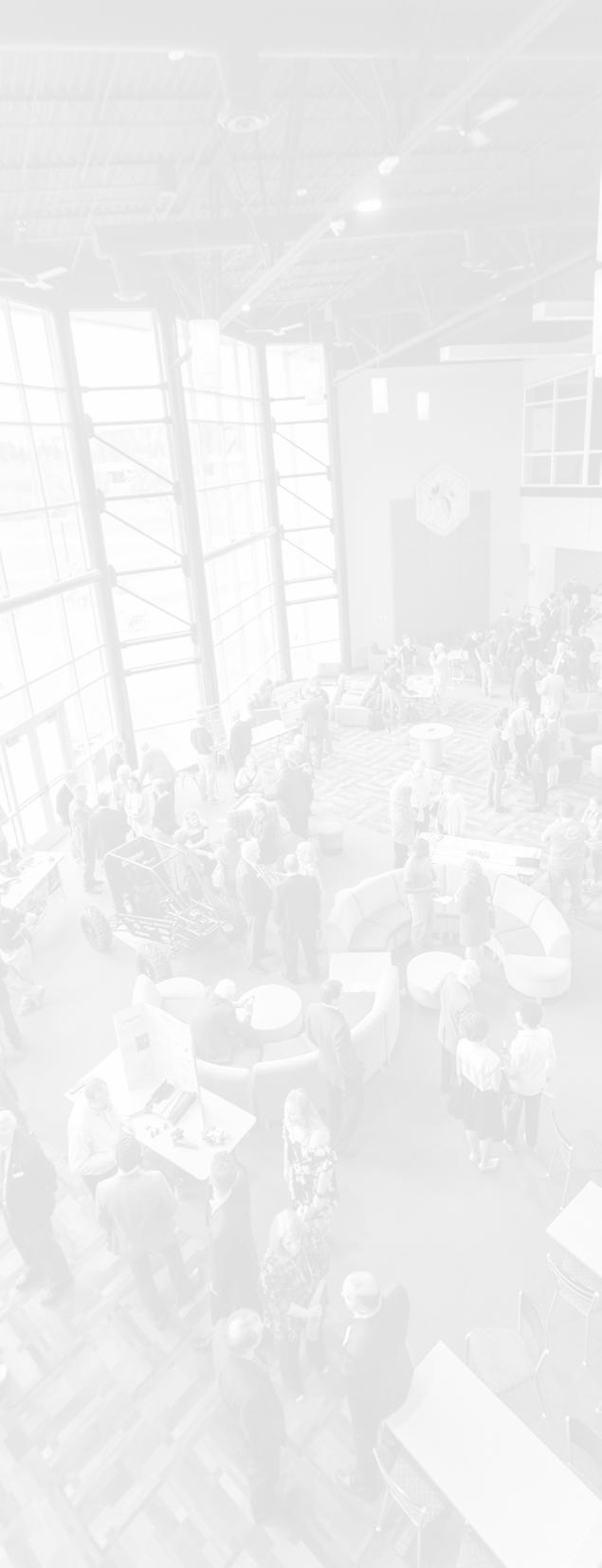
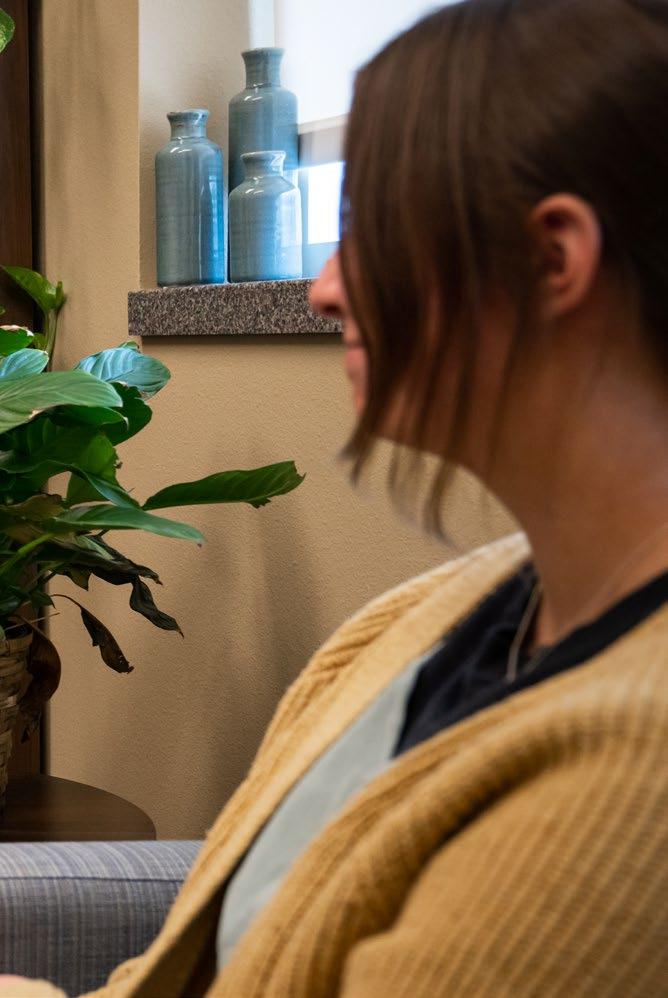
SPRING/SUMMER 2023 35
DEVIN HUNT
ACADEMIC MINISTRY
Resident Assistant Thomas Hall, 3rd Floor Aviation Management ('23)
What has been the most memorable part of your LETU experience?
There is never a dull moment on my floor; we’re always running around and doing something crazy. We drive around at two o’clock in the morning, go on ice cream runs to Andy’s, or go to Waffle House. These hangouts have definitely been the most enjoyable part of college.
What do you enjoy about being an RA?
I enjoy being able to impact the guys’ lives in whatever way I can, especially the freshmen since they are coming into a new environment. My experience as a freshman was difficult because it was during COVID-19, so there were a lot of restrictions and not as many people around. My RA’s were cool but they had lives of their own, so I decided to just stay in my room all the time. But, now I

really love being an RA and giving the guys on my floor a better experience than I had as a freshman. I don’t want them to feel like they’ve been thrown into a place they are completely unfamiliar with—I want them to be able to adjust well from home life to college life.
What do you like about working with your Resident Director?
Aaron Powell is awesome! He is very charismatic and shows that he really cares about the guys in Thomas Hall. He’s always looking out for ways he can help. We have one-on-one meetings every other week, and he’s willing to just listen to me. He is ready to help the RA’s out as well as the students, he always says hi when we see him in the lobby, and he has developed a good name for himself around the floor and around campus. People love him, and he is so kindhearted.
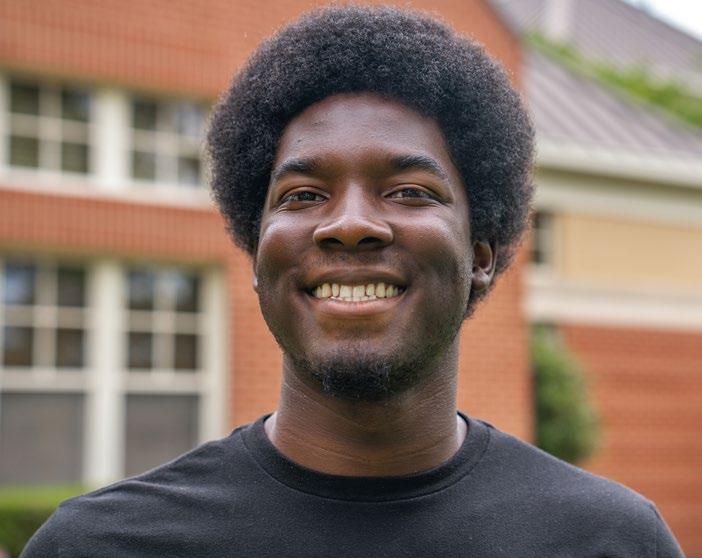
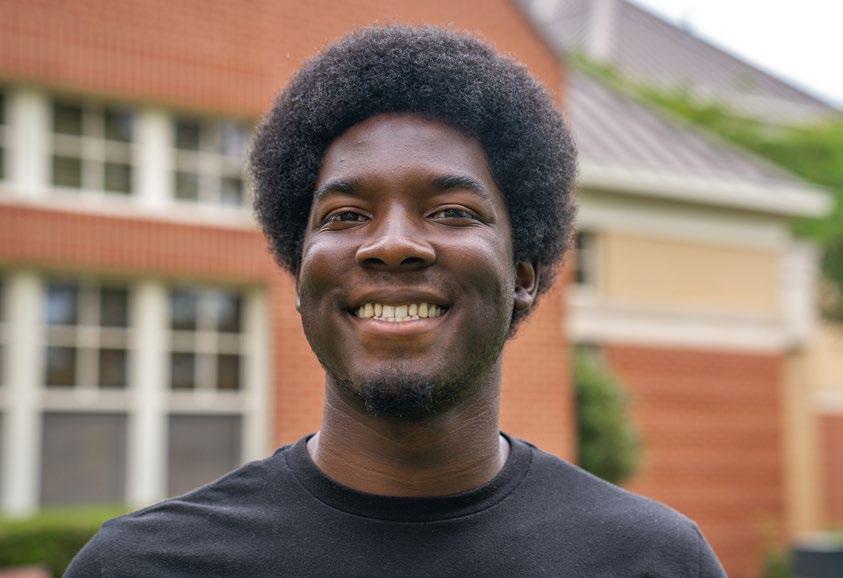
Tell us about your experience working for Residence Life.
I enjoy residence life: they are always there for the RA’s as well. We have monthly meetings where they serve us food and lots of RA training. We have an upcoming event about stepping out in uncomfortable areas that is geared towards some of the graduating seniors and students going into internships or new environments. They are always trying to help us develop in some way, shape, or form.
They genuinely care about us and want to help us grow professionally and spiritually.
What challenges have you faced in this position?
The hardest part would probably be not getting distracted by other things that may feel or seem more important. I’m a senior, so l’m preparing to graduate and go into the real world. It’s difficult focusing on that and all my classes while also taking care of the guys on my floor. I run a side business, and I was getting so consumed by that over the past semester. One of my guys was like, “Devin, we miss you man!” I realized I needed to balance working with fulfilling my duties to the floor. They do have their own lives, but I’m still the RA and have to make sure I’m there for all of them.
What’s special or unique about your floor?
At almost any time, I can step out onto the floor and find a horde of guys sitting around and goofing off. We have these water guns, and sometimes I come back and my door has a bunch of residue on it from these little water pellets. One by one, guys will come out of their rooms until we have a ton of us hanging around, and we’ll start a water gun or a nerf war. Things escalate so quickly! There is always something going on, and it’s really unique.
PHOTOGRAPHY BY JAKE HALL
PHOEBE OSAY
Spiritual Life Assistant South Hall, iHouse (International Student Floor) Nursing ('24)
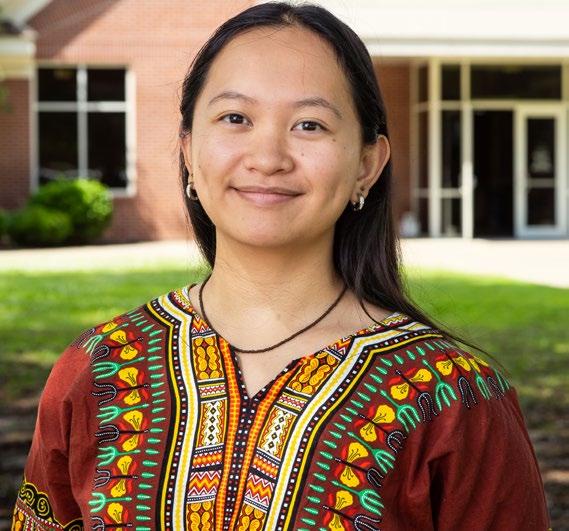
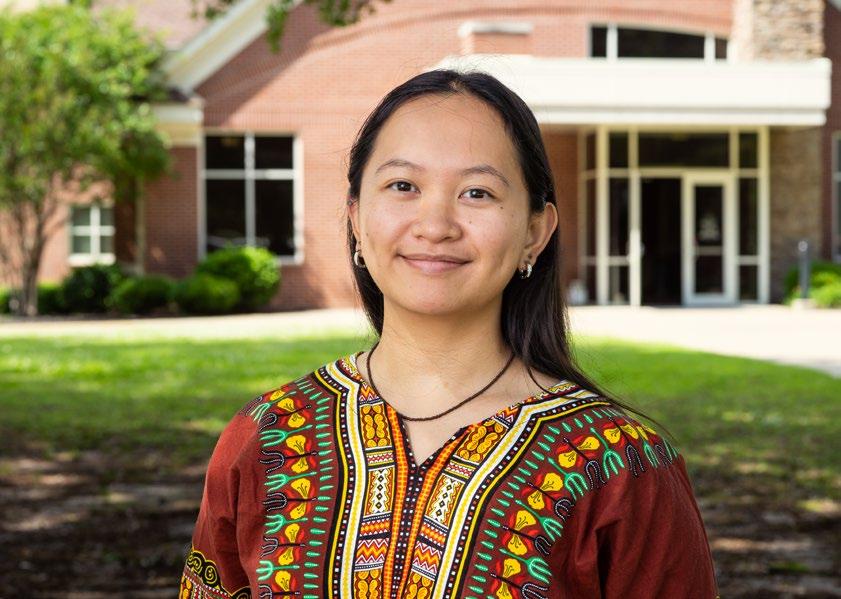
A Spiritual Life Assistant (SLA) is an IMPACT student leader position that was previously known as a floor chaplain. SLAs are designated for each campus living area (just like RAs) and are responsible for encouraging spiritual growth in the lives of their students. They provide counsel and encouragement while planning and directing activities like weekly floor devotionals that foster the spiritual life of the living area.
What do you enjoy about being an SLA?
I suppose the most common answer is being able to talk to the girls on the floor at a deeper level, but I really enjoy seeing new faces at our weekly floor devotionals! Those are always the most interesting conversations! I also highly value the personal stories shared among people on the floor. Having people brave enough to share something vulnerable is the most significant story I’ve witnessed as an SLA.
What are some of the most memorable experiences you have with your floor?
Lake days with iHouse are always memorable, fun times with good people! With lake day, it’s always nice to have a break from assignments and enjoy each other’s presence.

What’s special or unique about your floor?
The community, the liveliness, etc. iHouse is a very lively crew! The girls on the floor are what make iHouse awesomely unique! I’m definitely not biased, haha.
Tell me about your experience on Spring Break Mission:
I went on the Beach Reach mission trip to South Padre Island where we minister to spring breakers there, witnessing to them and keeping them safe by giving out free van rides.
Beach Reach is an experience in and of itself. No words can encapsulate how much Christ moved in the hearts of not only the spring breakers but also in the lives of the beach reachers and myself.
What are some things you learned from Beach Reach that you can incorporate as an SLA on your floor?
One of the main elements of Beach Reach is a heavy emphasis on prayer. We spend so much time asking God to move on the island or for specific requests. So, I would like to incorporate more prayer onto the floor like meeting together in our lounge at the beginning of the week and praying. For whoever wants to participate, if I’m by myself or with a group, we pray over the week, personal struggles, and prayer about getting through the day. Whatever it may be, starting the week with prayer can allow us to reflect and feel rejuvenated and refreshed.
PHOTOGRAPHY BY SARA BRYAN
Starting the week with prayer can allow us to reflect and feel rejuvenated and refreshed.
SPRING/SUMMER 2023 37
STEVE CONN PH.D.
All freshmen students are enrolled in LETU 1101, “Cornerstones of Life and Learning.” Cornerstones is a class, but it’s also a support group, a place to connect with your peers and faculty, a place to be seen and noticed.
Freshmen are organized into Cornerstones groups by academic discipline: flight majors with flight majors, nursing students with nursing students, and so on. These sections are taught by core faculty from within the discipline with the added bonus of an older
student from the same major (a Peer Advisor, or PA for short) who serves as a teacher’s assistant in the class and a friend/mentor/ coach outside of class.
The purpose of Cornerstones is to help students succeed in college spiritually, academically, and socially, and it covers a wide array of topics. Questions in class range from “How do I log into my email?” to “What does it mean to be a Christian?” and everything in-between. My goal for Cornerstones is for students to develop an authentic connection with their peers and to the university. These connections are what drive student success: students are much more likely to seek out or value the help of others when they feel connected to a loving and supportive community.
Another way we serve students is through Academic Check-In meetings. Throughout the semester, faculty report academic concerns about their students as well as grade reports after midterms. The Student Life
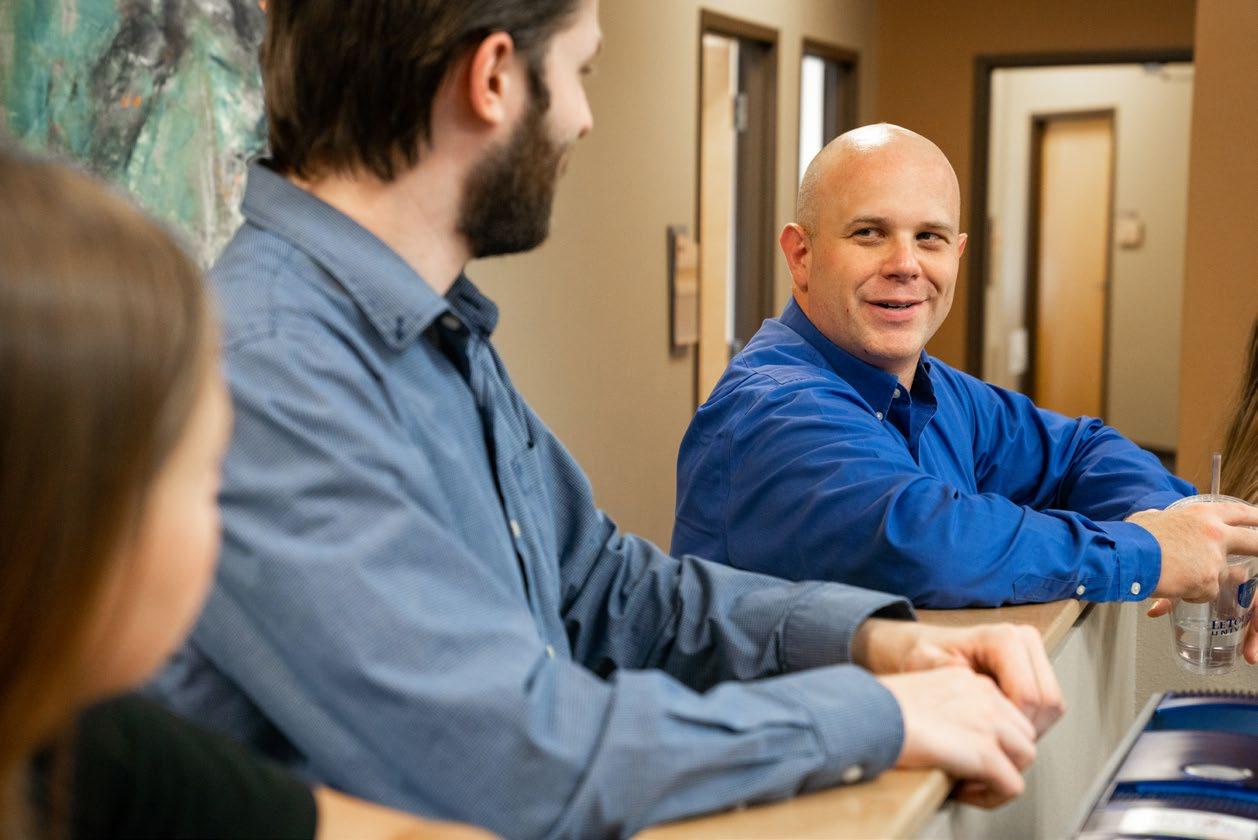
staff receives these reports and comments, then reaches out to students that might be struggling in class or in their personal lives. We connect students with resources like tutoring, the Writing Center, or the Center for Counseling. We also try to open a relationship with them and encourage them to speak up about any difficulties they are facing and how we might help. Through these meetings, we show students they are connected and supported, troubleshoot problems they are experiencing, and remove barriers to success.
Caring about student success is really just caring about students. We know we are stewards of their college experience, and we want it to be exceptional. We want them to have relationships, have fun, learn their disciplines, keep their scholarships, get great jobs, and most of all, grow to know God more deeply. Everything we do works toward these goals, and the Cornerstones experience and Academic Check-Ins help us achieve them.
ACADEMIC MINISTRY
My goal for Cornerstones is for students to develop an authentic connection with their peers and to the university.
38 LETOURNEAU NOW
DEBBIE MCGINNESS
Debbie McGinness has served as the Assistant Director for Academic Support, supervising the Math Lab, Tutoring, and Supplemental Instruction (SI) programs, for the last 13 years. This spring, she retired to a part-time role as Academic Support Specialist in the Achievement Center, helping students on academic probation.
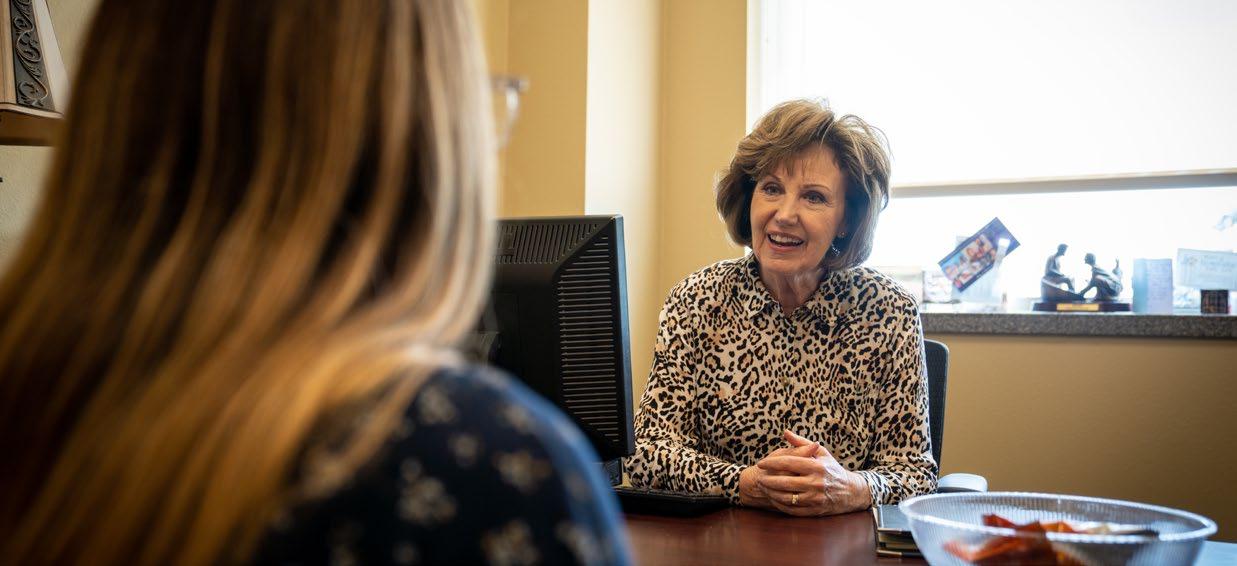
Debbie has impacted hundreds of students through her role, not to mention the impact of the supplemental instruction program (which was in its infancy when she took the job in 2009) has had on the university—a program she helped build from scratch through dedicated research and nationwide conferences on what other universities were doing. That impact is illustrated in the way multiple students and alumni describe her: caring, thoughtful, encouraging, "the greatest example I’ve seen of what servant leadership looks like." Her peers agree: she won the Gerrie Forbis Staff Excellence Award in 2019, an award whose recipients are chosen exclusively by university faculty and staff.
When you talk to Debbie about her time in this role and everything she’s seen, she exudes humility, deference, reverence for God and His work. She accomplished only what He allowed her to, what He prepared for her beforehand. It’s clear: everything she does is intertwined with Christ, and any praise given is directed towards Him and to the students who have grown and learned and changed the world around them. We sat down with her to learn more about the program. In her words:
What is Supplemental Instruction?
SI (Supplemental Instruction) is a peer-led program which provides study sessions during the week for rigorous courses. The SI leaders are students who have successfully completed a course and attend the class again as they lead, consulting closely with the professor of the course, then preparing for and leading the sessions on their own. SI provides an opportunity for students to come together to ask questions, to delve into a better understanding of the coursework, and hopefully, improve their grades. In the fall of 2022, 378 students were served through the program, consistent with the average number served in past semesters.
I believe, as Christians, that whatever we do, we should do the very best we can and for His glory. So, my goal for this program was to make it as efficient and helpful as possible. The backbone of the program is the strength of the SI leaders, so I really tried to search and find those students I felt would make a good fit and were the most qualified to teach (recommended to me by the professors and even other students). Always searching, always trying to find students who have an excellent command of the subject, good communication skills, and especially a desire to help other students—it’s a huge commitment. Over the years, many outstanding LeTourneau students have taken ownership of the position, going above and beyond what is asked of them.
Training Student Leaders
One of the key aspects of their training and one-on-one guidance is helping them know what and how to prepare for their sessions while making them as interactive as possible. So, in the training, I would show them ways to do the prep, but they do all of it on their own. Most of them are sitting through the class lectures and making notes of the key points, the most important and most difficult topics. Then, they cover those things in their sessions.
But, for problem-solving, they have to sit down and work through those problems to know what types of questions to ask students to help them walk through it. They do get guidance from the professor at times, but most of it is on them. It is not an easy role, and it is always rewarding to watch their confidence and abilities increase as they lead the sessions.
Even with the very capable students, there’s always a lot of nerves in that first session, and they are shaky at times. But, as I provide feedback—encouragement on what they are doing well and suggestions on how to improve—it’s so much fun to see in weeks two and three how confident they become in delivering their material. At the end of the semester, many of them remark on how much more confident they are taking questions in front of the group. And oftentimes, several students would say, "I really discovered how much I like teaching." God then used that opportunity to redirect their lives, which was very encouraging.
SPRING/SUMMER 2023 39
A Hopeful Ministry to Students
God confirmed over and over again, this is where I was supposed to be, this was the work I needed to be doing, and these were works He had prepared beforehand for me. As we hit different issues, I would lay those before Him and witness Him work those out. Many times, we would still be missing SI instructors for certain courses weeks after classes began. But I learned over the years that God would raise up and provide the students we needed: many of our best SI leaders were late hires, proof of His faithfulness to us.
Furthermore, working with these leaders and seeing how God was working in individual lives—through them, their service to other students, their selflessness, their commitment—has always been an inspiring faithbuilder for me. We have some really amazing students at LeTourneau who are focused on Christ, and I have always been encouraged knowing these students will be leaders in their fields as they graduate and demonstrate their faith in the workplace.
I strongly believe our work is worship, and I wanted them to see that. That this wasn’t something they were doing for me, but it reflects their walk and what they're doing. This program is a ministry because it builds relationships between the SI leaders, the students, and their professors. It is a win for the students who attend, the students who lead, and the university.
The main goal is assisting students with rigorous courses so they don’t feel stuck or alone—they’re with other students in the course and led by a student who’s already gone through it, to help them walk through the difficulties, to give them insight and tips. In time, hope is born out of that process: over and over, students make comments like, "I wouldn’t have made it through the course without SI." They have a place they can go, they don’t have to spin their wheels over something they’re not understanding, and that’s the ministry here: walking with and helping each other and building that community together.
Even though some roles are not very visible, the role you play can be very impactful in the lives of others. The role of developing and nurturing others is a great journey. I may not have realized that at the beginning, but I definitely realize it now, and the impact that can have over the years.
The things that will remain with me as I leave are my SI leaders—getting to know them, watching them grow and progress. Those are the things that stand out in my memory because I’m glad I was able to be a part of that, to hopefully impact them in a positive way.
making an impact
“During semesters in which we offer SI, I find that students struggle less with homework and perform better on exams.”
Dr. Deborah Blevins, Assistant Professor of Mathematics
"The SI’s serve as an excellent resource both for students who need extra help with the content as well as those who want to make sure they completely understand the content and are wanting the big ‘A’ in the class.”
Dr. Kimberly Quiett, RN, DNS, Dean, School of Nursing
“My experience as an SI was perhaps the most meaningful and impactful experience of my undergrad.”
Matthew Strong, 2023, Electrical & Computer Engineering
“If it were not for the SI sessions, I would not have fully understood my chemistry material enough to pass my tests. When I didn't attend a session, I noticed that I wouldn't do as well on the tests because I did not understand the material.”
Mikayla Benigni, 2025, Missions Aviation
“My instruction role helped me build confidence in myself at a critical point in my time at LeTourneau. If I can stand in front of a room full of peers and guide them through learning technical subject matter, what else can I do?”
Luke Funk, 2016, Biomedical Engineering
“When students attend SI sessions on a regular basis, their confidence improves, along with their overall attitude about the class. Students begin to feel more comfortable asking questions, and they begin to understand the big picture behind the subject matter rather than seeing only the individual homework sets.”
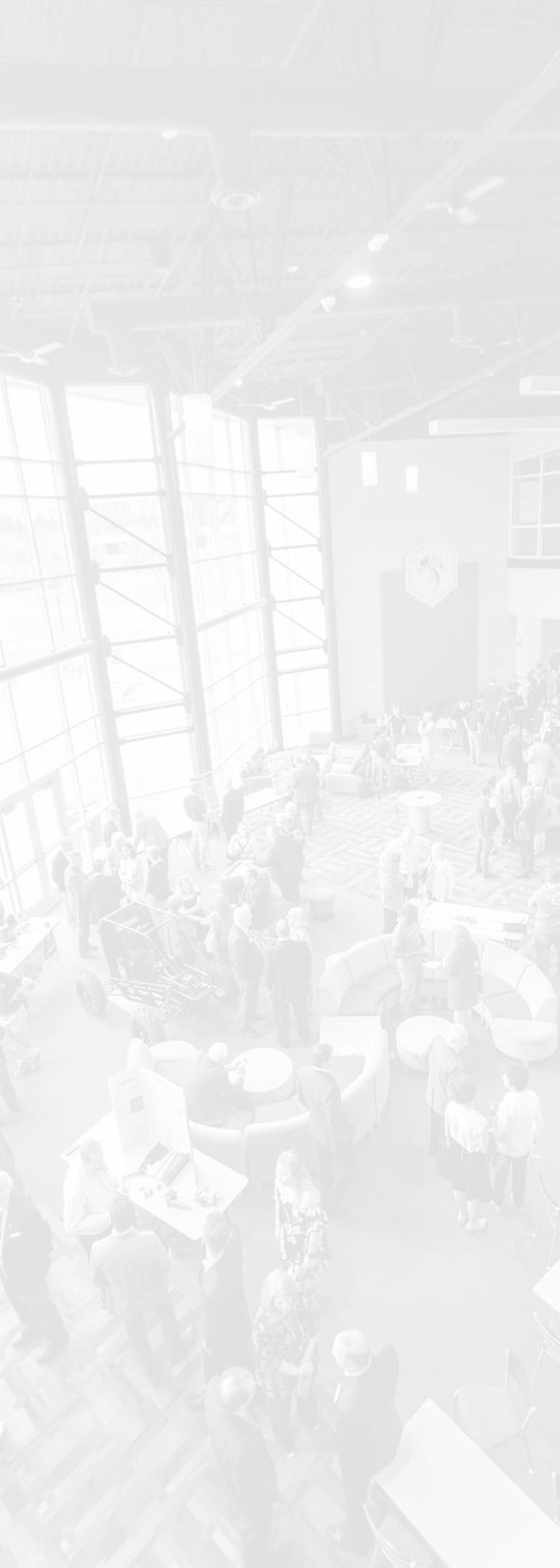
Natalie Neal, 2018, Electrical Engineering
“Being an SI really helped me realize how much I love to teach, and it certainly motivates me to be the best flight instructor I can be as I begin that role.”
Cole Charamella, 2023, Professional FlightAviation Maintenance
“Being a part of the SI program helped me grow in my leadership and service. It was a way for me to take what I had learned at LeTourneau and immediately use it to help others in their academic journey.”
Hannah Wheatley, 2022, Biology
God confirmed over and over again, this is where I was supposed to be, this was the work I needed to be doing, and these were works He had prepared beforehand for me.
ACADEMIC MINISTRY40 LETOURNEAU NOW
STEPHANIE BELL
Supplemental Instructor for Statics, Mechanics of Materials, & Structural Engineering Civil Engineering ('23)
Some of my best memories at LeTourneau involve the Supplemental Instruction (SI) program. SI not only provided academic support for me in some of the harder prerequisite courses, but it also provided me with a view of God’s heart and love for students. As both an SI leader and an attendee, I have seen the importance of peers leading other students through their academic journeys—they foster a warm, welcoming environment that only a fellow college student can provide.
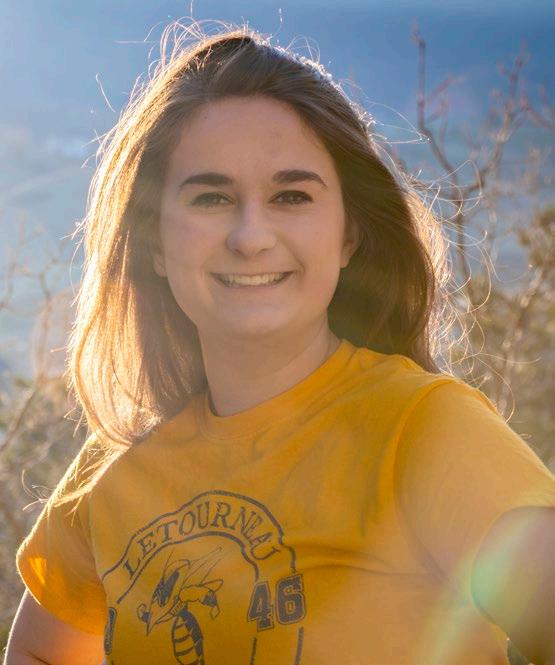
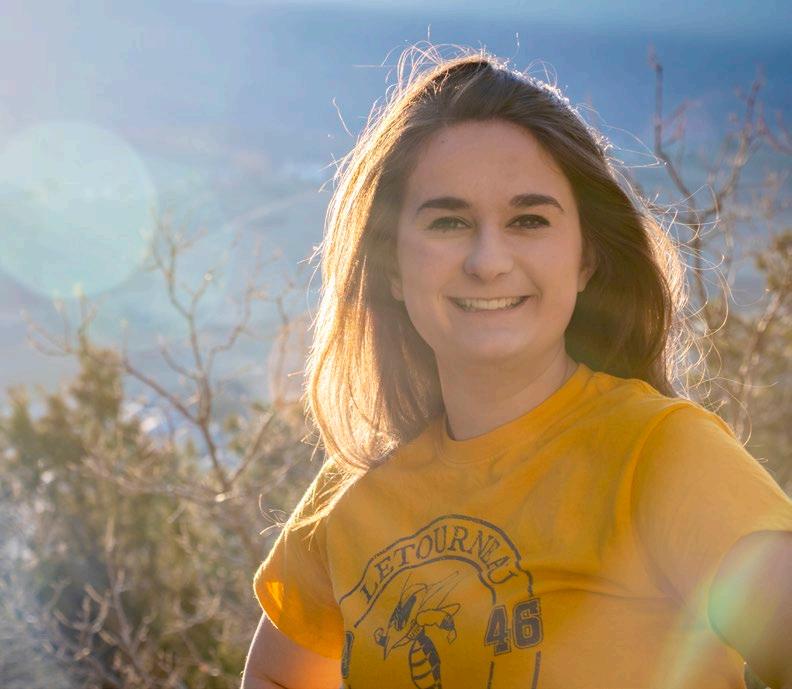
Now that I have had the opportunity to be an SI for four semesters, I have seen the immeasurable value in participating in the ministry of teaching. God has brought students into my life that I would not have interacted with otherwise. I will forever be grateful that the Lord has chosen to enrich my life in this way and to soften my heart towards people with various backgrounds. I have also been poured into as an SI—from the professors I have worked under and the leadership of the Achievement Center. The relationships I have been able to form have been influential for my personal, spiritual, and academic growth. I have also grown to love the tangible side: helping students succeed academically. While my goal is to care about
students in all areas of their lives, I practically do so by reinforcing hard topics that are presented in class and providing concept review in preparation for tests. Reflecting on my years as an SI, I can see how blessed I was to use my academic understanding to care for my students.
As a result of my time in this program and the relationships I have been able to grow, I have decided to pursue a Ph.D. in Civil Engineering with a concentration in Engineering Education. I plan to research ways to improve undergraduate education for engineering students and to prepare for a possible future teaching career. Being an SI helped me develop practical skills I could use in teaching (such as preparing for my sessions or learning how to answer unexpected questions) and provided the inspiration for my graduate studies and future career. My career dream now is to teach engineering mechanics or structural engineering at a small teaching institution. The Lord has shown me the beauty of investing in the lives of students through their academics, and I cannot imagine a more exciting or fulfilling job.
Much of the practical skills and theology of teaching I developed came from my numerous conversations with Mrs. Debbie
McGinness. When I think of Mrs. McGinness, I think of her warm smile and welcoming heart. She was always eager to express her love for the students who participated in the SI program—I don’t think you could have a conversation with her without wanting to join in her ministry of caring for students through the Achievement Center. Her love for the students was tangible and practical; it has become a large influence in my career aspirations and the way I view teaching as ministry now. Her impact in the Achievement Center will always be felt and celebrated.
SPRING/SUMMER 2023 41
SI not only provided academic support for me in some of the harder prerequisite courses, but it also provided me with a view of God’s heart and love for students.
JOSH BRAKE, PH.D.

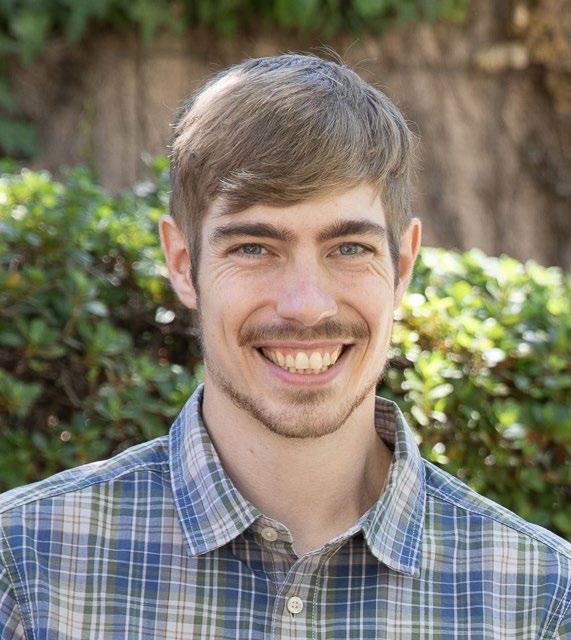
Electrical Engineering ('13)
Assistant Professor, College of Engineering, Harvey Mudd College, California
"You know Brother LeTourneau, God needs businessmen as well as preachers and missionaries." These words, spoken to R.G. amidst his search for calling and purpose, changed his life. They changed mine too.
Needing faithful servants in a variety of vocations is also connected to another idea that has significantly shaped me: Dr. Graff's devotional on the two-pot vs. one-pot system. Dr. Bill Graff, who faithfully served as a professor in LeTourneau’s engineering department for 42 years, was famous for many things, including his ties, fun-loving and quirky personality, tough grading, and kindness. However, in terms of his long-term influence on students, I’m not sure anything will top his library of short, before-class devotionals. These thought-provoking lessons cultivated questions about what it means to live a faithful life, memorably tying Biblical concepts together with engineering analogies.
The idea of the one-pot system, which emphasizes the importance of viewing all aspects of life as holy, has deeply formed my perspective on faith, daily life, and career choices. In the artificially dichotomous view of the two-pot system, the sacred and secular are separate and non-overlapping sets of activities. Things like reading scripture, prayer, and church attendance are squarely in the spiritual pot while the day-to-day activities of work, exercise, play, cooking, and cleaning the house are categorized as secular. Through this lens, the life of the faithful Christian is one of competition. Is it holier for me to eat and exercise or should I spend my time praying, serving others, and meditating on scripture?
In stark contrast, the one-pot system rejects the false divide between the sacred and secular and sees the world through an allencompassing lens. In the words of Abraham Kuyper, “There is not a square inch in the whole domain of our human existence over which Christ, who is Sovereign over all, does not cry: ‘Mine!’” ("Sphere Sovereignty" Free University inauguration address, 20 Oct. 1880) My experience at LeTourneau planted the seeds of this integration that have been bearing fruit in my life ever since. The Supplemental Instruction (SI) program was particularly instrumental in helping me work out what it means to be in partnership with God. Through the SI program, I discovered gifts God had given me to steward and saw how their exercise could not only be fulfilling for me but also offered in ministry to others.
SI is an academic support model built on peer learning. In contrast to other modes of support such as office hours offered by the course professor or tutoring sessions for specific students, SI sessions are organized and led by students who have previously taken a course and demonstrated an aptitude for the material. SI leaders typically offer two to three hours of dedicated support each week. The format of the sessions is varied based on the course and the needs of the students who attend, but in most of my sessions, I would give a brief review of the key concepts from the lectures that week and then work on practice problems or answer questions about the assigned homework.
While the main purpose of the program is to offer support to students currently enrolled in the course, they also provide significant opportunities for budding teachers
to test their wings and prototype a career in education. This was certainly my experience as an SI leader. After taking Electric Circuits with Dr. Graff in my first semester, I heard from one of my floor-mates about an opening for a new Supplemental Instruction leader for Electric Circuits I the next semester. After meeting with Debbie McGinness, who was in charge of coordinating the SI program, I was ready to explore what life was like teaching in front of a room.
Circuits I with Dr. Graff was no picnic. This is the guy, after all, who had a t-shirt with the line, “I fight grade inflation!” emblazoned on the front. Truer words have never been spoken. This certainly put me in a position of high demand with plenty of students looking for help understanding the material and preparing for Dr. Graff’s “surprise” pop quizzes (we quickly discovered that the only surprise was that we would have a pop quiz every day we walked into class).
Getting the chance to teach circuits as an SI leader was extremely meaningful. Not only did it provide me with a prototype experience for teaching but it also led to some of the most meaningful mentoring relationships of my time at LeTourneau, both with Dr. Graff and my research advisor, Dr. Seung Kim, who taught the class in a different semester. An added perk of being an SI leader was being paid to sit through the course lectures: I was able to see the circuits course material many times over, and I got a front-row seat to Dr. Graff’s devotionals year after year.
Starting out as an SI was a bit of an intimidating experience. Anyone who has gone from sitting in the audience to standing
ACADEMIC MINISTRY42 LETOURNEAU NOW
in front of the blank board will identify with the experience. But in the midst of the intimidation, I felt a deep sense of joy rooted in helping out fellow students as well as the deepening of my own knowledge and mastery of the course material.
After a few semesters of teaching circuits, I noticed a gap between what students took away from the material presented in lecture and what was available in the textbook. I decided to try to create something to fill the gap. I condensed the material from my minireview lectures that I gave at the beginning of my SI sessions into a series of tutorial-style problem-solving guides. My goal was to help students not only understand the theory of what was going on but visualize the step-bystep problem-solving process. After about a semester of work and some long weekends, I had the outline of my first “textbook,” The Engineer’s Guide to Circuit Analysis. While it was only about 50 pages long and the product of an eager and naïve undergraduate, Dr. Graff was my biggest cheerleader and even connected me with his contacts at McGraw-Hill to help me self-publish it. I had discovered a love of teaching, caringly cultivated in a community that not only encouraged me to grow but gave me chances to learn by doing.
The opportunity to teach as an undergraduate deeply shaped my path, ultimately leading to grad school. After graduating from LeTourneau and marrying my high school sweetheart in our hometown of Trumbull, CT, we departed on a cross-
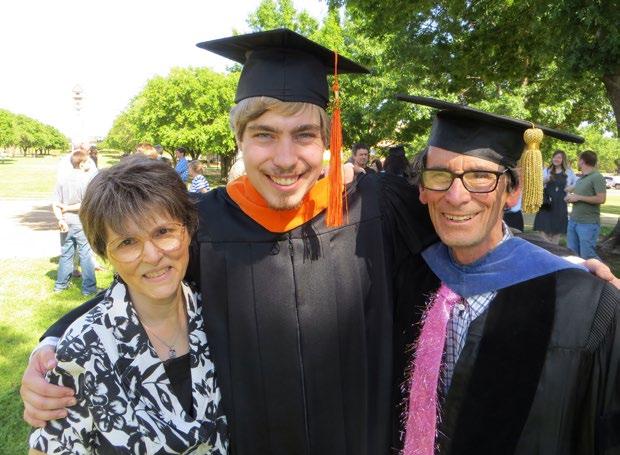
country journey to Southern California where I started my PhD program in Electrical Engineering at Caltech in Pasadena, CA. We stopped in Longview on our trip for me to defend the thesis for my Master of Science in Engineering at LeTourneau before continuing west.
The first words of my Ph.D. thesis are from Sir Isaac Newton: “If I have seen further it is by standing on the shoulders of giants.” This embodies the gratitude for the giants in my own past; a list of professors that are too many to name like Dr. Graff, Dr. Leiffer, Dr. J. Kim, and Dr. Gonzalez, as well as the cadre of other peers and staff like Debbie McGinness who had a profound impact on me. Each one had a role in shaping me into who I am today, supporting and nurturing me with their own unique God-given gifts and talents.
My experience at LeTourneau also offered me an opportunity in the formative years of undergrad to understand how I might faithfully steward my gifts in service to the Lord. "Every Workplace, Every Nation" is both prescriptive and descriptive. As children of God, we are called to extend His grace throughout our spheres of influence while at the same time realizing He is already present there. This is, in a way, living out Kuyper's claim: it all belongs to God.
After finishing up my Ph.D. at Caltech in 2019, I started a faculty position as an Assistant Professor of Engineering at Harvey Mudd College, a small liberal arts college in Claremont, CA, about 30 miles east of Los Angeles. My core values as a faculty member
are deeply shaped by my experience at LeTourneau. I would not be who I am today without the role models who showed me what it looks like to be a loving and supportive faculty member who puts students first. Dr. Graff showed me how to love students well without lowering standards. Dr. J. Kim showed me how to think big, embrace failure, and work hard for God. Dr. Leiffer showed me how to lead with kindness, compassion, and gentleness. And Debbie McGinness showed me how to walk alongside, support, and care for students.
As an electrical engineer who spent my Ph.D. studying optics, there are few concepts more beautiful to me than coherence. In short, coherence is about the synergistic combination of multiple individual contributions. Seeing the world as a one-pot system is the key to a coherent Christian life. It is both deeply satisfying and liberating. It frees us from needing to agonize about how we divide our time and helps us to see that God can be present even (and maybe especially) in what we view as mundane.
As Dorothy Sayers summarizes in her essay "Why Work?," "[W]ork is not, primarily, a thing one does to live, but the thing one lives to do. It is, or it should be, the full expression of the worker’s faculties, the thing in which he finds spiritual, mental and bodily satisfaction, and the medium in which he offers himself to God." The question is less about what we do with our careers and rather about how we faithfully partner with God in the places he calls us.
SPRING/SUMMER 2023 43
As children of God, we are called to extend His grace throughout our spheres of influence while at the same time realizing He is already present there.
NEW DEANS NEW DEANS
“Dr. Michael McGinnis joins the School of Engineering and Engineering Technology this July. Dr. McGinnis holds B.S. and M.S. degrees in Civil Engineering from the University of Connecticut and a Ph.D. in Civil Engineering from Lehigh University. He is an accomplished teacher—earning many recognitions for outstanding work in the classroom—and a successful researcher with numerous publications and grants. He has served at the University of Texas at Tyler since 2007 in a variety of roles, including Assistant, Associate, and full Professor; Associate Dean; Interim Dean; and most recently, Department Chair of Civil Engineering. He connects well with students and colleagues, is a committed Christian with an active faith, is passionate about our mission, and is a proven leader.”
—Ben Caldwell, Ph.D., Provost and Vice President for Academic Affairs
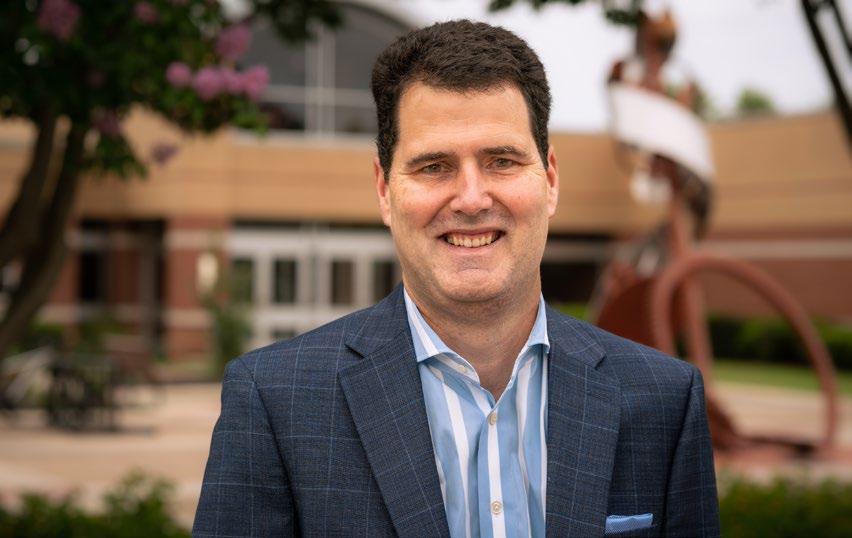
Here, Dr. McGinnis explores his own model of engineering education, in his own words:
“I have strongly championed a ‘T-shaped’ model for engineering education during my career. In this model, the top portion of the capital ‘T’ represents the ‘softer’ skills of the engineer, which perhaps might be better described as the professionalism skills. Examples include communication, grit, drive, leading, following, and ethics. The stem of the ‘T’ represents technical skills—examples include topics such as thermodynamics, heat transfer, structural analysis, engineering mechanics, reaction kinetics, etc. In both cases, these skills tend to get at the ‘how’ behind what engineers need to do to accomplish their goals and objectives.
What is so exciting about the opportunity at LeTourneau is that it allows me to reframe this metaphor to be a lower case ‘t.’ In this, the
DEAN, SCHOOL OF ENGINEERING AND ENGINEERING TECHNOLOGY

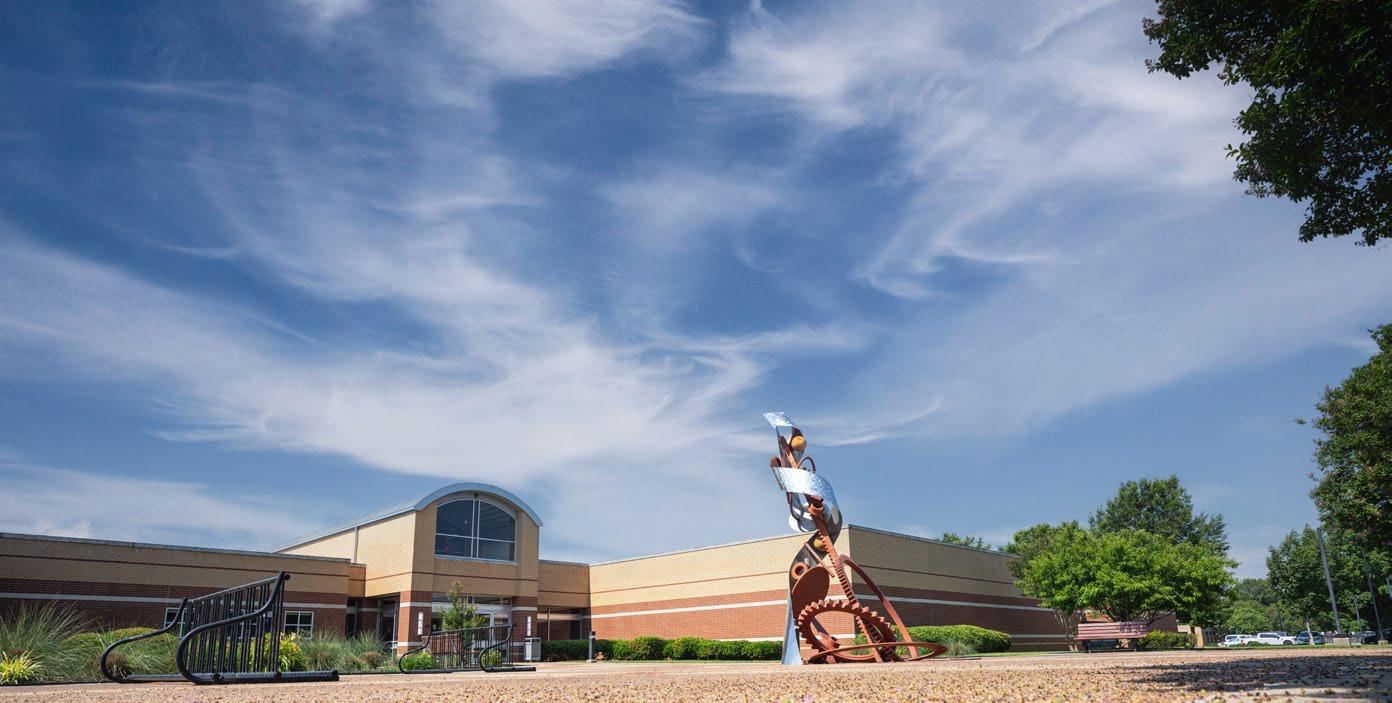
addition of the upper portion of the stem of the ‘t’ is used to represent God and the Christian ethos and guide for living and flourishing. I see this, then, as providing the ‘why’ of the mission of the engineer. This welcomes discussion and elaboration upon why we make the design and program decisions that we make in the engineering and technology field. Answering questions such as 'Who benefits?', 'Is this what God would have us do?', and 'Is this best for human flourishing?' would provide a strong anchor that makes all of my teaching more meaningful.
It is no accident that the ‘t’ in this model is both cross-shaped and lowercase. The cross points us towards Jesus, and the lower case points us toward humility in our engineering decisions and process.”
MICHAEL MCGINNIS, PH.D.
THE POLYTECHNIC WAY 44 LETOURNEAU NOW
The LeTourneau University academy welcomes two leaders this summer, both of whom bring exceptional faith-informed intention and expertise to their roles guiding the institution’s flagship programs. Join us in celebrating the arrival of Michael McGinnis, Ph.D., Dean of the School of Engineering and Engineering Technology, and the promotion of David Tesser, MCA, Dean of the College of Aviation & Aeronautical Science.
DAVID TESSER, MCA
DEAN, COLLEGE OF AVIATION AND AERONAUTICAL SCIENCE

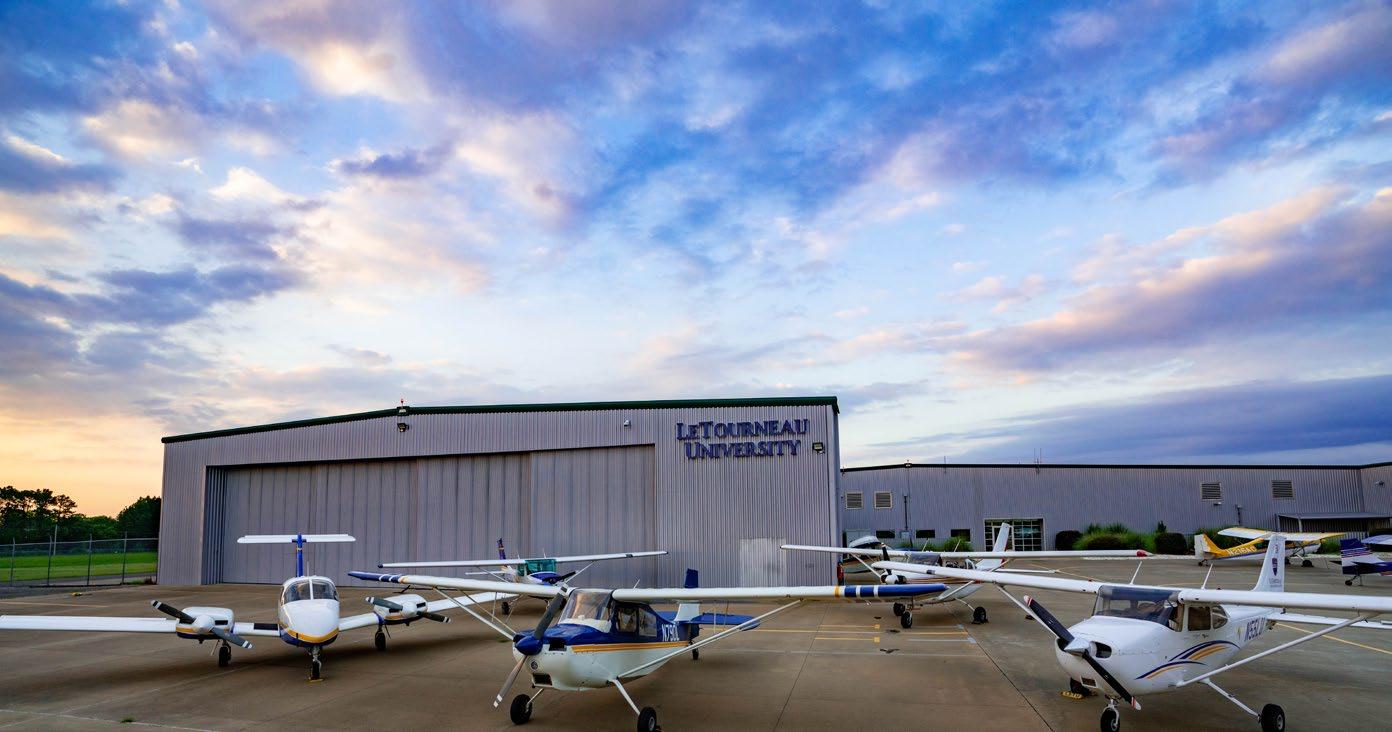
“As many of you know, David Tesser is a graduate of LeTourneau University, has faithfully served as a faculty member since 2014, and is currently Chair of the Department of Applied Aviation Sciences. He holds a Bachelor of Science in Aviation Technology / Flight from LETU and Master of Commercial Aviation from Delta State University. Mr. Tesser is regarded highly by his colleagues and is well loved by students. I’ve been impressed over the years with Mr. Tesser’s commitment to Christ; his desire to serve; his creative problem solving; and his relational approach to leadership. He has served the institution not only in the classroom, but also as chair, as interim Director of Maintenance, and in countless other ways.” —Ben
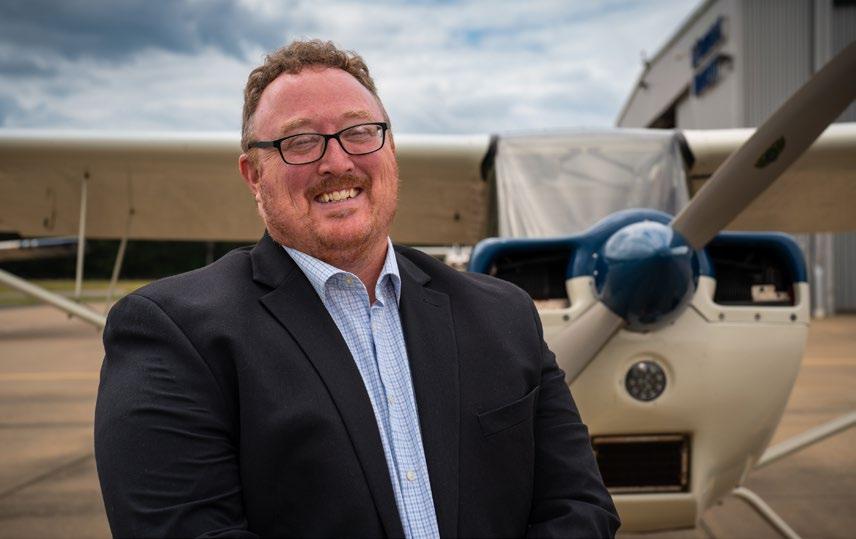 Caldwell, Ph.D., Provost and Vice President for Academic Affairs
Caldwell, Ph.D., Provost and Vice President for Academic Affairs
His approach to student care, in his own words:
“I continue to feel very blessed to have the opportunity on a daily basis in our classes and labs at LeTourneau to minister to our students. They need to be loved on, and they need to know that we care about them personally, spiritually, and professionally. They need to know that we pray for them and that we are available to them. I hope that my students are able to come to me when they have needs or questions and that they feel Christ's love when they are around me. We are serving as an example to our students about what the Christian walk looks like with our peers, our family, our co-workers, and even the people that we interact with daily in our community. I like the quote by Theodore Roosevelt, ‘People don't care how much you know until they know how much you care.’
Each semester at LeTourneau, I have been thinking through this question: How do we integrate faith and learning in a very technical environment? Sometimes it is through my devotions at the beginning of class, but most of the time it is something that just needs to be part of who I am and what I am teaching. Airplanes don't fly without the laws of God and the science behind those laws. This semester I have decided to study different characters in the Bible for the devotions in my classes. We are working through Job and Jonah in two of my classes. Both of these men had a different approach to following God. As I am working through questions in my own life, I like to share these same questions with my students because I think that they are often dealing with some of the same things.”
SPRING/SUMMER 2023 45
These students are chosen based on demonstrated excellence in academic achievement, sacrificial servant leadership on campus and beyond, generosity of time and resources, spiritual growth that was evidenced by a maturing faith in Jesus Christ, and the potential to be an effective ambassador for Christ in every workplace and in every nation.
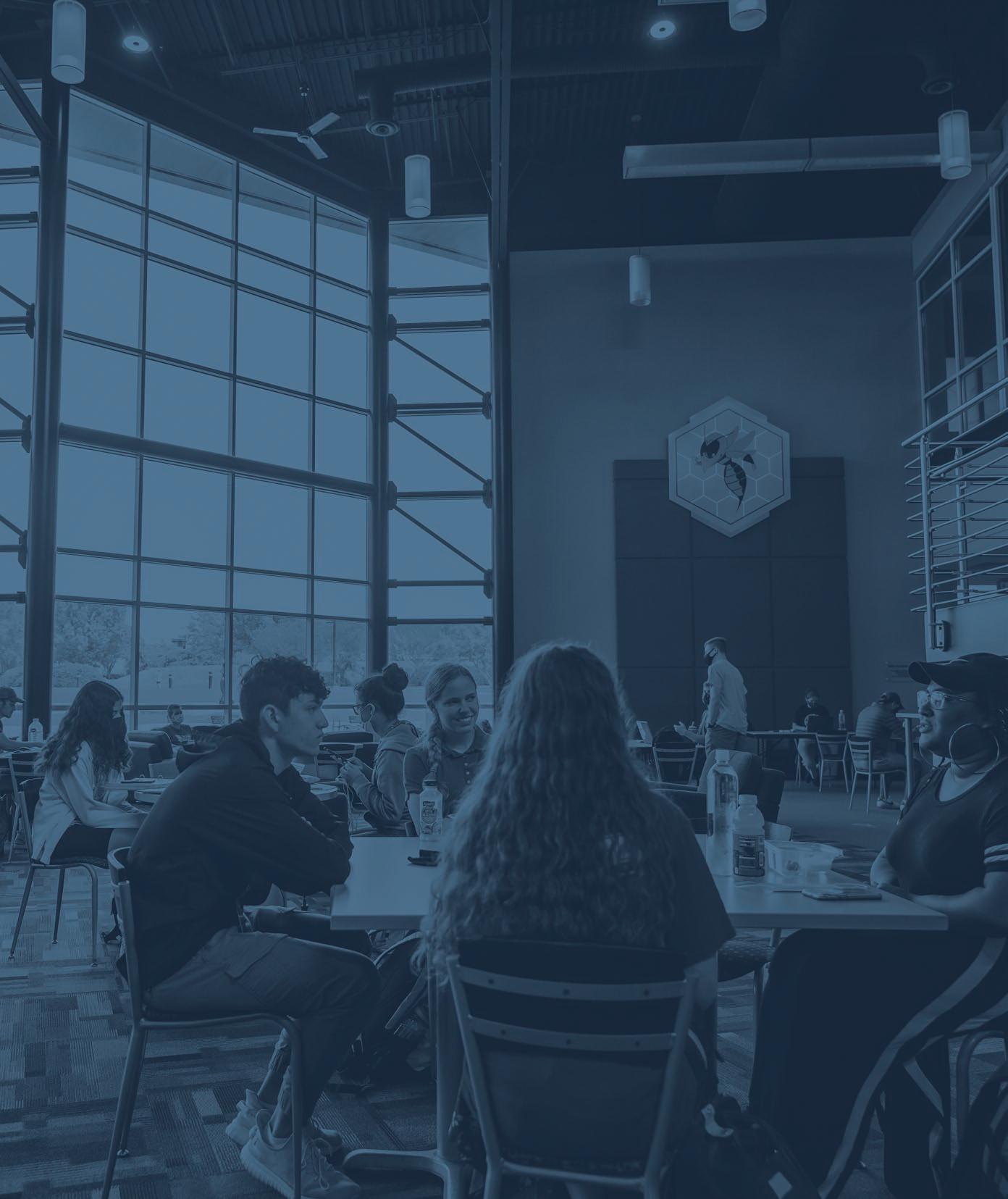
LETOURNEAU BUILT 46 LETOURNEAU NOW
CIVIL ENGINEERING
How was your experience during your time here as a student different than you expected?
Stephanie LeVI
BeLL BranSford
When I came in as a freshman, I expected college to be super academic focused, as if you have to always be doing homework. I thought I would never get a break or have the chance to talk to friends and build relationships. When I arrived here, I realized that was not the case. I was able to see that academics are a priority, but building relationships and investing in those Christian communities is even more important than academics. I recognized that I could talk with my friends and pray with them instead of doing chemistry homework or something similar constantly. It was truly unexpected that I was able to have good conversations at dinner and flourish in the relationships I made at LeTourneau. The faculty and staff here really care about the students building relationships and investing the entire person and not just the academic aspect.

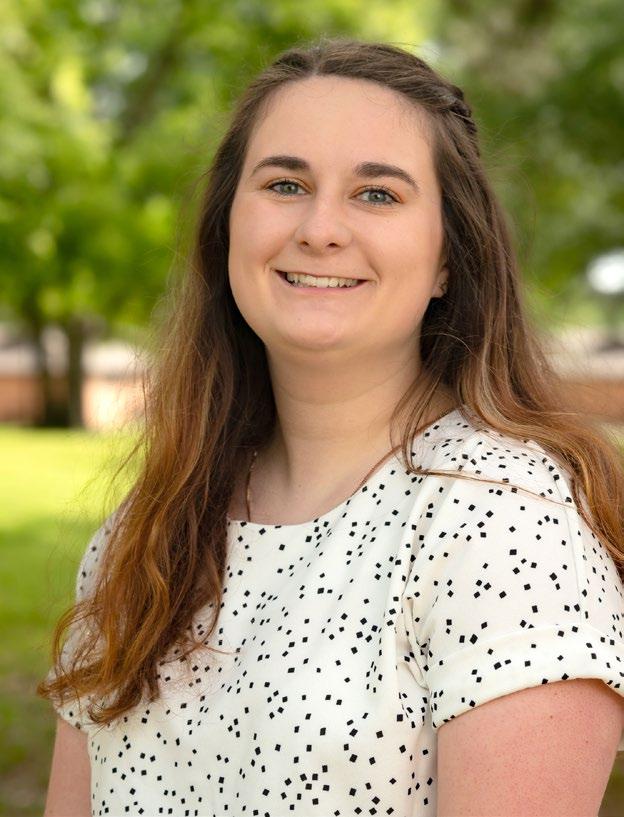
MECHANICAL ENGINEERING
What advice would you give to a high school student looking for a college?
If you’re interested in engineering, nursing, or aviation, LeTourneau is a great place to be. Even more than academics, the relationships and overall college experience has been the most valuable to me. I’d really encourage a prospective student to come visit because of that. I know all of my professors personally. I randomly see them on campus and strike up a conversation about non-academic topics. LeTourneau is a smaller university than others and coming from a smaller school before college, LeTourneau felt really big. I didn’t think I would connect with people well, but I’ve been able to connect with MuKappa, the other MKs (missionary kids), and the guys on my floor. It’s been refreshing finding a good place here. I would encourage any applicants looking for a good community of students and professors to come to LeTourneau. I’ve grown significantly from freshman to senior year even more than just academically.
SPRING/SUMMER 2023 47
PHOTOGRAPHY BY GRANT BRIDGMAN
CHRISTIAN MINSTRIES
Was there ever a time that was very difficult over the past four years and how did you get through it?
Being in college here was my first time being in the states. Honestly, the first year of transition was really hard especially being a missionary kid who grew up in different cultures. Transitioning to a completely different cultural place is always very tough and many changes to process at once so it was a challenge trying to navigate how to treat others, how others perceive me, and how I perceive others. Transitioning out of my comfort zone that I lived in in Africa with my parents to a place I’d never been before was rough culturally. One of the cool things that God did during those times was bringing in more community that I’d never expected with friends and professors. I even got plugged in at Longview Christian Church and that was a big thing God led me to. God brought me people that would encourage me and surround me with prayer and that helped me through the difficult times.

Lee Kerr
How was your experience during your time here as a student different than you expected?
I came to LeTourneau with healthy expectations, and while I achieved them, I didn’t realize how much the Lord would reveal himself through them. I really wanted to lead worship and become an RA. The Lord brought so many amazing people into my life who encouraged and mentored me through those things where I could learn what the Lord’s purpose was for worship and how to be a good role model to the girls on my floor. I was an RA during COVID-19 so I was able to support the girls with the different limitations we had. I was expecting us to spend lots of time with friends because my job was to bring people together. Even though we had our limitations, we were still able to make it through in our own way and still had great times together even in an unordinary circumstance. It really brought us together.

peter MIKIah
NURSING
48 LETOURNEAU NOW
addie
danieLS
CIVIL ENGINEERING
What advice would you give to a high school student looking for college?

Just do it! When I first started looking at colleges, I wanted to find one that would fit me financially. I toured LeTourneau and I remember feeling an overwhelming sense of peace. I remember telling my parents that it felt like home and where I needed to be. When you’re looking for a college, it’s important to know and understand the gifts that God has given to you and going to the Lord in prayer and asking Him where you belong and where he wants you to be. The decision of going to LeTourneau was very clear to me. While it’s not always that easy, you just have to be willing to walk through the open door. That was something I had to learn, and God really provided financially and checked my boxes for what I wanted for my college experience.

PHOTOGRAPHY BY GRANT BRIDGMAN SPRING/SUMMER 2023 49
individual sport,
individual sport,
By Kathleen Raske
LeTourneau University added the sports of indoor and outdoor track and field for both men and women in 2017-18 to an already established cross country team and now operates as one men’s/women’s track and field and cross country (TF/XC) program. As the director of the men’s and women’s TF/XC program, I have been incredibly blessed to work at a university that integrates Christian mission and athletics so well. It is an exciting time for LeTourneau and the athletics department under the leadership of our President, Dr. Steven D. Mason, Ph.D., and Vice President for Athletics, Dr. Tim Sceggel, Ed.D., as we look forward to the future growth of our TF/XC teams.
Since its inception, our program has developed on the national scene: LeTourneau has been represented in the NCAA Division III national championships for the past three years in both indoor and outdoor track and field, for both men and women. Notably, Jack Miller (pole vault) is a three-time All-American, and competed in the NCAA national championships yet again this spring. We currently have three athletes in the top twenty-five nationally, representing the pole vault, decathlon, and high hurdles.
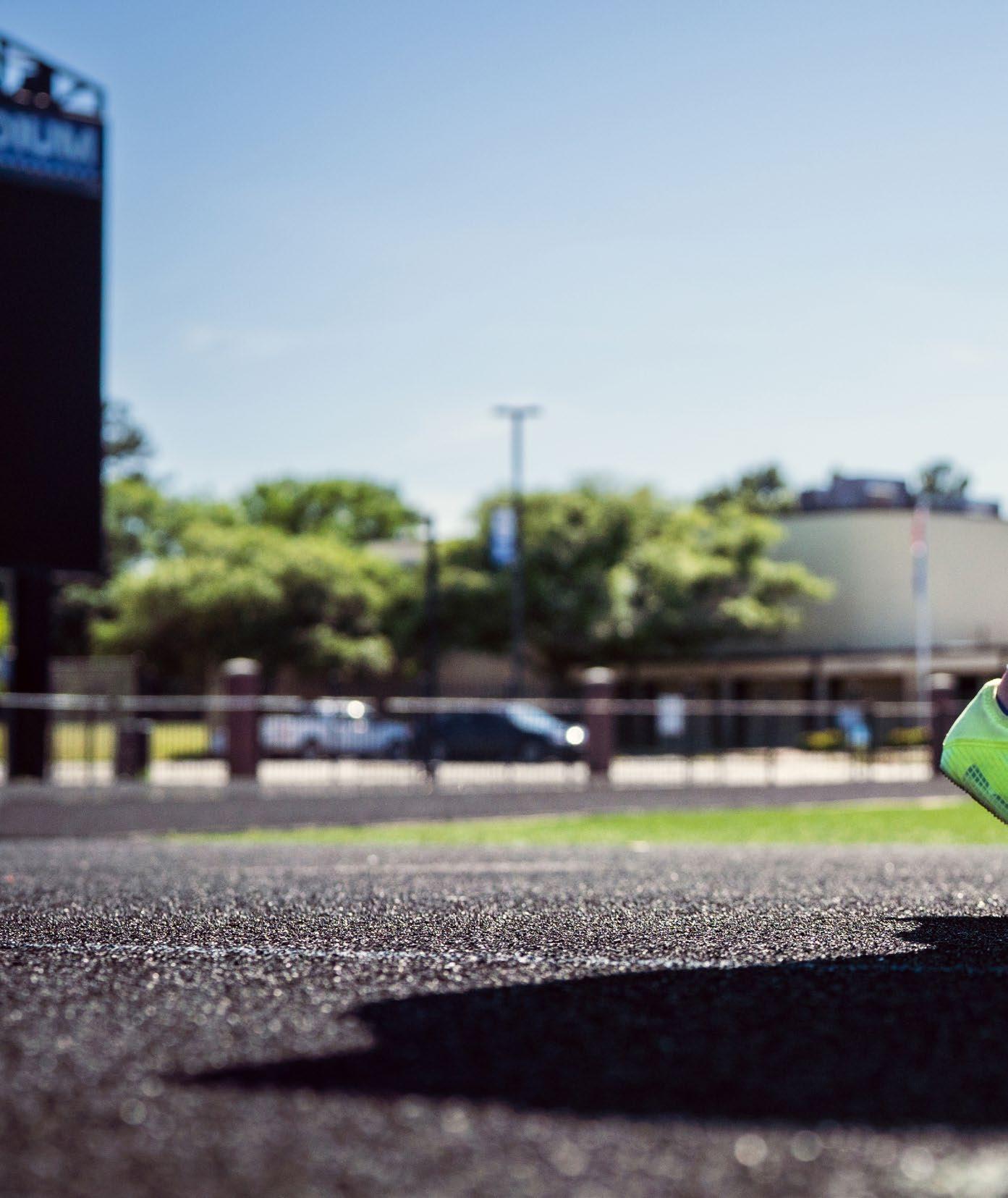
50 LETOURNEAU NOW
Unified Focus Unified Focus


PHOTOGRAPHY BY SARA BRYAN SPRING/SUMMER 2023 51
Kathleen Raske joined LeTourneau Athletics as the Director of Track & Field/ Cross Country in 2019 after 29 years of coaching at the NCAA Division I level. She has enjoyed a plethora of success throughout her career, including two top25 NCAA team finishes, coaching one individual NCAA Champion, 15 NCAA All-Americans, two Olympic Trials Medalists, and one Olympian (eighth-place finish).
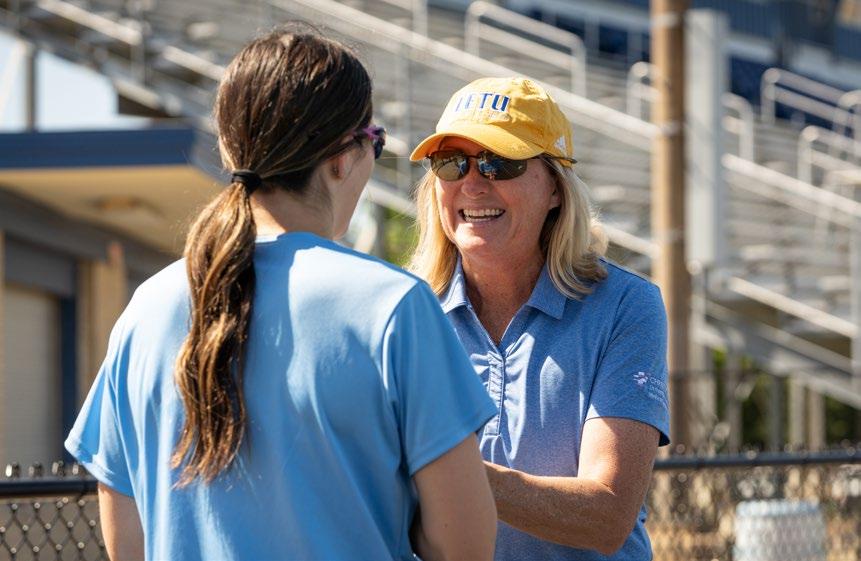
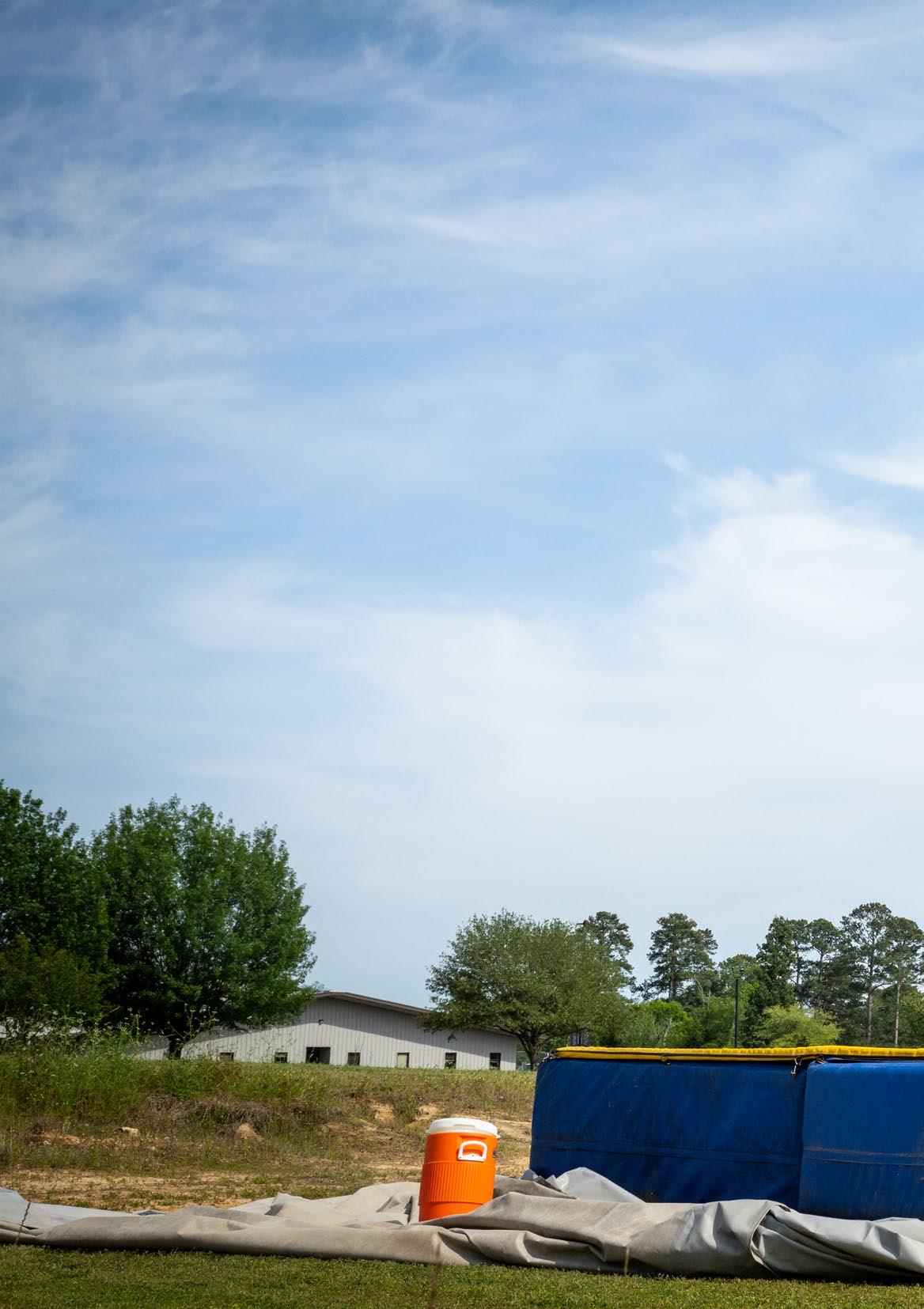
Raske was selected as the head coach for Team USA at the World University Games in 2009 and as the head women's coach for Team USA at its quadrangular meet against Great Britain, China, and Russia in 2006. During her tenure at Sacramento State, she was named Big Sky Conference Coach of the Year 16 times and is the only woman to coach a Division I men's team to five conference championship titles in NCAA history in any sport.
Raske graduated from Southern Illinois University with a double major in education and zoology; she was an All-American at SIU in the 100-meter hurdles and competed in five U.S. National Championships, including the 1992 Olympic Trials.
In her free time, she enjoys sailing (she’s the current Commodore for the Longview Yacht Club), and spending time with her family and her husband and best friend, LeTourneau Track & Field Associate Head Coach, Terry VanLaningham.
Diverse Sport, Diverse Impact
The value the track and field/cross country program brings to the university as a whole is significant. Track is a unique sport: unlike team sports, each athlete competes as an individual while contributing to a greater team score vying for a team championship. There is nowhere to hide; it is head-to-head competition to see who can run the fastest, throw the farthest, jump the longest and the highest. It is the first sport and the purest sport.
The addition of track and field also allows our distance runners the ability to train and be coached for nine months of the year and is one of
the reasons we were able to capture the first ASC Conference title for our men’s cross-country team in 2021. Our distance runners must put in relentless work and remain consistent over the duration of a year to compete in the conference and nationally.
Further value lies in the sheer diversity of the sport. With 21 events in outdoor track and field, there is something for everyone, no matter what size, shape, color, background, or economic status. It is the epitome of a cultural melting pot, with sprinters, jumpers, throwers, and runners. In this way, I believe track and field reflects God’s design for his church: a diverse team in all aspects, unified across our differences. This is why I am so passionate about the team aspect of our sport and intentional about building a team culture with one unifying purpose.
Coaching With a Higher Call
In my previous experience with Division I athletics and at public/ secular institutions of higher ed, I had to be very careful to “stay in my lane” and not overstep boundaries that were growing more and more narrow in terms of sharing my faith. Supporting certain policies that did not align with my core Christian beliefs was becoming increasingly difficult to navigate.
When I arrived at the LeTourneau campus, I felt like I could authentically be me for the first time as a Christian coach. I love having the freedom to share my faith and disciple young people in their walk with Jesus. While there is always room for improvement in every setting, especially as we wait for a new track facility, it has been wonderful to work in a faith-based community, and I am grateful God has called me here!
My technical knowledge of this sport meets a very high standard, but it is my approach to working with young people that matters: the care I have for my athletes, my ability to connect, motivate, and mentor, and the personal investment I make towards serving them the best I can.
52 LETOURNEAU NOW
KATHLEEN RASKE, DIRECTOR OF TRACK & FIELD/CROSS COUNTRY COACHES AN ATHLETE DURING PRACTICE AT THE LOCAL TRACK.

I believe track and field reflects God’s design for his church: a diverse team in all aspects, unified across our differences.
SPRING/SUMMER 2023 53
PHOTOGRAPHY BY SARA BRYAN
our faith must guide our call
As Christian coaches, and inform our practices.

54 LETOURNEAU NOW
The core mission of the TF/XC program is for our students to leave LeTourneau having deepened their relationship with Christ and labored to be the best athletes, scholars, and leaders they can be, all within a central team approach. I have been blessed to witness our student athletes flourish this year as members of our program and team culture. I have observed life change, spiritual growth, and transformation because of a student athlete experience that integrates faith and sport.
College is such an extraordinary time in a young person’s life, and college coaches have an incredible opportunity for transformative impact as we share time with them in meetings, practice, competition, and travel. Our student athletes develop a sense of self-awareness, discern their callings in particular career fields, and build self-confidence as they discover who they want to be.
As Christian coaches, our faith must guide our call and inform our practices. We intentionally invest in our athletes through team life groups, Christian mentoring, community service, and prayer. We seek to nurture their relationships with Jesus and shape their understanding of what it means to glorify God through athletics as they steward their God-given talents and abilities.
The challenge each year is to take the diversity of sports represented in TF/XC and build one unified team. Core to my coaching philosophy, I am passionate about building a team culture centered on a common purpose. Focusing on individual competition is easy in our sport; being part of a team with a greater purpose is truly special. The bonds built among teammates last a lifetime as you work hard in the trenches together to achieve
something greater than yourself. So, I endeavor to create a true team experience that will make a difference in my students’ overall health and well-being as we live out life, sport, and faith together.
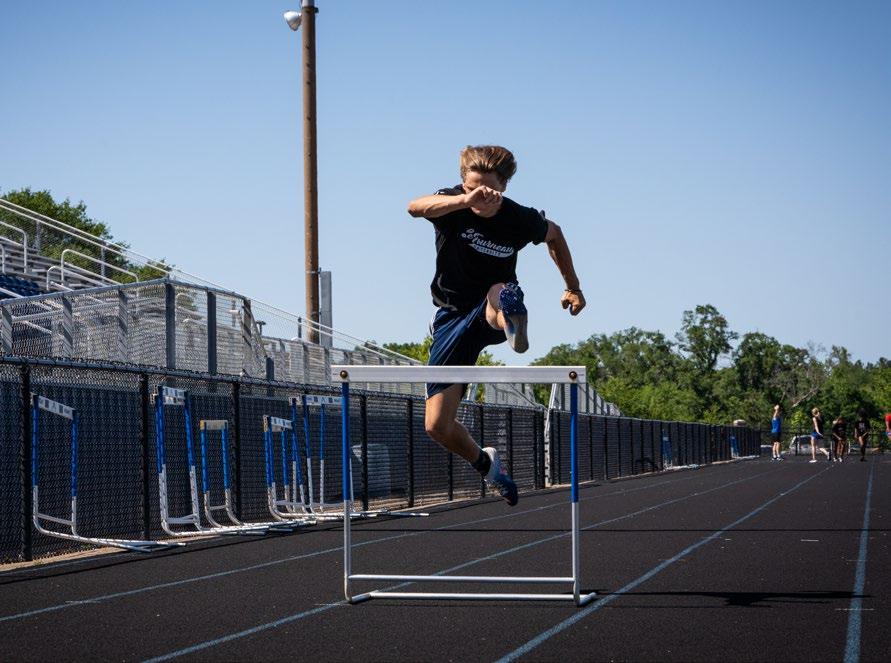
Jackets On Fire
One way we build team culture is by creating a theme for the year; this year’s theme is: “ON FIRE!” Everything we do as a team begins with our athletes being on fire for God, intentionally seeking Him and growing in faith together. The “Jackets on FIRE” theme has helped us direct and simplify our purposes as a program this year. The theme also serves as an acronym:
One unified team (across six NCAA sports).
Nameless because God’s name is above our names.
Focused on quality daily work towards achieving our goals.

Intentional in investing in each other’s lives. Resilient in working harder and longer than most.
Execution when it counts the most in competition, especially the championship.
It is a blessing and an honor to be called “coach” and partner with God in His work at LeTourneau University. I receive deep joy as I observe how well our teammates love each other, pray, encourage, cheer, and serve together all for God’s glory. It has truly been a special year, and I have no doubt God’s hand is upon us. The greatest blessing for me is witnessing His handiwork as He confirms my role here and blesses the works of my hands. I trust that God has our program in His hands and will assemble each team member and provide for all our needs moving forward. He is so faithful!
PHOTOGRAPHY BY SARA BRYAN
SPRING/SUMMER 2023 55
TRACK AND FIELD ATHLETES PRACTICE MULTIPLE EVENTS IN PREPARATION FOR CONFERENCE CHAMPIONSHIPS AT THE END OF THE SEASON.
Haily Bass
SPORT: SPRINTS
MAJOR: COUNSELING PSYCHOLOGY
What has stood out to you about the university in your first year?
The authentic Christianity at LeTourneau is what stands out to me the most. Anywhere you go on campus, you will encounter the love of God. In the classrooms, the Hive, a sporting event, or on any of the floors, you will find a unique community that supports you in all facets of your life.
How has being at LeTourneau challenged you in your faith and in your athletic ability?
In all honesty, my first year here has challenged my pride. I thought I knew all about track and field; however, you can never know enough. Coach Raske and Coach Van are very knowledgeable people, and I can truly say I learned something new from them in every practice. I am beyond thankful for their coaching and mentoring.
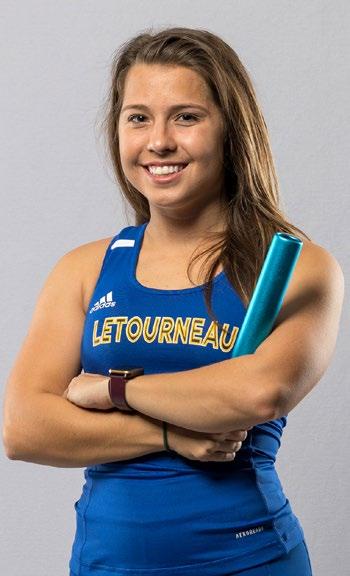

What is it like to compete against other teams and athletes from around the country at all levels of collegiate athletics?
It is an exhilarating experience. When competing against higherlevel athletes, I have learned how to redefine what success is for me. Success in a track meet is not always getting first; it may be getting a new personal best, improving from my last meet, or getting my form down. I learn from my shortcomings by seeing what not to do or what to do next time.
David DugaN
SPORT: DISTANCE
MAJOR: MECHANICAL ENGINEERING
How has being at LeTourneau challenged you in your faith and in your athletic ability?

From day one, I have been challenged to think about my faith in a new way: vocation. How has God called me into the field of engineering? How has God called me into athletics? In my first semester, I didn’t have a very clear idea of what that meant. However, through my classes, I was able to process exactly what it means to be called into the workplace.
What have you enjoyed the most about being a student here and on the track & field team?
The coaches are very conscious of the balance we make between school and athletics. Here, I am a student athlete, not the other way around. With high quality coaching and enough time to study, I have been able to excel in academics as well as athletics.
What has stood out to you about the university in your first year?
LeTourneau does an amazing job of discipling its students. Whether through coursework or the community, people grow here. I hope I can be as impactful to incoming freshmen as my upperclassmen friends are to me.
THE BUZZ 56 LETOURNEAU NOW
Victoria Wilson
SPORT: MULTI-EVENT MAJOR: KINESIOLOGY
What have you enjoyed the most about being a student here and on the track & field team?
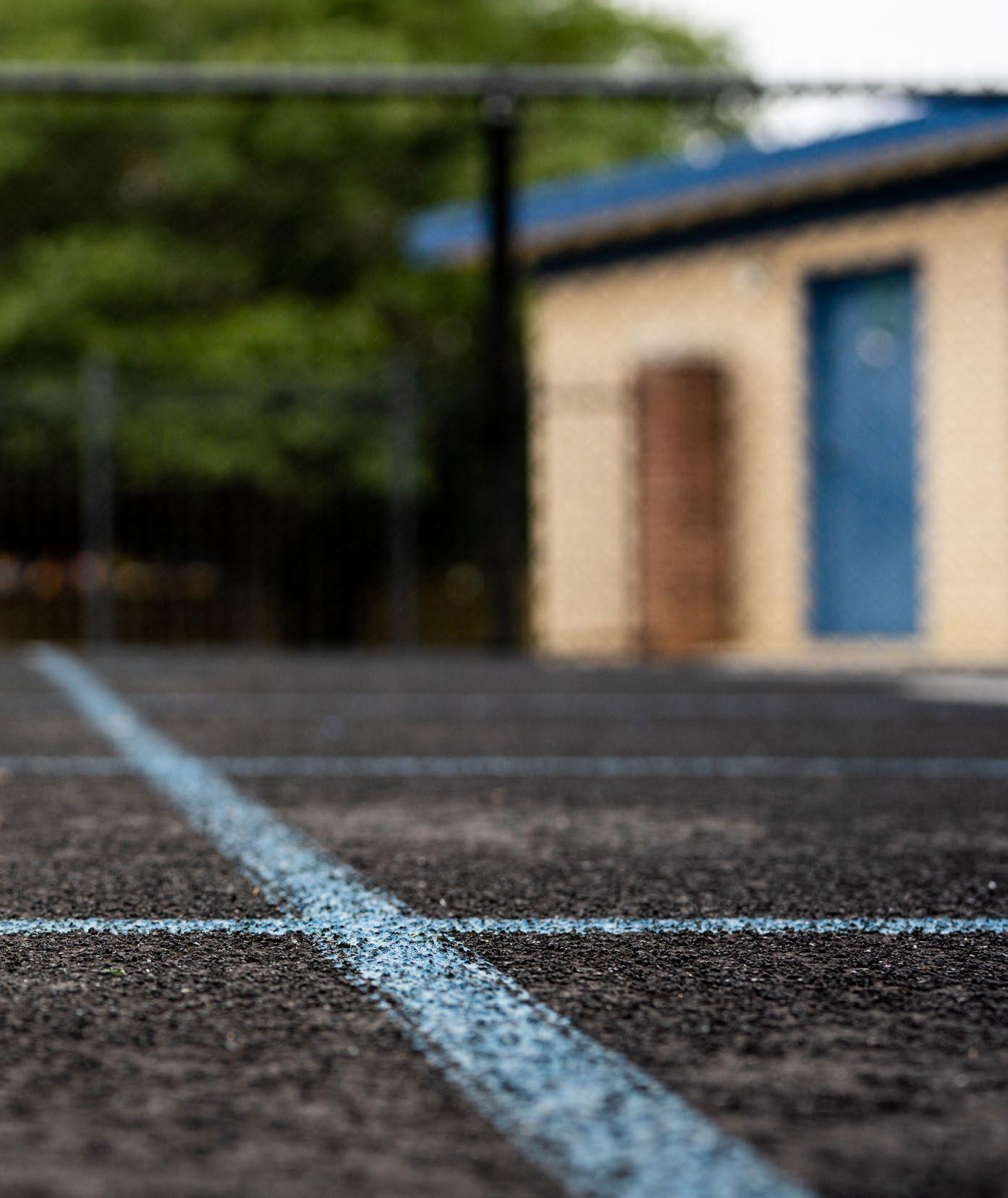
Being a student at LeTourneau has changed my life. My relationship with God has grown so much since I started here, and He couldn’t have made it clearer that this school is perfect for me. One thing that is very hard to find in college is a team that is very close and loves one another. The track and field team treats everyone like they are family.
What were some of the key reasons you chose to attend LeTourneau and compete on the track & field team?
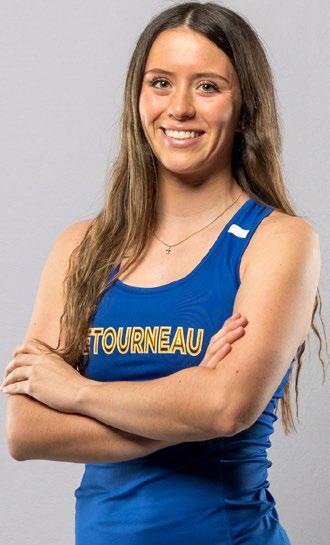
I chose LeTourneau because I trusted the coaches, and I knew that I would develop well as an athlete and grow my relationship with God at the same time. I knew the background of the coaches, their years coaching in Division 1 and all the accomplishments they had achieved, so I chose to trust and invest in them.
If you could go back and tell yourself last year all about your experience at LeTourneau, what would you say?
I would tell myself that college is harder than you think, but trust in the Lord and you’ll be okay. I would also tell myself to be ready for anything because things are going to be thrown at you and you have to adjust.
Recent PROGRAM HIGHLIGHTS
• 11 total American Southwest Conference (ASC) honors in 2023
• Four ASC champions in 2023: Ellie Marsh (400m hurdles), Jack Miller (pole vault), Erik Moore (decathlon), Spencer Gambrell (5000m)
• Jacob White: ASC Sportsmanship Athlete of the Year for men’s track and field
• 5 Indoor and 4 Outdoor All-West Region honorees in 2023 (U.S. Track & Field and Cross Country Coaches Association)
• 14 individual NCAA Championships qualifiers in program history
• 21 program records set in 2022-23
• Jack Miller (pole vault): three-time All-American, seven-time NCAA Championships qualifier, two-time ASC champion, 2023 Outstanding Field Athlete of the Meet
• Erik Moore: three-time ASC champion in the decathlon
• Both men’s and women’s teams placed third overall out of seven programs at the 2023 ASC Championships, the best finish for each team in program history.
SPRING/SUMMER 2023 57
AN ONLINE MBA FOR A CHANGING WORLD
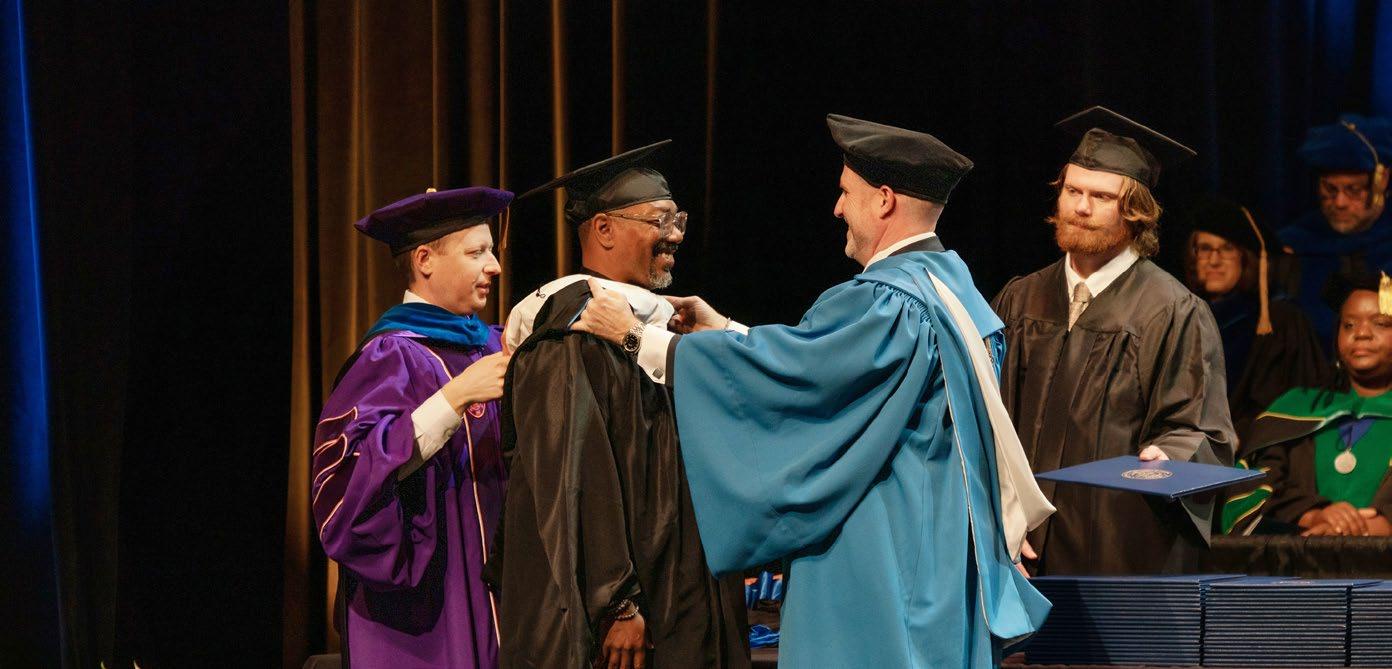
Learn to find your locus of control as a business leader and refine your approach to effective leadership in a continually changing world. LeTourneau University's online MBA program stands out with a unique approach to graduate business education, emphasizing continuous improvement and awarding stackable benchmark certificates. The program is designed to provide students with a comprehensive understanding of business principles, while also focusing on the practical application of those principles in real-world settings.
3 CERTIFICATES 2 SIX SIGMA BELTS 1 MBA
With a curriculum that covers organizational and entrepreneurial leadership, finance and decision-making, and continuous improvement associated with quality operations management, students will gain practical knowledge and meaningful skills. The program also incorporates and applies the Six Sigma method and tools, arming business leaders with expert training to improve business processes by reducing defects and errors, minimizing variation, and increasing quality and efficiency. Six Sigma credentials are rolled into this MBA, allowing students to walk away saving $6,000 through a series of stackable certifications, including the Lean Six Sigma (LSS) Green and Black Belts. Visit letu.edu/MBA to learn more.
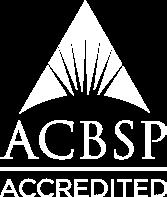
MBA BENCHMARK Continuous Improvement MBA BENCHMARK FINANCE and DECISION MAKING MBA BENCHMARK ORGANIZATIONAL LEADERSHIP letu.edu/MBA 58 LETOURNEAU NOW
Meet Harold and Mary LeTourneau
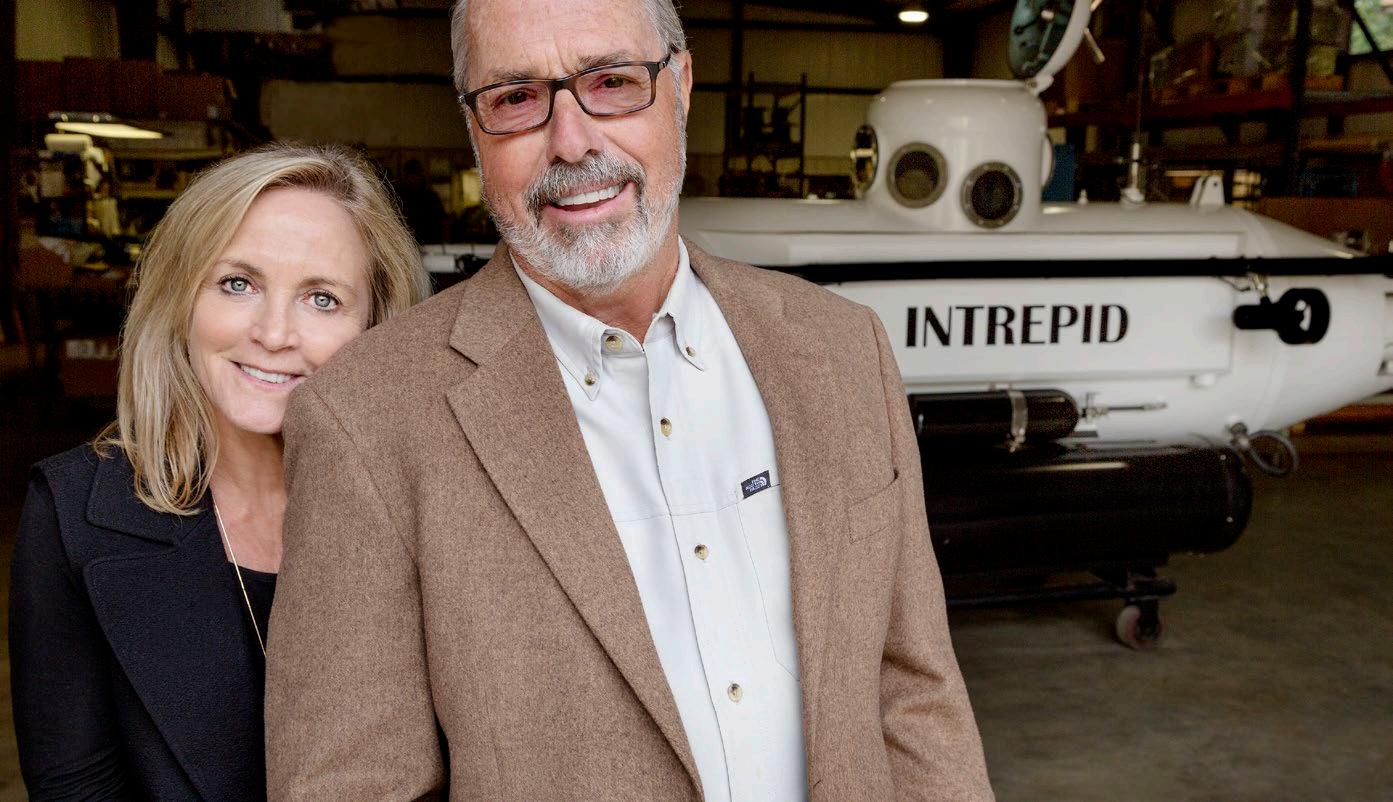
Harold (great nephew of R.G.) and Mary knew they wanted to do something meaningful for LeTourneau University, but at the same time, they wanted to be strategic in how they structured their intention. As Harold is an entrepreneur in his own right, they also knew that if there was a way to make a gift to LETU while also providing income to them (that could be deployed to various purposes), that would be all the better. After discussion on this, a Charitable Remainder Unitrust, made available through The LeTourneau University Foundation, was opted for as the vehicle of choice – an option with a significant amount of built-in flexibility so they can add to it over time if they feel led to do so.
For guidance with your unique situation and meaningful goals, please do not hesitate to call upon us here at the Foundation. We have many years of experience assisting families in efficient and comprehensive ways. We can be reached by calling 800-259-5388 or by email at leavealegacy@letufoundation.org.
SPRING/SUMMER 2023 59
PHOTOGRAPH BY O. RUFUS LOVETT
Your LETU experience actually started as an engineering major. What things were different when you switched majors, and what things did you feel remained constant throughout the whole time?
I switched from biomedical engineering to kinesiology at the end of my sophomore year. One thing that remained constant was the support of the professors. Dr. Gonzalez was my advisor when I was biomedical engineering. So going into BME, the LEGS (LeTourneau Engineering Global Solutions) program had just released, and I was interested. That is what prompted me to study biomedical engineering. My aim was
Following the Call:
Mending Bodies, Mentoring Souls
KATIE LEATHERWOOD ('09)
Katie Leatherwood (LETU ‘09) is a Certified Prosthetist and Orthotist with a passion to share the love of Jesus Christ with people affected by disability. Using her knowledge in prosthetics, orthotics, and disability awareness, Katie seeks to engage this community through physical intervention, emotional encouragement, and spiritual discipleship.
After graduating from LeTourneau University with a degree in Kinesiology (Exercise Science), Katie went to graduate school and earned a Certification in Prosthetics and Orthotics (CPO). She worked full-time in the field of Prosthetics and Orthotics since 2009, before moving to Latvia in 2015. Her organization, Designed To Live, exists to inspire people whose lives have been affected by a disability and help them regain meaning and significance in their lives and be able to live beyond their disability.
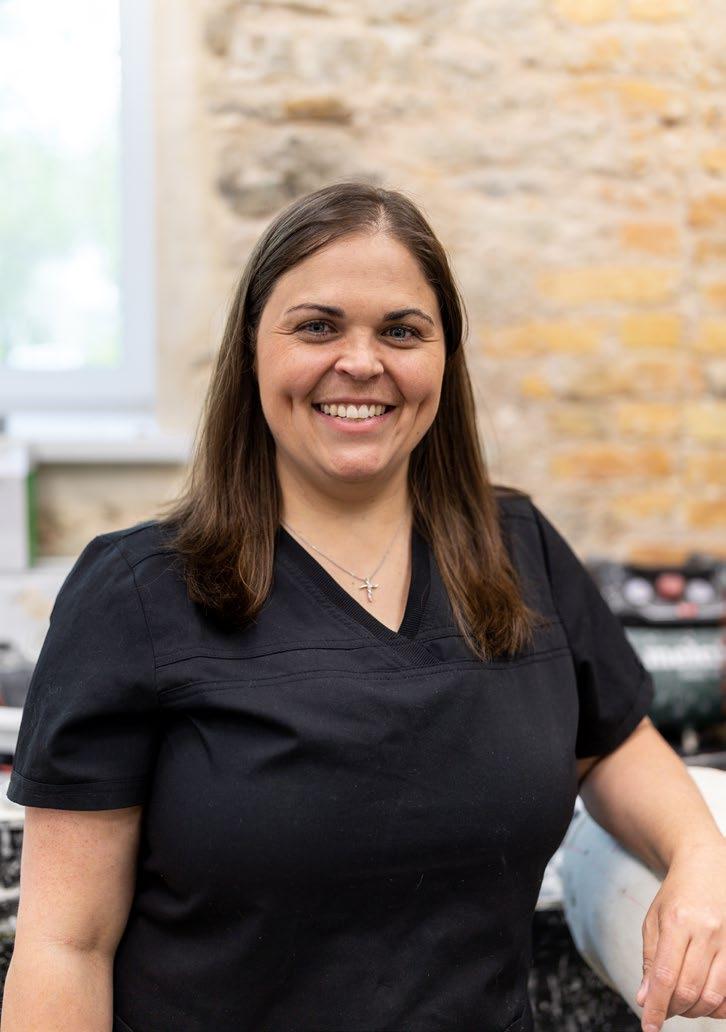
The NOW team had the chance to chat with Katie this spring and learn more about what God is doing through her work in Latvia. We hope you enjoy the following highlights from that conversation.
to be in this program. To do that, biomedical engineering was the gateway. I expected biomedical engineering to deal with more of the medical side instead of solely being engineering, but I was mistaken. Instead, it was very heavy on the engineering. I eventually realized that I was not an engineer, but I did like the medical end and I wanted to work with people. I went to Dr. Gonzalez's office and told him I was ready to change majors. He told me it was not time yet, but to come back in a few days and have a report of why I wanted to change majors. I went back, he read it, and he approved. When I switched to kinesiology, my new advisor, Dr. Jacobs was also very supportive. He asked me what
my goals were and made me feel welcomed. I really appreciated the professors being very encouraging and helping me with this change.
You have covered a lot of ground since your time at LETU. Did you immediately have a pathway after graduation that fed into the kinesiology field?
Before graduation I had the opportunity to be on a senior design team called the LEGS project, working with prosthetic legs, specifically knee joints. At the time I joined, they added the science (kinesiology) team. I was the team lead for the science team using kinesiology as well as biology. I eventually
LETOURNEAU BUILT 60 LETOURNEAU NOW
went to Kenya and was exposed to the great need and impact for prosthetics globally. I realized that I wanted to form a career around prosthetic care.
I had been involved with international missions growing up. My family went to many countries on mission trips. The student research trip to Kenya was not just a trip. It was life-changing to see the patients traveling for days just to get new prosthetics and how important it is for their independence in life. I went to Jordan four years ago and used a LEGS knee to fit ten patients. I was able to use the knee that I did research on for actual patient care. That’s not usually the case for student research projects but in my case, I actually got to see it being used in the real world. It was a very cool experience. It allowed me to see the connections between the science and the practical application. We had seen on the paper, the numbers say that this knee works, but does it really? In Kenya, we were there for the research, but once we got to talk with the people, those relationships became most important to us. I keep in contact with a few of the people that I met on the trip. I've sent one of the patients a few prosthetic parts because I now have access to them. It was life-changing because I can say that they were my very first prosthetic patients. I'm doing what I'm doing today because of that trip, because of the LEGS program, because of LeTourneau University.
What has your journey looked like between your experience in Kenya and where God has brought you now?
At LeTourneau, I remember hearing multiple times that we all have a God-given skill, you develop that skill, and then you take it to the mission field. It was discussed a lot; you get a skill, you get good at it, and then you take that on the mission field which initially becomes your calling. During my professional training, the patient rooms at my prosthetic clinic in Texas were my mission fields. If you're planning to go overseas and international long term on the mission field, you can’t just go right out of college
and expect to be very useful. If this is your end goal, you need to educate yourself on your skill and grow. This way, you can be more useful when you go. I had a mentor in prosthetics that basically told me the same thing. He told me not to leave yet even though I had finished my residency. I needed to work at least five years in the field full time seeing patients in a controlled area like the USA. If I decided to go somewhere where it is not so controlled with limited resources, I would then be able to reflect on my experiences and adapt them. I was ready to go and wanted to do this, but I did have many people tell me to wait. They said that God would use me during that time where I was and that it would not be wasted time. When I got to the point where God wanted me, He would use me even more when he sent me to where He wanted me to go.
In Texas, I worked for about seven years full time doing prosthetics at Hanger Clinic, one of the largest prosthetic corporations in the U.S. Because of privacy laws, I could talk with the patient about anything behind closed doors. I was able to have such deep
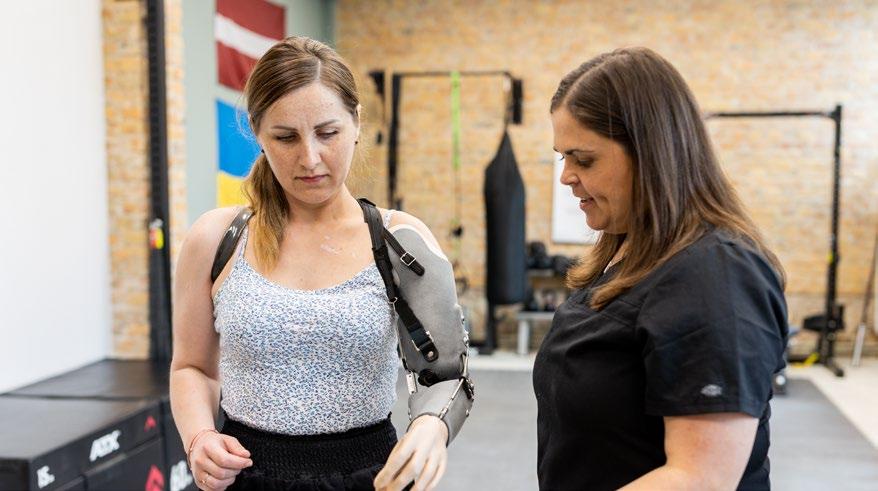
faith conversations during that period. That definitely was my mission field at the time. Later, the doors opened for me to go to Latvia. So I came to a point in my career where I asked God to use me in a greater way. Going back a bit, I did get caught up in the success and career status ladder. Before I began my professional career, I had committed to God that I wanted to learn and gain experience so I could go further serving Him with a greater impact. After several years of climbing the career ladder and gaining material possessesions, I was at the top and realized I wouldn’t be here without God’s provisions and opportunities. I had a cometo-Jesus moment and realized I succeeded in my career, but that wasn’t my goal. I was at a point where I had experience, I had knowledge, and I had the skills. What was next? I loved my job in Texas, but my ultimate goal starting this career was not to be comfortable and have all these things. I prayed and began looking for the next place God would use me. I knew I had the skills to be used in areas that were less resourced with prosthetics. It was about a two-year process of
PHOTOGRAPHY BY LIENE LEONOVICA
TANYA IS FROM MARIUPOL IN UKRAINE AND LOST HER ARM WHEN A RUSSIAN SHELL HIT HER HOME. HER FATHER ALSO DIED IN THIS SAME BOMBING. TANYA IS BEING FIT WITH A 3D PRINTED BODY-POWERED PROSTHETIC ARM THAT ALLOWS HER TO HAVE INDEPENDENCE IN HER LIFE AND WORK.
SPRING/SUMMER 2023 61
looking, praying, and seeking advice. I talked with many organizations, but most said no because I wasn’t a doctor, nurse, or dentist. I got this answer for about a year and a half. I knew this was God’s calling on my life so I didn't take those nos as a stopping point. I continued searching and praying. My church in Texas had a partnership with a church in Latvia. One year I went to Latvia on vacation. During that time, I wanted to meet with different people, present the idea of God’s calling on my life, present my skills, and ask what their thoughts were. I met with people in the government, people that worked at university level, people in churches, and other organizations. Some thought this plan was a good idea, some didn’t. I came back to the U.S. and continued working for another year until I got connected with an organization in Latvia that said they would give me a chance. Things have changed a lot since then. I wouldn't have thought of going to Latvia for prosthetics, but God definitely did and he knew that was where I needed to be.
How have you grown recently, and what has that growth taught you?
Due to the close location of Latvia to Ukraine, we have recently started an initiative to bring Ukrainians that have lost limbs because of the war to Latvia for prosthetic care. A very challenging recent reality has been hearing the traumatic stories from those coming to us from Ukraine and knowing that it’s not events that happened years ago, but these events are still occurring today. It's taught me the importance of being able to listen well and answer questions that they have, despite not being anywhere near experiencing anything like the war. I am learning how to love well while not feeling personal attachment to or responsibility for their story. We need to acknowledge their stories, and I need to hear them because they are important. It’s why they’re in my clinic, but also we need to look forward and know that these things are happening, to determine what we are going to do moving forward. I want to know the details, but
they may not be ready to share all the details with me. I have had to learn how to interact with patients that have been in these very traumatic situations. Previously my patients’ traumas were different from the ones I listen to currently. It used to be trauma from a car accident or sporting injury. Now, trauma is phosphorus bombs, shells blowing up people's houses, stepping on a landmine, etc. It’s nothing that I could have prepared or trained for in school. I’ve had to slowly learn how to care for these patients and know when I need to send them to receive further psychological help. But I get to see the good parts of these traumatic stories. I get to see these patients coming in hopeless and leaving with joy, new goals, new friendships, a new outlook on life… and in some cases a new hope and love in Jesus Christ!
How can our readers be praying for you and the work of Designed To Live in Latvia?
I would ask that you pray that the people who come in my door seeking physical hope in the form of a prosthetic limb will most importantly come to know the eternal hope through faith in Jesus Christ that they too can have.
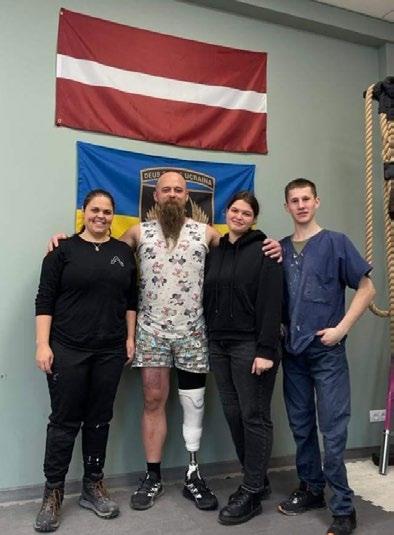
Any closing words of wisdom that you have learned from your journey so far?
I read a book and the tagline has sort of been the tagline for my life: “Seek the compass, check the maps.” God is the compass, He’s never changing, He’s always constant, but your maps in your life will change. I started at LeTourneau in biomedical engineering and changed to kinesiology. I went to the US and then went to Latvia. I think the biggest thing that I’ve learned in life is to be open to change. Have your plan and have your goals, but don’t let that get in the way of God’s plan and His timing. Be open to change, be open to what will come next and how you can change; not your passion and skills necessarily, but how you can use your passion and skills in a different way or
setting. God sent me to Latvia. People always ask me how long I’ll be in Latvia, and I really don’t know. I’m here in Latvia as long as God will allow me to be. I think he’ll have me here quite a while, but I’m open if something else comes that God wants me to move forward on. I think the biggest thing I’ve learned is be flexible in your plan, and be constantly seeking what God’s plan is because it’s always going to be the best.
To
SERGII IS A UKRANIAN SOLDIER. HE LOST HIS LEG WHILE FIGHTING IN IRPIN. IN JANUARY, HE TOOK HIS FIRST STEPS WITH HIS NEW PROSTHETIC LEG WITH KATIE AND HER TEAM AT DESIGNED TO LIVE. HE IS NOW BACK IN UKRAINE DEFENDING FREEDOM FROM THE FRONT LINES. Learn More About Katie’s work, scan the code or visit designedtolivelatvia.com 62 LETOURNEAU NOW
What was your experience like at LeTourneau?
Some of the high notes: Intramurals, Stage Right (theater club), worship band with Dr. Nathan Green, and a lot of other really fun things in that experience. But just overall, the things outside of the classroom and the mentors that brought me into contact with were the highlight for sure. On the first day of orientation, I remember meeting my peer advisor, Brittany Prince, who is a fantastic human being. She showed us around and guided our group. I wondered what her job was and she told me that she was a peer advisor. She explained that her goal was to help students adjust to college and help get them acclimated. I then decided that I wanted
Following the Call:
Building Leadership, Cultivating Humility
JOSH WYMORE, PH.D. ('08)

Dr. Josh Wymore (LETU ‘08) has a passion for helping people live and lead with purpose and clarity. As an executive coach, keynote speaker, and trainer with WYMORE, Josh has helped Fortune 500 leaders around the world become more of who they were made to be. His book, Humbler Leadership, explores the ten mindsets and skill sets leaders can practice to become humbler. Our NOW team connected with Dr. Wymore this past spring semester to reflect with him on how his time at LETU prompted his vocation in leadership training, how his recent book may connect people to a greater peace and purpose in their work. We hope you enjoy the following highlights from that conversation.
to be a peer advisor for the next three years and that’s what I did. That was one of the richest experiences of my life and definitely of my LeTourneau experience—to invest back into new students and have a way to serve, connect, and see them grow over the course of a year. It was also a chance to work on a team of incredible Christian leaders who cared about being their best and growing. It was that energizing experience that really took me on the path that I'm on now.
How did your experiences at LeTourneau prepare you for leadership?
I was an assistant softball coach during my time at LETU because I thought I was
going to be a high school football coach and math teacher. But in the softball world, I had to invest in the technique, strategy, and all that kind of stuff so much that there wasn't a lot left for just coaching the person. In peer advising, I had to do just that. A mentor told me that there’s a whole field of work called student development which involves all of the co-curricular activities I loved outside of the classroom. That took me on my path to graduate school. I initially was torn between becoming an engineer or a teacher. I spent about a semester and a half as an engineer and felt like I didn't have enough patience for the technical problems, so I shifted to education. When I decided to go to grad school, I ended college with a math degree and continued peer advising. I also built a
PHOTOGRAPHY BY SARA BRYAN SPRING/SUMMER 2023 63
student affairs internship into that last year while preparing for school.
Your recent book is titled “Humbler Leadership.” What is it specifically about humility that you believe to be so important in leadership?
Focusing on humility is hard because it's not the trendiest thing. It's not like other styles of leadership, such as servant leadership. It's really a foundational character trait that enables you to do all the other kinds of leadership. Part of humility is the teachability and growth mindset that enables you to achieve your full potential as a leader. This has been transformational in my life, and was a large reason behind why I decided to write this book. When I worked with Brad Bowser (as I talked about in the book) he had tools I didn't have and I'd never seen before. But I knew I had to be humble. I heard about humility in church, but it's one thing to know and another thing to want it. Seeing it in action made me realize that I wanted the effectiveness and the peace that came with humility. I’ve tried to incorporate humility in my life over the past five years and have
noticed I have fewer disputes with my wife and listen to my kids in order to ask them useful questions. Integrating humility into my life has helped me be less infuriated with my kids because I'm able to let them lead me to ask them good questions.
As I left higher education and transitioned to working with leaders directly coaching and training them, I spent a lot of time helping Christians become better Christians. But now, half of my clients aren't Christians at all. And so, I'm trying to help them become more of who they were made to be, and they lack this assumption that I had that we should probably be humble. For some of them, the idea of humility is non-negotiable. I had to figure a way to introduce the idea that would appeal to a wide range of individuals, many of whom are research- and data-driven. That's why I decided to write on that topic.
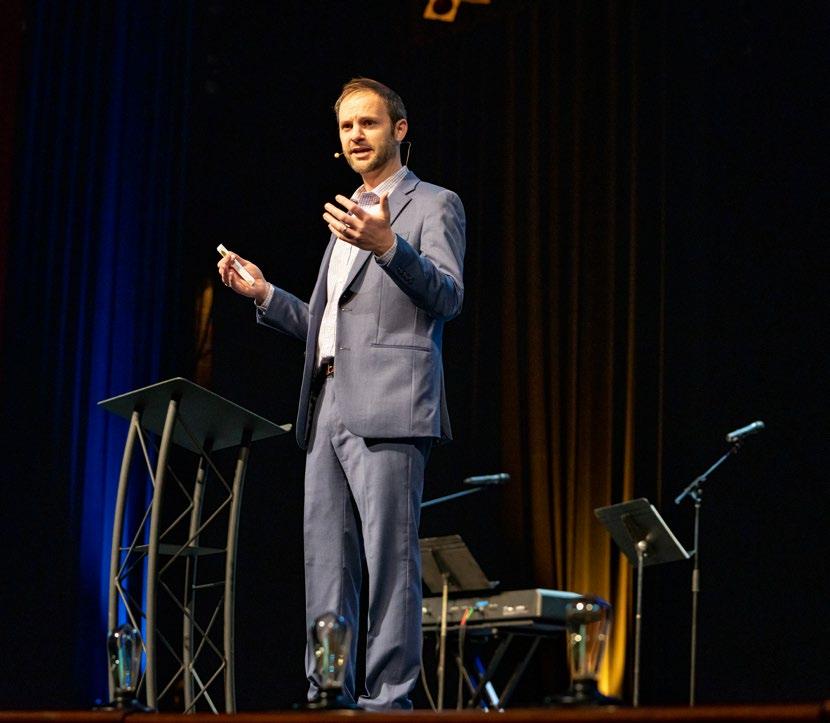
Based on the concept of flourishing that you touch on in your book, what does flourishing look like in college? Is college even worth it?
There is so much growth during your time in college. The decisions a 17-year old makes
versus a 22-year old are vastly different. I first got interested in LeTourneau because I thought I wanted to be an engineer and it had an engineering program, but the reason that I love LeTourneau and tell other people to go there is because of the relationships I built, the experiences I had, and the mentors who invested in my life. Dr. Brent Ellis was the dean of Christian leadership when I was a student. He officiated my wedding, did my marriage counseling, hired me for a job ten years later, and was overall a great mentor. And that's the kind of thing you get at LeTourneau that, having been at Penn State, is a lot rarer at a large state university. The faculty-student relationships and the engagement outside of the classroom are the two strongest predictors of a successful college experience. I also got to do theatre, intramural sports, coach, tutor, and be a peer advisor. I wouldn’t have had the opportunity to be involved like that at another larger university.
I also became more of myself at LeTourneau. Coming out of high school, I felt like a fish out of water. There weren't a lot of other strong Christians in my school. When I
64 LETOURNEAU NOW
The reason that I love LeTourneau and tell other people to go there is because of the relationships I built, the experiences I had, and the mentors who invested in my life.
got to LeTourneau, it was like, "These are my people!" It was as if all of the best youth group leaders were in one spot. We hung out and got things done. I felt like I had the all-star lineup of guys all on my floor, and the formational impact they had on me was so huge. College is a great place to figure out what you want to do because it expands your horizons. You meet people from all over the world and learn about majors and jobs you never considered. It's not for everybody, but I think it is such a powerful and formational experience.
Speaking of flourishing, tell us about the “Shalom of the earth” that you bring up in your book. Why does this resonate with you?
It's an idea that really came after my time at LeTourneau. There really are some theological differences between the theology that says, you know, God's coming, he's going to burn this place down, so you better get out of here and you know, take whoever you can with you. It's like a sinking ship: you have to get off. As opposed to another theological tradition which is more like, "Well, no, God's going to fix this ship, and we get to help fix it. He's going to fix it with us." And so, the different implications of the latter theology is that what you do here matters. I think Martin Luther said something like, "God loves a cobbler not because he etches a cross in his shoes but because God loves craftsmanship." The idea is that all of our work has dignity and has merit. And so, when I think about what I do now, I'm amazed and humbled that I get to help leaders become better leaders. And the reality is that if they become a better leader, the people they lead are going home a little bit less stressed, a little bit more encouraged, and a little bit more energized. This means they're better parents of their kids, their kids do better in school, and the teachers are less frustrated. It has this ripple effect, this chain reaction. And so, it's creating these little pockets of peace—of flourishing— whenever leaders get better. Craig Groeschel says that when a leader gets better, everybody
wins. And I think that's what he means: that if you become the most focused, purposeful, healthy version of yourself, the fruit just naturally flows out of that. When we're connected to God as the vine, we don't have to exert a lot of effort to squeeze out the fruit of the spirit. I can't push out peace by just trying really hard. If I'm connected to the vine and there's nutrients and water, peace will come from that. Flourishing comes as leaders are healthier. And so, sometimes that means salvation. Sometimes that just means a less dysfunctional workplace where our policies make sense, people are held accountable, and we actually get things done. Man, life is so much better when you live in one of those kinds of environments.
In thinking about the future leaders of workplaces, what words of encouragement would you give to an undergrad student preparing for their future?
I think there's some unnecessary pressure to feel like you’ve got to get it right and find the one thing you enjoy. The reality is that most people don't have a clear idea of what they want to do well into their careers and even change their minds multiple times. I'd like to normalize the mindset: "There's no one answer that God’s hidden from you and you've got to be holy enough to uncover it." But there are ways to get closer to work that is better aligned to your strengths and your passions. In the book, I talk about aligning your strengths, passions, and what brings flourishing in the world. I think that's a nice paradigm. In terms of how you do that, especially when you're at LeTourneau, one of the great privileges you have there is an abundance of experiences. I think about what helped me become a leadership coach now and it's the different opportunities I had in college. I jumped into softball coaching because I had envisioned a career as a high school coach and math teacher. I later found out that I care more about coaching the whole person rather than coaching in a sport. I could do many things that coach people: working at
a non-profit, working as a business manager, etc. It opened up many more opportunities for me.
In closing, when looking back on your college experience, what is one takeaway related to life and learning that you still reflect on?
While I was getting my Ph.D., I had an interesting conversation with a friend. I asked her what she wanted to do with her degree, and she had no idea. All she did during her undergrad was study in her room to maintain a 4.0 GPA to get into grad school. She didn’t volunteer or get involved in any clubs or extracurricular activities.
Academics will continue to be the focus while in school, but try doing other things that aren’t academic related in order to branch out and find some other strengths and interests that you could use in your career. At LeTourneau, there are things like intramural sports, acousticafé, and Hootenanny, that you can get involved and find your passions and God-given strengths. Find time to interact with different types of people and build connections.
When I got to grad school for my master's, my goal was to be a college president. We had one of that university's presidents emeriti, Jay Kessler, come in to speak. I asked him how to become a college president. He shared a quote from his mentor, Milo Rediger (the president when he was a student) who said, “The faithfulness of today determines the task of tomorrow.” Being faithful with what God’s given you today will open the door for the next thing. Whatever you find yourself being faithful with right now, that's what honors God. That's what slows down time and helps you enjoy it and make the most out of that season you're in.
To follow Dr. Wymore's work or check out his recent book, Humbler Leadership, visit joshwymore.com
SPRING/SUMMER 2023 65
LEGACY OF Engagement
Please join us in welcoming Lara Rose (’91, CSMA) as our new Director of Alumni Engagement! Lara has served at LeTourneau University since 2020 in administrative support roles in the School of Engineering & Engineering Technology and, most recently, in the Office of the Provost. Here, Lara reflects on her own LeTourneau story and what she finds especially meaningful about her new role.

I’m grateful to God for his faithfulness and for my story. My LeTourneau story is really a story of different aspects of God’s faithfulness over the years. It started when my great-grandmother, Susie, attended a revival in Indianapolis, Indiana, where she heard R.G. LeTourneau speak. When she returned to the farm, she encouraged my mom to attend LeTourneau. So, in the fall of 1962, my mom, JoAnn “Jody” Fleisch Wallace, came to LeTourneau as a student. That was the second year that they allowed co-ed’s on campus (she was one of seven female students that year). She has very fond memories of her time here and maintains relationships with her fellow students.
I want to share one of my mom’s memories: When she was too homesick to remain on campus, another student gave up his seat so she could fly home to Indiana on one of R.G.’s (Pop’s) airplanes—the A26 bomber converted for private use—with Pop. He allowed my mom to fly on his plane to a town near her hometown so she could see her family for eight hours. He helped her overcome her pain of being away from her family.
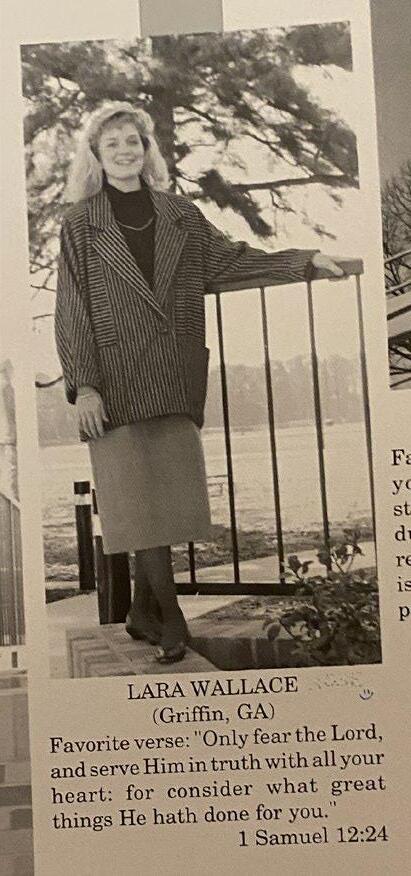
Fast forward to my senior year in high school, and I really wanted to stay close to home. Upon April of that year, my mom said, "Why don’t we go out and visit LeTourneau?" So, we did. It was then, on a preview weekend, that I first developed my admiration and respect for LeTourneau University. And on the flight home, I knew this was where God wanted me to study. I longed to pursue a technical degree in a Christian environment,
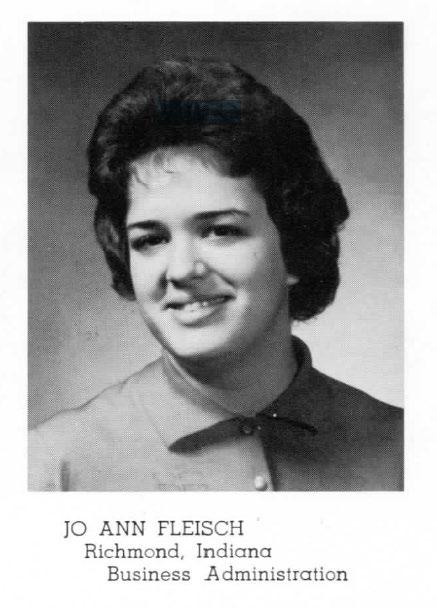
ALUMNI
AT LEFT, A SHOT OF LARA IN THE ‘91 LETOURNEAU UNIVERSITY PIONEER YEARBOOK; RIGHT, ONE OF HER MOTHER FROM THE ‘63 EDITION.
66 LETOURNEAU NOW
and LeTourneau was one of a few colleges that combined both.
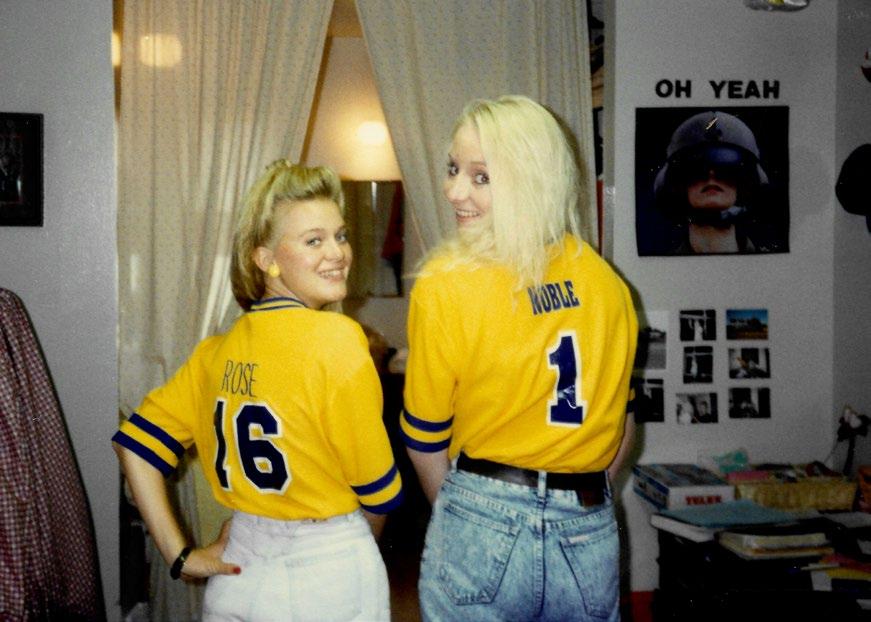
When I was a student, I wanted to focus on the academics and earn all A’s, but did also meet my husband, Dan "Verl" Rose (’90, EE). After we graduated, we married, I worked while Dan continued grad school, and we had five children. Ten years ago we returned to Longview so our children could also participate in the LeTourneau community. (This year, my youngest was a freshman, and my daughter was able to participate in a spring break mission trip with Beloved and Beyond.)
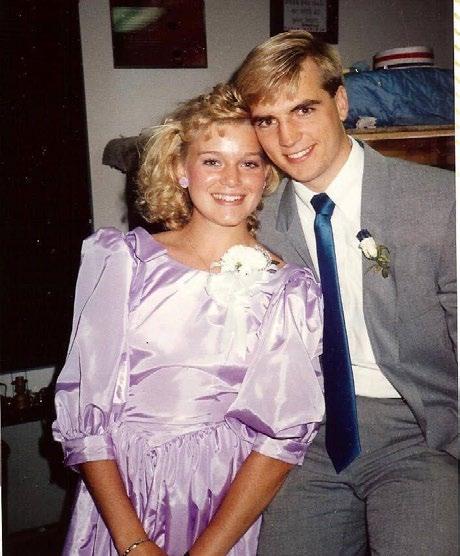
After a twenty-year sabbatical to invest in my family, I have enjoyed working on this fabulously updated campus. It’s not the capital improvements that drew us back, but the people and the legacy Pop and Mom LeTourneau began more than 75 years ago. Since moving back to Longview, it has been delightful to reconnect with old classmates, and it is especially fun to get to know the next generation of LeTourneau students. I always love hearing how God sovereignly works to
bring people to the campus of LeTourneau University.
After a decade back at LeTourneau, I can attest to the fact that we really are The Christian Polytechnic University in ways that are as true today as they were when my mom was here. And with every hire that we make I feel like I am so encouraged and inspired by our leadership. They’re very prayerful. I’m excited to see the faculty continue to mentor students, including mine. I have five kids that have all benefited from classes at LeTourneau University. We dropped our youngest off in August and met some fellow empty nester alums who were students with me and my husband, Dan, so I value what LeTourneau has to bring to our current student body.
It’s a joy to see that come to life still today. LeTourneau’s caring and upstanding community of leaders and students shaped my mom’s experience, and therefore mine as well. For me, the influence of professors like Mr. Roger Erickstad profoundly impacted my experience at LeTourneau. Not only did he provide superb classroom instruction, but he attended sporting events, mentored us
spiritually, and guided us professionally—all of this flavored with a good deal of humor. The Erickstads had us in their home and have faithfully kept in touch with us over the course of thirty years! I long to be available to students and co-workers the way the Erickstads have been and continue to be to me and my husband.
The LeTourneau experience is such a well-rounded one. I do value my degree, but probably the even more lasting impact that LeTourneau had on me during my time as a student was the spiritual one. I was a part of the inaugural Spring Break Missions trip to Mexico. This spring, as I had the opportunity to travel to LightSys in Colorado Springs with our computer science students, I was able to continue to see and actively participate in the ways in which LeTourneau is equipping them with competency in the workplace and also intentionally sparking that desire to work as unto the Lord and take the Gospel all across the world by using their skills.
In my new role as Director of Alumni Engagement, I’m excited about serving well, and I’m especially excited about working
SPRING/SUMMER 2023 67
LARA AND DAN AS STUDENTS, AT LEFT. AT RIGHT, LARA WITH HER ROOMMATE, TRISH (RUITER) NOBLE (’91, BUBS), READY FOR A YELLOWJACKET BASEBALL GAME.
with alumni. My first glimpse working with alumni came when I was in the School of Engineering & Engineering Technology working with members of the Academy of Engineering. Making those phone calls and connecting with those individuals, updating them with campus updates but also asking how we could pray for them, and hearing how they’re praying for the university… those phone calls were transformative for me. I see the value and the impact that our alumni are still having—when they come back to campus for fun events, but also when they come back to campus for things like career fairs looking for employees.
I’m also eager to create opportunities for our alumni to create local groups of community. That worked for me and Dan! We pulled out that old alumni directory when we did a cross-country move to New York, and it was immediate family and community for us. We ended up celebrating birthdays and holidays with those people and found our local church that way. So, I’m grateful for what the Alumni Office has provided for us
over the years and look forward to seeing how that can be true for others.
Recently on a phone call with an alumnus, he referred to our 162-acre campus as "sacred ground." My prayer as I walk the outskirts of campus is that it will indeed remain "sacred ground" and serve as an Ebenezer of sorts in each student’s spiritual life. That LeTourneau legacy—the top-notch education paired with an intimate Christian environment—it still exists today. LeTourneau emphasizes both aspects of shaping an individual—which is why it is the Christian Polytechnic University.

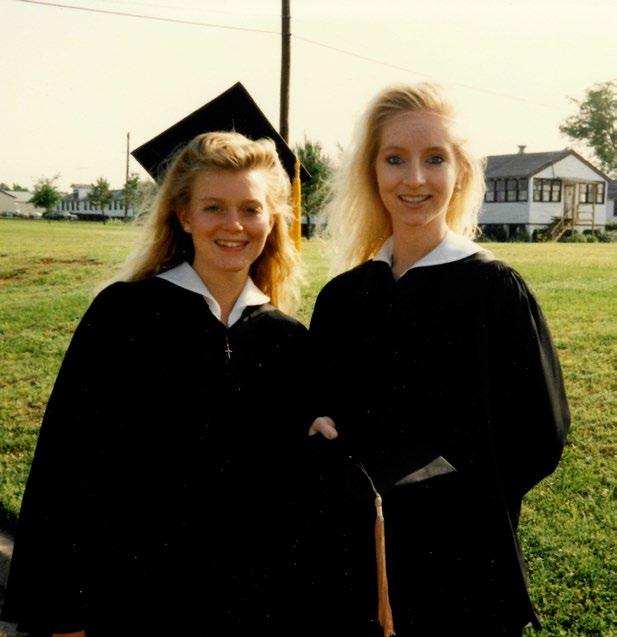
To my fellow alumni—it’s energizing and encouraging when I hear from you. God is opening my eyes and revealing His character with each interaction. I sincerely love you and am so proud of how well you represent our Savior Jesus Christ and LeTourneau University.
May we pray about how God might have us be involved to partner together and engage with our classmates. I’m eager to also challenge each of us to think of how we can pour back into our current students and back
into the university that has equipped us and given us the foundation that we have. I’d like you join me in considering a passage to use in prayer for the university.
My passage is Psalm 46—inspired by the fact that we were founded in 1946—and I’ve just been meditating on those truths: God is our refuge and strength, the Lord of hosts is with us, the God of Jacob is our fortress, and we can be still and know that He is God. He’s going to be faithful to continue the legacy that was started by Mom and Pop LeTourneau 75-plus years ago.
I Samuel 12:24 reads, “Only fear the LORD, and serve Him in truth with all your heart; for consider what great things He has done for you,” and has been my life verse since my days as a student at LETU. I am so grateful for this opportunity to get to know you better, to serve you, and most importantly to glorify God together.
Please, email me, text, or call anytime; let me know if you’d like to schedule a FaceTime or video chat!
68 LETOURNEAU NOW
AT LEFT, LARA AND TRISH ON GRADUATION DAY IN MAY 1991; RIGHT, LARA WITH HER SEW FLOORMATES, REPRESENTING THE SOUTHEAST WING OF THE WOMEN’S RESIDENCE HALL (WRH), A FOUR-BARRACK ‘H’ CONNECTED BY A LOBBY.
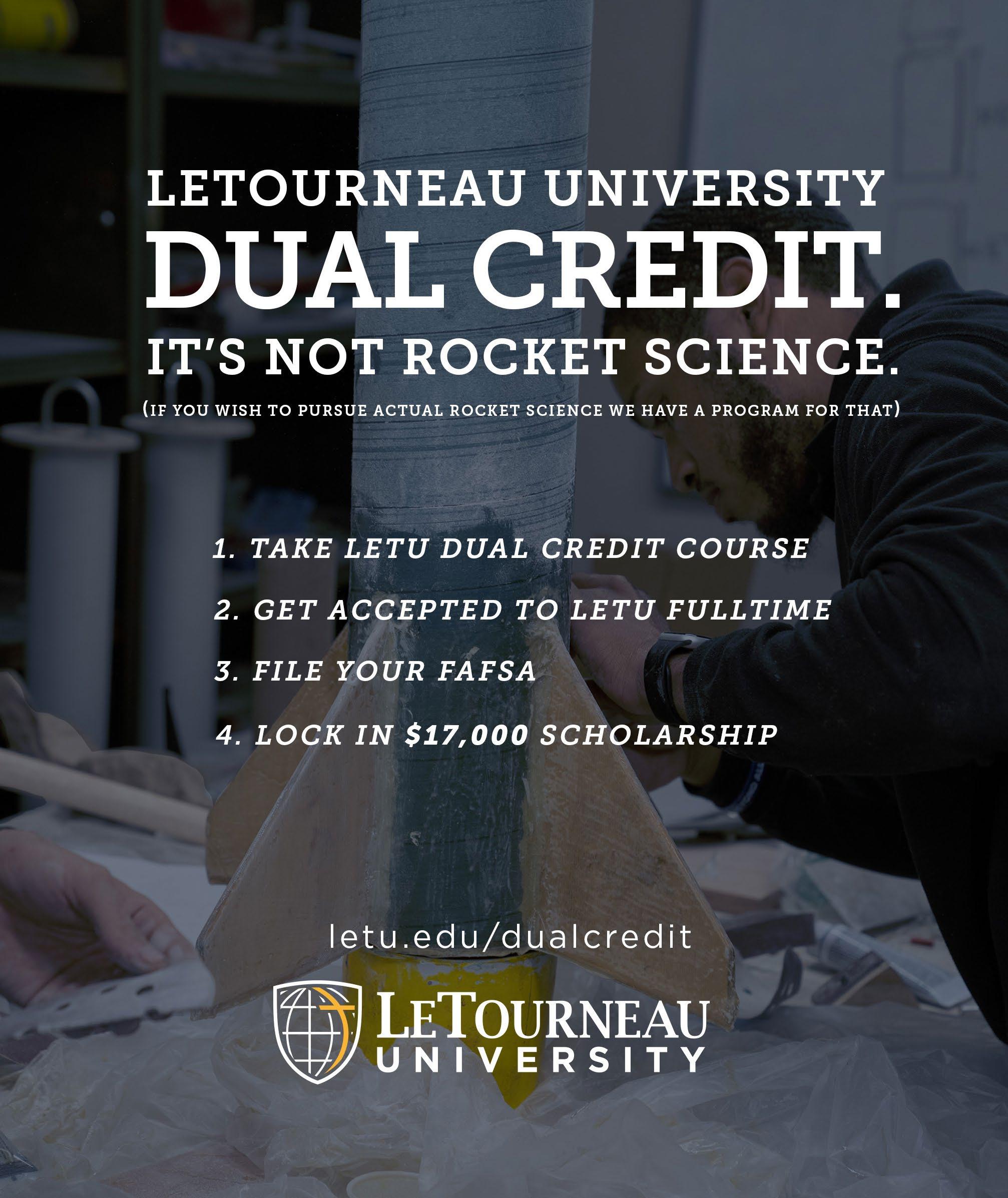
SPRING/SUMMER 2023 69
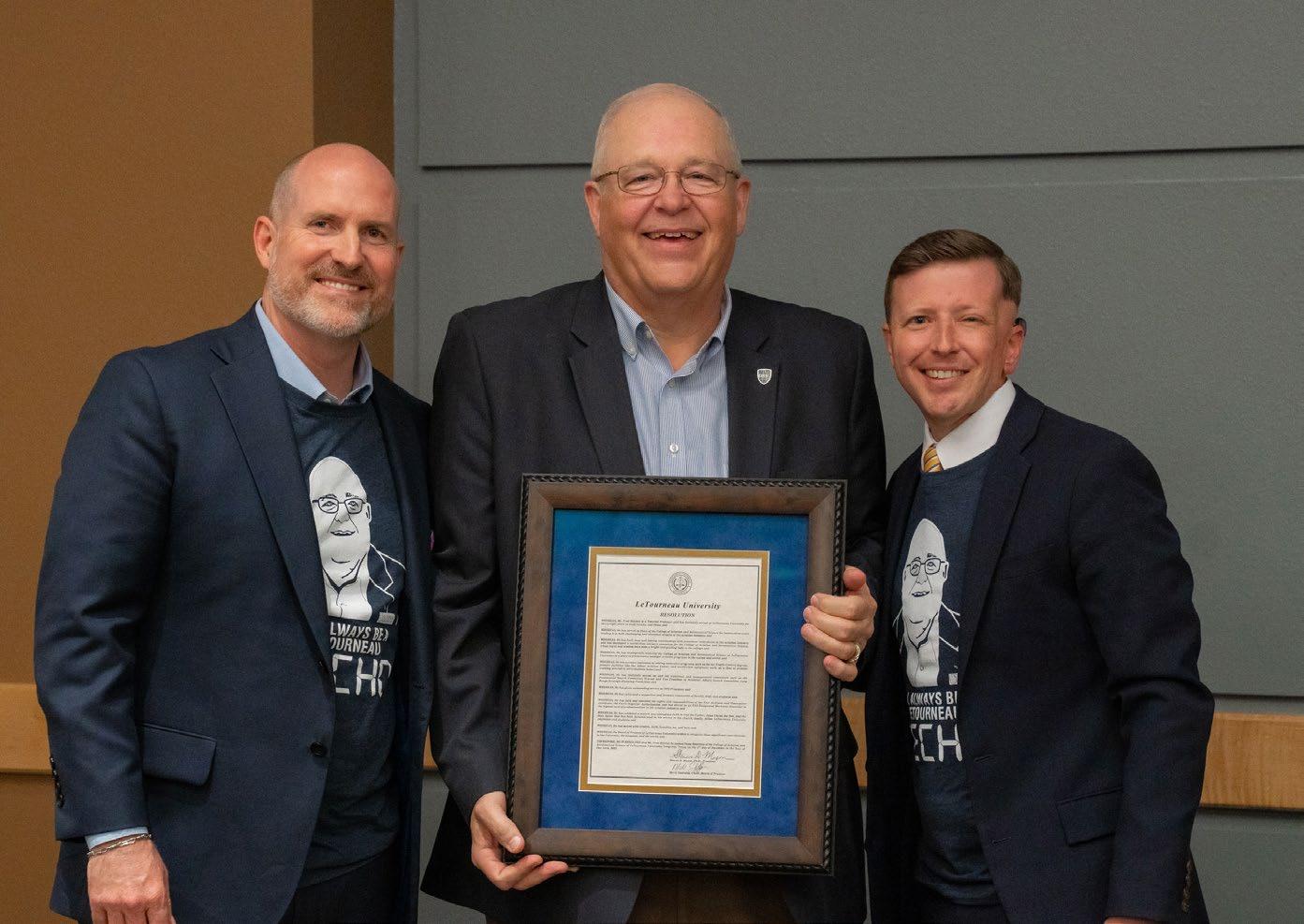


70 LETOURNEAU NOW
HONORING 38 YEARS OF AVIATION LEADERSHIP: FRED RITCHEY



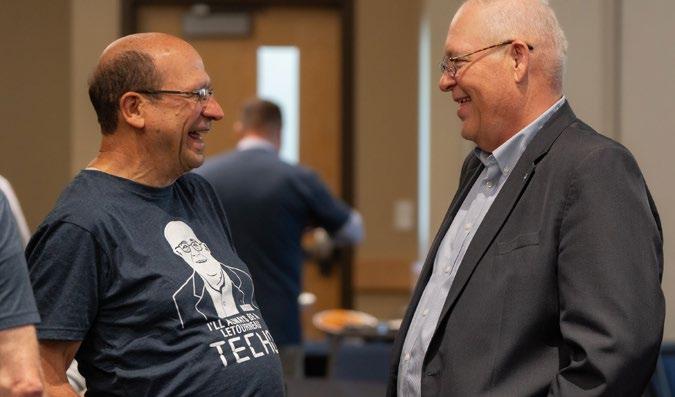

Our campus community had the pleasure of celebrating Mr. Fred Ritchey, tenured professor and inaugural Dean of the College of Aviation & Aeronautical Science, at a reception honoring his 38 years of service to the university. His retirement is a bittersweet moment for so many as his time working at LeTourneau University has impacted so very many lives. At the reception, Mr. Ritchey was officially recognized as Dean Emeritus. Also unveiled at the reception were the plans to name the Grand Lobby at the Abbott Aviation Center in his honor.
“The ways that Fred Ritchey has led this institution are unmatched. His impact on thousands of students, faculty and staff, industry partners, is manifold. But his heart for the Lord and His Kingdom has always been number one. If you know Fred well, you know the most important thing to him. It's his own relationship with—and letting others know about—Jesus Christ. R.G. LeTourneau is famous for saying something that I think is actually really fitting for Fred. He said, ‘You know, I'm just a mechanic that God has blessed.’ And I think that fits Fred so well. Besides our founder, I can tell you that there is no one—no other person—who has impacted this university like Fred Ritchey. Thank you for 38 years of leadership.”
—Steven D. Mason, Ph.D. President, LeTourneau University
SPRING/SUMMER 2023 71
Class Notes
MEMORIALS
Leta Faye Arnold (Professor) died on January 27, 2023, in Spring, Texas. Leta worked as an English professor at LeTourneau University. The impact she made on many students and our university will be forever cherished.
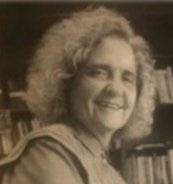
Jeanne Donner, beloved co-worker and friend of LeTourneau University, worked in the campus bookstore in the 80s and 90s. Her sweet smile greeted students in search of books and campus gear here on campus, and the impact she made on students and our university will be cherished.
Frank “Frankie” D. Galloway (Former Director of Security), beloved coworker and friend of LeTourneau University, served as Director of Security from 1992 until his retirement in 2005. The impact he had on campus will be cherished forever as he left his legacy here.
65
gardening and managing finances to exploring alternate methods of home heating.
69 Dorotha “Dottie” (McCaslin) Bailey (’69, Biblical Studies) died on February 2, 2023. Dottie was raised in Plum, Pennsylvania.
International Trade. Her memory will be cherished by many.
BIRTHS
Douglas “Doug”
Hvistendahl (’65, Mechanical Engineering) died on November 7, 2022. Doug was active in his church, local library, and pursued many projects, from
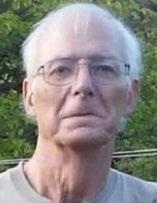
72
Richard Stackhouse (’72, Mechanical Engineering) died on December 16, 2022, surrounded by loved ones. Richard retired in 2012 and found a fond love for boating and fishing with his kids and grandkids and sitting on the front porch of his log home.
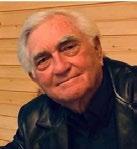
75 James Dobos (’75, Mechanical Engineering) died on February 27, 2023, in Meadville, Pennsylvania. James was a talented musician who enjoyed playing many instruments including the electric bass and violin.
92 Gregg Miller (’92, Business Administration) died on April 4, 2023, surrounded by his family. Gregg was a 32nd degree Mason and a Past Master of Dennison Lodge, Cleveland, Ohio.
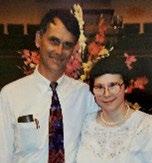
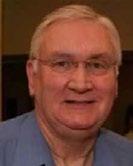

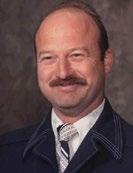
09 Dustin Haisler (’09, Business Administration) and his wife, Amanda, welcomed the birth of Maverick Tate in July 2021.

17 Nathan Gaddis (’17, Mechanical Engineering) graduated with a Master in Aerospace Engineering from Texas A&M University (May 2022) and has begun work as a Test Engineer for Blue Origin in Huntsville, Alabama. He and wife, Rachel (’18, Civil Engineering), also welcomed their first child, Josiah Daniel, in December 2022.
WEDDINGS
18 Seth Briley (’18, Business Administration) married Sarai Menjivar on October 8, 2022.
CLASS NOTES
64
Whitney Townlin (’08, MBIN) died on March 5, 2023. Whitney received her master’s from LeTourneau University in
08
John Solhiem (’64, MT) received a U.S. Patent for “golf club heads with apertures and filler materials”. The patent was filed on May 10, 2021, and fulfilled March 28, 2023. Congratulations on this accomplishment!

ALUMNI 72 LETOURNEAU NOW
69
Dale Hill (’69, Welding Engineering) and partners at Proterra Operating Co., received U.S. Patent no. 11,345,245 in May 2022. The invention of “overhead charging systems for electric vehicles” will help revolutionize the electrical and hybrid vehicle charging route.
78 Nate Saint (’78, ATBS, MT) was a part of the team in Wonderland, Switzerland, that has developed and submitted their patent application for Play Yard with Removeable Soft Goods. Congratulations on this accomplishment!
80 Mark Dingeldein (’80, Mechanical Engineering) was promoted to Vice President of Engineering for Brock Grain Systems. In his new position, Dingeldein will oversee all Brock engineering groups for storage, handling, conditioning, and structures.
86 James “Jim” Alecxih (’86, BUBS) was appointed to a newly created role of President, Device Technology Business, at TriSalus Life Sciences.

86 David Kimball (’86, Mechanical Engineering) is President at the Benchmark Group, Inc., which was honored and awarded “Best Place to Work” in Arkansas, a recognition based upon employee surveys. This awards program is designed to identify, recognize, and honor the best employers in Arkansas benefiting the state’s economy, workforce, and businesses. Located in Rogers, Arkansas, and Dallas, Texas, Benchmark Group, Inc. is an architectural & engineering firm.
92 James “Mike” Holcomb (’92, Business Management) was appointed as the Chief Operating Officer of Patterson-UTI Energy, Inc., on January 1, 2023.
93 Bob McFarland (’93, Business Management) was appointed a position on the Board of Directors at Astrotech Corporation. 22 Emily Hogenson (’22, Aviation Management) received the 2022 APS Upset Training Scholarship.
95
Matt Ruwe (’95, ATFL), a pilot and senior product manager for Bose, launched new headsets at SUN ‘n FUN. With an overwhelming response from pilots wanting comfort to be a priority when it came to new head gear, Matt and his team made it happen. Congratulations on this accomplishment!
98 Deborah “Debbie” Smith (’98, Business Management) joined the world of higher education as the Clinical Assistant Professor at the University of Houston College of Nursing!
01
Ken Bradley (’01, Business Administration) joined the Veseris team as the new CEO. Now being in the same field as his father, it was a heartfelt decision.
01
Gregory Manfredi (’01, MBA) joined TriMas as General Manager to lead Norris Cylinder.
02
Carole Langley (’02, Business Management) was named the new Principal for Stephens Elementary School in Katy ISD.
08
Rhonda Harrison Turner (’08, MBA) has decided after 10 years as superintendent of Quitman ISD, and over three decades in public education, that she is ready to move into retirement.
08
Chuck Foucheaux (’08, Business Administration) has been promoted to Vice President of Industrial Sales at JD Martin.
08
Chad Dirkse (’08, MBA) was named Annapolis Christian School’s next Head of School, starting July 1, 2023. Chad currently serves as Head of School at Chattanooga Christian School in Chattanooga, Tennessee.
08
Betsie Hoyt (’08, MBA) was selected to round out the leadership team for RedTeam Software, a leader in construction management software, as it enhances its products and builds market share.
15 Jeffery Thompson (’15, Business Administration) started a new job at the Clark Seals Company. Thompson joined the company as a territory sales manager, overseeing operations in Texas, Oklahoma, Arkansas, Louisiana, Mississippi, and Alabama. Prior to joining Clark Seals, Thompson served as industrial manager at Parker Hannifin Rotary Seal Division, where he successfully expanded sales and strengthened customer relationships.
22 Emily Hogenson (’22, Aviation Management) received the 2022 APS Upset Training Scholarship.
The loss of a loved one, friend or colleague often inspires us to ensure that their memory lives on. Many people find that supporting LETU is an ideal way to honor someone who has passed away. Gifts made "in memoriam" offer lasting honor to a loved one while providing family and friends with the satisfaction of knowing they have helped others. If you would like to give a memoriam to LETU, please call 1-800-259-5388 or donate online at www.letu/give. The family will be notified of your generosity when a memoriam is made.
SPRING/SUMMER 2023 73
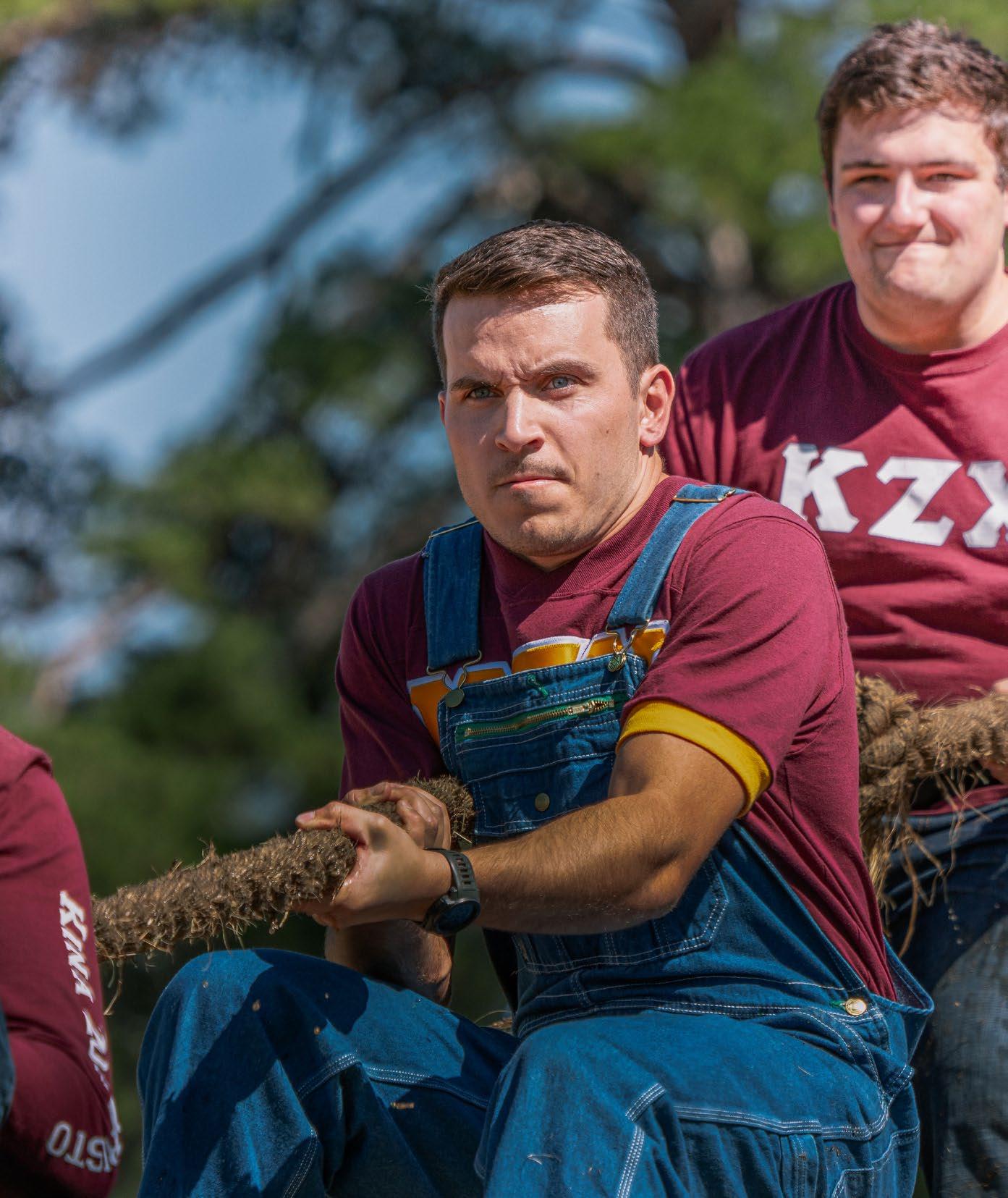
October 5-7, 2023 SAVE THE DATE FOR MORE INFO & 74 LETOURNEAU NOW
Homecoming FamilyWEEKEND
A Look Back
The fall of 1961 marked LeTourneau Technical Institute’s official transition to LeTourneau College and its first semester as a coeducational school. The first female students arrived on campus to a ratio of approximately 100 male students to one female student. They may have been outnumbered, but nothing outmatched the hallmarks of a LeTourneau education.
Two of these students were Susan (Till) Carvella and Ellen (Bancroft) Page. Both graduated in 1965 with degrees in education and had female peers who majored in chemistry, mission technology, Bible, and industrial engineering. Both of these graduates have been on campus recently, and their conversations make it clear. Some of their most vivid memories of their time on campus highlight the realities of life at The Christian Polytechnic University today— encouraging faculty members, a sense of family, hard work alongside grin-inducing tales of good-hearted fun, and a recognition of the unique balance of faith-informed, practical learning in an environment where practical doing builds confidence, spiritual growth, meaningful relationships, and careers.
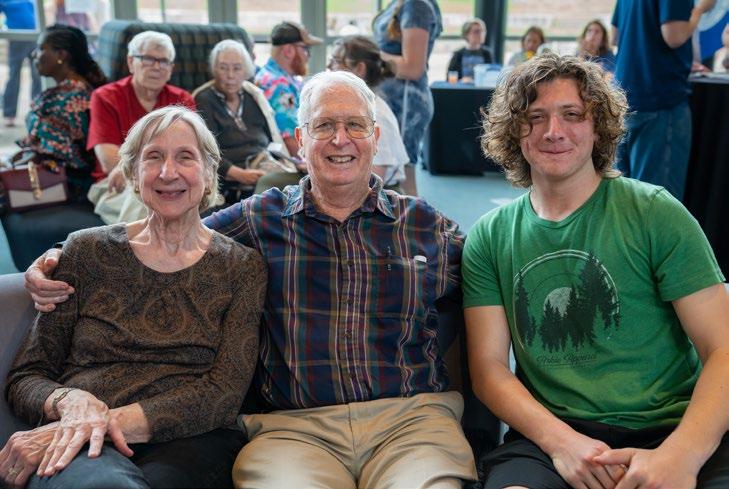
Carvella said, “We all knew it was a technical school, and we grew up in an environment where most girls were expected to grow up to be secretaries or housewives. To attend a college that was open enough to accept girls in those other majors—that was very forward thinking, and it says a lot about LeTourneau.”

This handful of women went on to become career professionals, world travelers, and more. Their impact on LeTourneau College and every female student who has come after them—to study engineering, fly planes as missionary pilots, learn to teach, and enjoy life to the fullest—will forever be a part of the LeTourneau legacy of adventurous achievement.
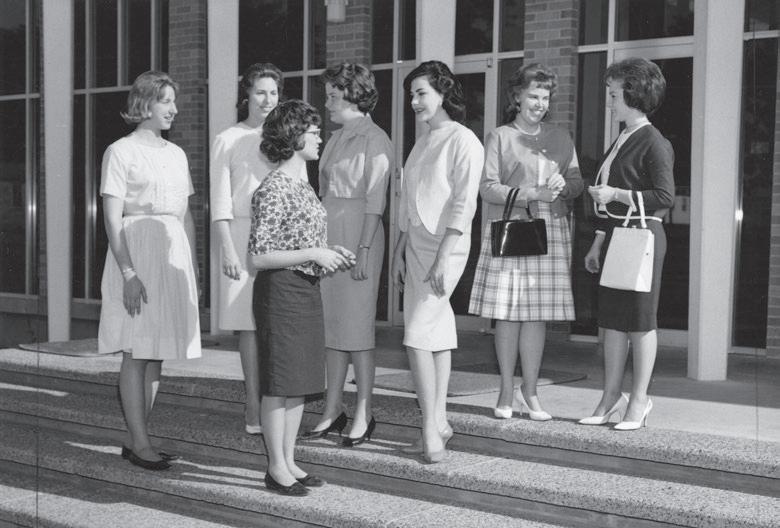
Scan here to read the full story of the first female students from the NOW archives.
 ELLEN (BANCROFT) PAGE AND HUSBAND, MARTIN, VISIT CAMPUS TO CELEBRATE THE GRADUATION OF THEIR GRANDSON, EVAN PAGE ('23, ME).
FIRST WOMEN TO GRADUATE AS PICTURED IN THE NOW, VOL. 19, NO. 6, JUNE 1965
L TO R: ELLEN BANCROFT, JOHNSON CITY, NEW YORK; JOAN BAUER, FERNDALE, MICHIGAN; JACQUIE RICKEY, CLEARWATER, FLORIDA; ARDELLA KEMMLER, ALTOONA, PENNSYLVANIA; JUDY DRURY, LONGVIEW, TEXAS; SUSAN TILL, LAKEWOOD, NEW YORK; PATRICIA MCCLELLAND, LONGVIEW, TEXAS.
ELLEN (BANCROFT) PAGE AND HUSBAND, MARTIN, VISIT CAMPUS TO CELEBRATE THE GRADUATION OF THEIR GRANDSON, EVAN PAGE ('23, ME).
FIRST WOMEN TO GRADUATE AS PICTURED IN THE NOW, VOL. 19, NO. 6, JUNE 1965
L TO R: ELLEN BANCROFT, JOHNSON CITY, NEW YORK; JOAN BAUER, FERNDALE, MICHIGAN; JACQUIE RICKEY, CLEARWATER, FLORIDA; ARDELLA KEMMLER, ALTOONA, PENNSYLVANIA; JUDY DRURY, LONGVIEW, TEXAS; SUSAN TILL, LAKEWOOD, NEW YORK; PATRICIA MCCLELLAND, LONGVIEW, TEXAS.
SPRING/SUMMER 2023 75
LeTourneau NOW
P.O. Box 8001
Longview, TX 75607
OPENING FALL 2023 - NEW NURSING BUILDING

One of our existing campus structures is being transformed into the all-new nursing building, ready for the start of fall courses. This new space will powerfully contribute to the meaningful processes and relationships that encompass our holistic nursing preparation: ease of access to faculty offices, larger classroom space to accommodate a growing nursing program, and a “simulation hospital” equipped with faculty observation rooms to fully imitate the environment of professional nursing. With a grand opening coming up in August, this new space will be a blessing to those who are becoming equipped to bless many, many others. For updates about the building process and information about the grand opening, scan the QR code below.
letu.edu/LeTourneauBuilt
the CHRISTIAN POLYTECHNIC UNIVERSITY





















 Steven D. Mason, Ph.D. PRESIDENT, LETOURNEAU UNIVERSITY
Steven D. Mason, Ph.D. PRESIDENT, LETOURNEAU UNIVERSITY
 PHOTOGRAPHY BY SARA BRYAN
PHOTOGRAPHY BY SARA BRYAN


























 BY GRANT BRIDGMAN
BY GRANT BRIDGMAN




 PHOTOGRAPHY BY SARA BRYAN & GRANT BRIDGMAN
PHOTOGRAPHY BY SARA BRYAN & GRANT BRIDGMAN

















































 Caldwell, Ph.D., Provost and Vice President for Academic Affairs
Caldwell, Ph.D., Provost and Vice President for Academic Affairs



























































 ELLEN (BANCROFT) PAGE AND HUSBAND, MARTIN, VISIT CAMPUS TO CELEBRATE THE GRADUATION OF THEIR GRANDSON, EVAN PAGE ('23, ME).
FIRST WOMEN TO GRADUATE AS PICTURED IN THE NOW, VOL. 19, NO. 6, JUNE 1965
L TO R: ELLEN BANCROFT, JOHNSON CITY, NEW YORK; JOAN BAUER, FERNDALE, MICHIGAN; JACQUIE RICKEY, CLEARWATER, FLORIDA; ARDELLA KEMMLER, ALTOONA, PENNSYLVANIA; JUDY DRURY, LONGVIEW, TEXAS; SUSAN TILL, LAKEWOOD, NEW YORK; PATRICIA MCCLELLAND, LONGVIEW, TEXAS.
ELLEN (BANCROFT) PAGE AND HUSBAND, MARTIN, VISIT CAMPUS TO CELEBRATE THE GRADUATION OF THEIR GRANDSON, EVAN PAGE ('23, ME).
FIRST WOMEN TO GRADUATE AS PICTURED IN THE NOW, VOL. 19, NO. 6, JUNE 1965
L TO R: ELLEN BANCROFT, JOHNSON CITY, NEW YORK; JOAN BAUER, FERNDALE, MICHIGAN; JACQUIE RICKEY, CLEARWATER, FLORIDA; ARDELLA KEMMLER, ALTOONA, PENNSYLVANIA; JUDY DRURY, LONGVIEW, TEXAS; SUSAN TILL, LAKEWOOD, NEW YORK; PATRICIA MCCLELLAND, LONGVIEW, TEXAS.
